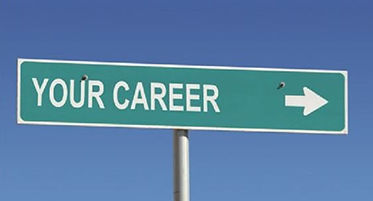 |
|---|
THE ARCHIVES
Archived Issues:
Leap Over Dissertation Hurdles with WOOP Power | 243
Summary: Stuck on your dissertation journey? Surmount your inner and outer obstacles with a new proven goal strategy.
Estimated time: 6 minutes (that will save you untold anguished hours)

By Diane Dreher, Ph.D., C.M.C., A.C.C.
For years, you've dreamed of getting your doctorate.
Now you've begun your dissertation, visualized success, and set your goals, but something keeps getting in the way.
Despite all you've heard about the power of visualization, visualizing alone is not enough. In fact, it may even be sabotaging you.
How? In over twenty years of motivation research, Gabriele Oettingen, Ph.D., New York University social psychologist, has found that visualizing our goals actually saps our energy. It fools our brains into believing we've already achieved the success we seek, making us feel happy and more relaxed.
So what's wrong with that? To keep moving forward to achieve our goals, we need to be energized, not relaxed. Positive visualization does just the opposite. In fact, in one experiment, Oettingen and her colleagues found that women who visualized reaching their goals for only six minutes experienced a significant drop in energy.
WOOP Your Dissertation
So what can we do? Oettingen has developed a powerful strategy with the acronym WOOP to help us achieve our personal and professional goals. WOOP, which stands for Wish-Outcome-Obstacle-Plan, combines visualization with the proven techniques of mental contrasting and "if-then" planning.
Using the WOOP strategy focuses our attention and increases our energy, building motivation and positive momentum by asking us to visualize our goal, then discover an inner obstacle and develop an action plan to overcome it.
For fun, Dr. Oettingen illustrated her concept in these photos:

The Proven WOOP Strategy Explained
Here's how you can use WOOP to finish your dissertation:
1. W/Wish
In WOOP, the 'W' is a wish in your personal or professional life. Your current wish is to finish your dissertation.
2. O/Outcome
Now think of the first 'O' in WOOP—the outcome, how you'll see yourself when you've finished. What will getting your doctoral degree mean to you? Let your emotions and imagination take you there. Take a deep breath and really feel yourself there as vividly as possible. You may close your eyes if you like.
3. O/Obstacle
When you are ready, focus on the second 'O' in WOOP: the obstacle—going beyond any external obstacle to something internal. What inside of you is really holding you back? Search deep within yourself.
This obstacle could be a behavior, a belief about yourself, an emotion, or a habit. Be honest with yourself. The obstacle might be something you've been trying to hide, perhaps an old pattern from childhood, a feeling of being "less than," a tendency to feel like a victim, a habit of reaching for distractions whenever you feel anxious, a fear of failure or a fear of speaking up to affirm your own needs. Take a deep breath and really tune in to this inner obstacle. What is it and what feelings do you experience?
4. P/Plan
Then move on to the 'P' in WOOP, your plan to overcome the obstacle. First think of an action you can take or a thought you can tell yourself. Then make an if-then plan: if [the obstacle] occurs, then I will [take my chosen action].
Some examples:
-
If your obstacle is feeling inferior, then think of a past success and tell yourself, "I CAN do this."
-
If your obstacle is feeling too tired to work on the dissertation, then do something to energize yourself—take a stretch break, get up and walk around, or get yourself a cup of coffee.
-
If your obstacle is getting distracted by phone calls or text messages when you're working on the dissertation, then let the calls go to voice mail, or turn off the phone.
-
If your obstacle is checking your email when you're working, then tell yourself you'll check it after you finish your dissertation work for the day.
Build in "If-Then" Plans
Now it's your turn. Think of an if-then plan that connects your own inner obstacle with your chosen action.
Using WOOP is more effective than relying on willpower alone. According to Dr. Oettingen, WOOP sets up an automatic "nonconscious" reaction to move us toward our goals.
Try using WOOP each morning to get focused as you begin your day:
-
First identify the 'W,' your wish, the portion of the dissertation work you wish to accomplish that day—from reading a certain number of articles for the literature review to drafting a section of the dissertation.
-
Next visualize the 'O,' the outcome—how you'll feel when you accomplish this.
-
Then think of an 'O,' an internal obstacle that could block your progress.
-
Finally, come up with a 'P,' an action plan to overcome the obstacle, putting it into an if-then statement.
You can even download a free smartphone app to take you through these four steps at www.woopmylife.org.
Using WOOP on a regular basis can keep you more motivated to move forward. You'll feel more focused and energized, developing the powerful momentum you need to finish your dissertation.
Recommended Resources
Oettingen, Gabrielle. Rethinking Positive Thinking: Inside the New Science of Motivation.
Ben Dean interview with Gabrielle Oettingen, including additional resources:
http://www.mentorcoach.com/positive-psychology-coaching/interviews/interview-gabriele-oettingen-phd/
WOOP My Life. An engaging three-minute video to get you WOOPing your life can be found at http://woopmylife.org/. For the android or iPhone app, go to http://woopmylife.org/app/

Diane Dreher, Ph.D., C.M.C., A.C.C.
A best-selling author, coach, educator, and keynote speaker, Diane has a doctorate in English from UCLA. Her books include The Tao of Inner Peace, The Tao of Personal Leadership, and Your Personal Renaissance. Using powerful strategies from positive psychology, Diane's coaching helps people discover their strengths, overcome roadblocks, and create the life they've been waiting for. Contact her at www.northstarpersonalcoaching.com.
8 Minutes or Less to Dissertation Mindfulness | Issue 242
Summary: Power up your dissertation with mindfulness and self-compassion.
A six-minute read to get your dissertation out the door faster—and even change your life.

By Ilene Berns-Zare, PsyD, CMC, ACC
Some days do you have less focus than you would like?
Do you find yourself dilly-dallying, just trying to wake up enough to work smart?
Then it's time to put mindfulness meditation in the top drawer of your dissertation success toolbox.
What exactly is mindfulness?
Jon Kabat-Zinn, who is credited with popularizing the concept in the West, offers this definition: "Mindfulness means paying attention in a particular way: on purpose, in the present moment, and nonjudgmentally." In essence, you are off auto-pilot and are fully awake in the present moment.
Its effects can be huge. Mindfulness powers up self-awareness, calm, productivity, and focus, as evidenced in numerous research studies.
These powerful benefits have fostered its broad acceptance across academia and workplaces—from Google to the U.S. Army. Meditation curricula now show up in numerous organizational toolboxes, observe experts Goleman and Davidson.
You can harness this power to finish your degree—and it does not take hours of sitting on a cushion.
These potent effects require much less time than most people imagine—as little as eight minutes, observe Daniel Goleman, Ph.D., and Richard Davidson, Ph.D. in Altered Traits.
Busy-ness Does Not Equal Productivity
The world of a typical ABD is loaded with distractions. Sometimes you get to what's important. . . and sometimes you don't.
How often have you found yourself mindlessly doing whatever comes up, i.e., checking things off your To Do list, keeping busy, yet at day's end accomplishing nothing on your dissertation?
It's easy to fall into this trap. Without creating "breathing space" amid persistent demands of graduate work, you can end up drifting--or overwhelmed precisely when you most need to feel present, balanced, and competent.
Mindfulness offers you the best cure available. And it's free.
"Meditation is the ultimate mobile device you can use it anywhere, anytime, unobtrusively." ~ Sharon Salzberg
The Fitness Plan for Your Mind
You know that physical exercise keeps your body strong and fit. Now consider mindfulness meditation as fitness training for your mind. Instead of getting caught in rumination or distraction, you will be able to pay attention to what is happening right now and then make the most effective choices.
As Goleman and Davidson put it, "Mindfulness lets us observe what's happening in the mind itself rather than simply be carried away by it."
Practicing mindfulness regularly will change your brain in ways that lead you to be at your best more often.
Researchers found that subjects who participated in the renowned Mindfulness-Based Stress Reduction program (thus practicing mindfulness 30 minutes per day for eight weeks) showed remarkable changes in areas of the brain related to positive emotions and energy, report Goleman and Davidson.
"The thing about meditation is: You become more and more you." ~ David Lynch
Become Your Own Best Friend
Mindfulness is a key to self-compassion. Being able to observe self-critical thoughts instead of being controlled by them is the first step towards become kinder to yourself. As mindfulness experts Mark Williams and Danny Penman explain:
You come to realize that thoughts come and go of their own accord; that you are not your thoughts ... Mindfulness is about observation without criticism; being compassionate with yourself.
In short, you don't have to believe everything you think.
You can notice yet not accept the slings and arrows hurled by your inner critic. You can become aware of your thoughts instead of avoiding them or exaggerating them.
Failure is part of being human, and it's a common experience on the dissertation journey. Self-compassion skills let you treat yourself with care and kindness in challenging situations that emerge while researching and writing a dissertation.
Fortunately, self-compassion skills can be learned, and mindfulness proves crucial in this endeavor. [Editor's note: Researcher Kristen Neff, Ph.D., offers several mindfulness meditations specially targeted at enhancing self-compassion at her site.]
Your Easy Entry into Mindfulness
Mindfulness, as with any skill, develops with practice, and meditation is the proven route. It's easy to experiment with two of the most popular Westernized forms of Buddhist meditation, insight meditation ( vipassana) and lovingkindness meditation (metta).
Follow the simple instructions below and find more information and options in the recommended resources. Want guided meditations? Download one of the smart phone apps which offer them for all levels of practice.
Not enough time in your day? Meditation be practiced for just moments or for much longer. You might start with a few minutes per day and then lengthen your practice for deeper benefits. The proof will be in your growing experience of calm, focus, and happiness, i.e., of mindfulness in daily activities.
"You should sit in meditation twenty minutes every day unless you're too busy. Then you should sit for an hour."
~ Zen adage
Insight Meditation: Follow the Breath
Insight meditation involves continued close attention to sensations. This simple and direct practice of moment-to-moment mindfulness lets us experience directly the ever-changing flow of the mind/body process. Here are the fundamental steps:
Pause to take a slow, deep breath--and notice that you are breathing, perhaps silently saying "breathing in" and "breathing out" as you inhale and exhale. There's no need to change your breathing, just notice it.
Breath awareness can be practiced for one inhale and exhale—or repeated for a longer period. When the mind wanders (which it always does), gently bring it back to the breath. Mindwandering does not signal your lack of aptitude. Instead it serves the perfect opportunity to strengthen your attention by refocusing.
This simple approach can be used to gain focus at important moments, e.g., as you prepare to write, before an interview or phone call, during a meeting, or when feeling upset or worried. You might try it upon waking up in the morning instead of grabbing your phone.
As you train your attention, you will experience greater and more lasting equanimity, wisdom, and compassion.
Open up with Lovingkindness
While insight meditation focuses on attention, lovingkindness meditation invites you to open your heart. Despite the differing foci, they both facilitate mindfulness, compassion, equanimity, and wisdom.
In her various books (see below), renowned meditation teacher Sharon Salzberg introduces many core practices, including lovingkindness. Those who find it challenging to concentrate on the breath often find lovingkindness meditation an easier place to start.
In LKM, you repeat simple phrases offering goodwill and compassion—first to yourself and then to others. These simple but powerful phrases may be repeated silently, sitting or lying down with eyes closed or open: "May I be safe. May I be happy. May I be healthy. May I live with ease."
As you feel ready, extend them to specific others or even all human beings everywhere. Notice the sense of calm and contentment grow as you practice this.
Imagine how enhanced mindfulness, self-awareness, and calm could propel you to the dissertation finish line. You don't have to be a yogi to benefit from these practices. Just like learning to ride a bike, mindfulness is a learnable skill and one that you can access in any moment.
The moment is NOW.
MINDFULNESS RESOURCES
Apps for meditation and mindfulness: Insight Timer, Headspace, Calm, and others.
Berns-Zare, Ilene. (a) Mindfulness, Balance, and Confessions of a Life-Work Coach and (b)Mindfulness, Self-Awareness, and
Calm--Powerful Tools for the Effective Leader's Toolbox
Goleman, Daniel & Davidson, Richard J. Altered Traits: Science Reveals How Meditation Changes Your Mind, Brain, and Body
Kabat-Zinn, Jon. Mindfulness with Jon Kabat-Zinn: Kabat-Zinn Leads a Session on Mindfulness at Google and (b) Meditation Is Not What You Think and Why It Is So Important
Salzberg, Sharon. Lovingkindness : The Revolutionary Art of Happiness , (b) Real Happiness: The Power of Meditation, and (c) Real Happiness at Work: Meditations for Accomplishment, Achievement and Peace
Williams, Mark. & Penman, Danny. Mindfulness: An Eight-Week Plan for Finding Peace in a Frantic World

Ilene Berns-Zare, PsyD, MS, ACC, CMC is a life and leadership coach, psychologist, and educator. Ilene is committed to empowerment through learning, personal/professional development, and integrative well-being. She sees coaching, training, and writing as offering a lens through which people can gain fresh perspectives, ask important professional and personal questions, and access strengths, skills, and possibilities. Email Ilene at ibzlifecoaching@gmail.com and read more at http://ileneberns-zare.com
Four Surprising Ways to Rev Up Your Dissertation with Summer Fun | Issue 241
Summary: Stop depriving yourself of summer fun. Learn to leverage vacations to do your best work and create a balanced life now.
Estimated reading time: 6 minutes

By Gayle Scroggs, Ph.D., P.C.C.
Summer is nearly half over. Do you find yourself torn between the dissertation imperative and your vacation impulses?
Forget the dilemma. The truth is that you need them both. It is not just okay but essential to take time away from academic pursuits to enjoy family, friends, and fun. It will enhance your overall focus and productivity.
Some doctoral students assume that the only way to finish is to keep the nose to the grindstone. But driving yourself relentlessly turns out to be a poor long-term strategy for your success and well-being, as twenty years of positive psychology research has shown.
"More men are killed by overwork than the importance of the world justifies."
~ Rudyard Kipling
Positive emotions fuel creativity and productivity
Positive emotions—including play—function as our "tiny engines of flourishing," asserts UNC's renowned researcher Barbara Fredrickson, Ph.D. When you have a high ratio of positive to negative experiences, you reap several important benefits: enhanced energy and creativity, better relationships, a deeper sense of gratitude and meaning, and even better sleep. In short, positivity will get you in shape for whipping out those pages.
To stoke your positivity, we offer four science-based tips to maximize your recharge. With a bit of strategic planning, summer pleasures won't derail you. Instead they will propel you toward your academic goals and a desirable future.
"Happiness is not just a mood—it's a work ethic."
~ Shawn Achor, Ph.D.
1. Expect a "realistic" not "best case" summer.
Chances are you don't really have "the rest of the summer" to devote strictly to writing. A realistic plan must include not only your dissertation priorities and other work, but also your summertime run. Yes, that means you need to dedicate time to vacations, visitors, outings, festivals, etc.
To make your best plan, begin by crossing off your calendar the days you know no writing will happen. Don't kid yourself that you will leave the wedding reception early or that you will take your laptop to the family reunion or Paris. Do you also need to block off job or other commitments? Now you must hold any remaining days for your dissertation. But that's not the end of it.
Beware the "planning fallacy." Nearly everyone assumes best-case scenarios while preparing schedules and budgets. As Nobel laureate Daniel Kahneman, Ph.D., explained, humans tend to imagine an unrealistic future (in which no one gets sick, nothing breaks down or gets lost, no crises occur) rather than relying on actual experiences in an imperfect world. The wise alternative is to plan realistic (or even worst-case) scenarios by doubling or tripling the time you originally estimated for your writing goals.
Honesty now will save you grief later. Have you really blocked off enough dissertation time for your stated goals? Or do you need to graciously back out of some events? What should you delete, delegate, defer, or minimize to stay true to yourself and finish your doctorate? Rework your calendar.
"You have to decide what your highest priorities are and have the courage—pleasantly, smilingly, nonapologetically—to say 'no' to other things. And the way to do that is by having a bigger 'yes' burning inside."
~ Stephen Covey, Ph.D.
2. Create your weekly work and play agenda.
Waiting for your muse in the morning to prompt you to start writing? Give it up. Evidence proves you are more than twice as likely to get going if you have a set start time. Return to your calendar and start blocking out specific time-based modules for your dissertation work.
You will also save precious willpower energy by avoiding daily decisions about when to work. So calendarize your start times and honor them. Also schedule the down times—and honor them too. Otherwise Labor Day will find you feeling guilty about your lack of dissertation progress or regretful for missing the joys of warm weather.
To optimize your schedule, use your prime brain time—often the morning hours—for your biggest dissertation challenges. Schedule other activities, including chores and play for "brain-dead" hours. As you plan each week, reflect on what worked well and tweak accordingly. You are the master of your time. As you take control, notice how your inner critic and inner child both pester you less.
Mantras can work magic. If you balk at your work starting time, try repeating this: "It just takes twenty seconds of courage." That's all you need get yourself to sit at your desk, open your laptop, and start typing. Still balky? Remember how you have forced yourself to jump in a pool or wade into ocean waves despite the numbing cold water? And how you were happily splashing around in a couple minutes? Yes, you are tough enough to withstand a couple minutes of discomfort for what matters—and that includes your dream of attaining that doctorate. Keep splashing around on the keyboard until you've warmed up. Avoiding discomfort gets you nowhere.
"All progress takes place outside the comfort zone."
~ Michael John Bobak
3. Stay present: Play during play time; work during work time.
Allow yourself to stay fully present when playing and socializing allows you to extract the maximum benefit from your recharge time. Let go of guilt feelings knowing you'll return in better shape.
Similarly, during dissertation time, remind your antsy inner child that recess is coming and suggest she take a nap or watch videos. Then you will be free to re-focus on your work for greater progress.
In the end, life is all about harmonizing and integrating your priorities. This stage in your life can be an ideal time for experimenting with shifting gears more gracefully, effectively. Consider this a necessary life skill that gets better with practice—and think "yin-yang," not tug-o-war. You will thank yourself in years to come as you create a full life without regret about neglecting either work or play.
"Every man who possibly can should force himself to a holiday of a full month in a year,
whether he feels like taking it or not."
~ William James
4. Accentuate the plusses, minimize the minuses.
Fretting and ruminating turn out to be especially harmful, leading into downward spirals of negativity.
We become what we think, research shows. Emotions, both negative and positive tend to be quite fleeting—unless we intentionally prolong them. Learn to pivot from negativity quickly by distracting yourself with whatever works for you—a brisk walk, a song, a brief meditation, etc. Consider choosing a personal mantra that puts things in perspective, e.g., "This too shall pass," or "Let go or be dragged."
Whereas ruminating prolongs negative experiences, savoring extends and deepens positive moments. Practicing savoring rewires your brain for lasting calm and resilience. Neuropsychology expert Rick Hanson, Ph.D., explains how to do it effectively:
For survival purposes, the brain is good at learning from the bad, but bad at learning from the good. help it by enriching an experience through making it last 10 to 20 seconds or longer, fill your body and mind, and become more intense. Also absorb it by intending and sensing that it is sinking into you as you sink into it. Do this half a dozen times a day, maybe half a minute at a time. It's less than five minutes a day.
Have you noticed how anticipating a movie with friends or glancing at vacation souvenirs can elicit a rush of happy, productive energy? You can triple your positive experiences and consequent energy by (a) training yourself to anticipate moments of pleasure, (b) immersing yourself in them, and (c) reminiscing about them afterward. "As you create new habits of thought, you literally rewire your brain," says Fredrickson.
Now head for summer fun!
Take time guilt-free for your favorite places, pastimes, and people. Loll in a hammock with a novel. Bike over hill and dale with friends. Hit the tennis courts or beach. As you soak up the sensations and as you connect with others, remind yourself that these moments of pleasure are necessary for flourishing during any season.
Then get back to your dissertation full speed ahead, with renewed commitment, contentment, and creativity. You'll reach the doctorate goal post with more joy and less angst, with your new work-life balancing habit stronger than before.
FOR SUMMER HAMMOCK READING
Enjoy these top-notch books that will boost your fun and success.
-
Positivity: Top-Notch Research Reveals the Upward Spiral that Will Change Your Life Fredrickson, Barbara.
-
Just One Thing: Developing a Buddha Brain One Simple Practice at a Time Hanson, Rick.
-
Thinking, Fast and Slow Kahneman, Daniel.
-
Zirkel, Annie. Pocket Full of Mantras
Photo Credit: Above Photo by Unknown Author is licensed under CC BY
8 Bad Habits Holding You Back from Finishing Your Dissertation | Issue 240
Summary: Conquer your bad habits that stop you from finishing your doctoral dissertation now
Estimated reading time: 6 minutes

By Gayle Scroggs, Ph.D., P.C.C.
Making scant or slow progress on your dissertation?
Chances are high that your typical routine is tripping you up. Review these eight bad habits to identify your counterproductive practices.
Then turn things around using our expert tips and you'll get that thesis to your dissertation chair in no time.
1. Waiting for your muse or the right mood.
"Don't wait for the muse," advises Stephen King, one of the most prolific of contemporary writers. "Your job is to make sure the muse knows where you're going to be every day from nine 'til noon. or seven 'til three. If he does know, I assure you that sooner or later he'll start showing up."
Procrastination researcher Tim Pychyl, Ph.D warns not to give in to feeling good by putting your work off; stick to your plan (and plan time off). Don't fall into the trap of rewarding your inner monkey for leading you astray or it will never stop pestering you.
2. Failing to calendarize and then prioritize your dissertation time.
Your dissertation should show up on your daily agenda (see #1 above). Big blank spaces on your calendar (where you think you might write) trick you and others into thinking you have ample free time. Honor your academic goal as you would any obligation by blocking off time for it every day. Perhaps enter it as "Dr. Me" time or some other motivating term.
Now protect that time by fitting less important tasks around your success-generating schedule, including meetings (except with your advisor). Bonus: Simply having a specific start time each day makes it twice as likely that you will get going—and once you get started, you are more likely to hang in there.
3. Editing while writing.
Writing and editing are two completely different thinking modes; one is creative, the other critical. As successful authors attest, the writing muse gets shy when the judge shows up. Furthermore, switching back and forth keeps you from building writing momentum. You would not keep hitting the brakes while trying to accelerate, would you?
Those eager to develop a habit of writing fast and frequently should check out www.750words.comfor a gamified approach to overcoming premature editing tendencies.
4. Saying "yes" to activities that do not contribute to your long-term goals.
As Steve Jobs observed, "It's only by saying 'no' that you can concentrate on the things that are really important." Before you accede to an impulse or to someone else's request, ask yourself how you'll feel a year from now when your status remains ABD because you've been busy helping other people complete their agendas.
How can you handle requests gracefully? Try these options: Say you are honored to be asked but too booked to give it your best; then refer the requester to someone else. Ask them to send you a detailed email so you can give it due consideration. Or indicate that it is not your area of expertise and refer them on. Offer sympathy for their predicament, smile sympathetically, and move on. Practice these responses until you lose your reputation as a doormat.
Finally, forestall even short interruptions by help seekers (e.g., "Can I just ask you a quick question?") by making yourself unavailable—either with a closed door or by working from somewhere they won't bother you.
5. Forgetting to take time for fun and friends.
No one is advocating all work and no play. Your "down time" can be critical in maintaining the needed zest for persevering in your dissertation marathon. Spend it creating positive experiences, e.g., doing something fun, spending time with friends, enjoying a hobby. Savor them in moderation without guilt since research shows positivity fuels performance. The happy ABD is a productive ABD!
6. Shorting yourself on sleep.
Inadequate sleep dumbs you down and shortens your life. Limiting yourself to a mere six hours of sleep per night for two weeks reduces academic performance as much as going without sleep for 48 hours. In the short run, sleep deprivation raises your craving for junk food while reducing your sex drive. In the long term, it increases your risk of obesity, diabetes, memory loss, heart damage, and mortality.
Enhance your performance, relationships, and longevity by getting at least six and a half hours of Zzz's every night. Find your own sleep sweet spot by sleeping enough to wake up rested without an alarm.
7. Not making time for exercise or vigorous activity.
Stop making excuses about your lack of time. You already know that you need to be active for your physical health. Now studies confirm that your brain benefits from regular exercise as it leads to improved cognitive skills and reduced stress.
Aim for at least 150 minutes per week of moderate physical activity—whether at the gym, dancing, playing tennis, or doing house or yard chores. Remember that your current habits are building your future self, body, and mind. How healthy and smart would you like to remain or become?
8. Mistaking your dissertation for your magnum opus.
If you think your dissertation must be a "Masterpiece of Staggering Genius," you have fallen victim to the magnum opus myth, writes Dr. Joli Jensen, media studies professor and academic writing guru. She advises you to read dissertations by your advisor and other faculty to disabuse you of the notion that they were brilliant from the get-go. Aim high, she encourages, but get perspective: Your dissertation is just your very first small step toward the overall contribution you will make.
Were you planning to turn it into a book? If so, that will become a completely different project, one with a different editor, different audience, and different goal, observe the authors of It's Just a Dissertation. To make it a book, first finish your dissertation—and then seek a publisher who will guide you in the book process.
You can cultivate habits for sustainable success
By now you have probably concluded that managing your dissertation involves learning to manage yourself better. Surprisingly, cultivating habits for sustainable success is the hidden curriculum in a doctoral program. That's one reason the doctorate is highly valued even outside your specialty. The effort you put into developing healthy practices results in a tremendous ROI (return on investment), with compounding interest, for your career success. Go for it!
Keep in mind that you can't change too many habits at once—just start with one that will give you the biggest bang for your efforts. Be sure to monitor your progress daily and celebrate even small successes with your support network.
P.S. If you need an extra support boost, ask for a free consultation with a positive psychology dissertation coach by going to https://www.abdsurvivalguide.com/find-a-coach. We have decades of proven success in helping doctoral students get to graduation faster and in great shape by nurturing sustainable habits for success and well-being.
RECOMMENDED READING
Davis, Josh. Two Awesome Hours: Science-Based Strategies to Harness Your Best Time and Get Your Most Important Work Done
Duhigg, Charles. The Power of Habit: Why We Do What We Do in Life and Business
Sword, Helen. Air & Light & Time & Space: How Successful Academics Write.
Photo credit: Unknown, licensed under CC BY-SA
Finish Your Dissertation: Become a Willpower Ninja | Issue 239
Summary: Finish your thesis faster with less drama: Learn the 11 secrets to becoming a willpower ninja.
Estimated reading time: 7 minutes

By Gayle Scroggs, Ph.D., P.C.C.
"There is no such thing as a great talent without great willpower." ~ Honore de Balzac
For sustained success, nothing beats good habits. But sometimes an extra push comes in handy, and that's when you need willpower. If you answer "yes" to one or more of the following, read on to learn the secrets of a Willpower Ninja.
1. Do you find it hard to get started on your dissertation?
2. Is it hard to work steadily? Do you pause often to get coffee, check your phone, or engage in other non-priority tasks?
3. While writing challenging sections, does your mind wander excessively?
4. While trying to work, do you get stalled trying to make up your mind about simple things?
In popular lore, willpower is seen as a mystical force or an inborn trait. It's neither, says Roy Baumeister, Ph.D., the world's leading willpower researcher. Anyone can develop more willpower (aka self-control), which is simply the capacity to monitor and regulate one's own behavior.
Willpower generally works like a muscle, i.e., it gets depleted with use and stronger with rest or exercise, Baumeister explains. You begin each day with a fresh reservoir of willpower energy — that is, if you get a good night's sleep and eat a healthy breakfast.
Throughout the day, your willpower energy gets sapped through various activities, e.g. resisting the jumbo sugar-frosted muffin with your cappuccino or dragging yourself to the gym until it becomes a habit. Whenever you force yourself to avoid a temptation, you're using this energy. Yet there are other drains that may surprise you, Baumeister has found. Surprisingly, when your brain does heavy cognitive lifting, e.g., making a difficult decision, it taps your willpower reserves.
Why does this matter to the ABD? As a scholar, you rely on this energy to write—for analyzing, synthesizing, evaluating, creating, editing, and so on. With low willpower reserves, you will struggle more than necessary to get going and then keep going through the inevitable moments of boredom and challenge. Until you have cultivated rock-solid work habits, you need to become a wise steward of your willpower. Here's how:
1. Eat that frog for breakfast.
Willpower is strongest in the morning—so put your highest priority willpower items here. Manysuccessful people reserve these hours to do their creative or intellectual work and save routine work—e.g., answering emails—for later. In other words, eat that frog before lunch and save the "brain-dead" tasks for down times.
2. Budget your willpower.
Over each day, intersperse willpower-intensive tasks with less demanding tasks (e.g., checking references or fixing lunch) to give your willpower muscle time to bounce back. Keep in mind that any self-control effort consumes willpower energy—even failures. Restraining "bad" behavior or forcing "good" behavior exhausts willpower energy. Lesson: Avoid temptation as resisting carries a price.
3. Minimize the number of decisions you make.
Former President Obama let others choose his outfits to conserve energy for more weighty matters. What choices can you delegate? Let someone else pick the movie, the restaurant, the itinerary, etc. Hold a weekly "executive session" with yourself to calendarize your tasks to conserve willpower during the week. Decide now that you will turn down certain types of invitations and projects instead of wasting energy "thinking it over."
4. Take care of your body, starting with sleep.
"A rested will is a stronger will," assert Baumeister and Tierney. Adequate sleep may matter more than food. How much sleep do you need to wake up refreshed, without an alarm clock? Probably more than you are getting. Figure a minimum of seven to eight hours. (See Tom Rath's Eat, Move, Sleep for great evidence-based tips.) If your mind is fuzzy, chances are you need a nap. . . or food.
5. Feed your brain properly.
You cannot do your best work on coffee and a donut. Build your diet around nutritionally dense foods with enough proteins and complex carbs to fuel your brain optimally all day, avoiding the spike-and-crash syndrome caused by sweets. Your brain relies on neurotransmitters, which in turn rely on glucose. Skipping meals or relying on coffee and junk food is a recipe for disaster. For snacks, try some nuts, a yogurt smoothie, or cottage cheese and fruit.
6. Expend a little willpower on neatness.
You'll get a good return on your investment because, as studies show, a messy desk induces reduced self-control. "Order seems to be contagious," note Baumeister and Tierney. Decluttering your work space frees up your mind for thinking and writing.
7. Identify triggers that get you off track.
Identify and remove other triggers in your environment that distract or tempt you. An unpaid bill on your desk? A pinging cell phone? A television? If practical, dedicate one computer to your dissertation and use a second one (or your tablet) for internet and Facebook time to avoid the dangers of the "slippery slope."
8. Do nothing—and that means nothing!
Take a page from the successful novelist and screenwriter Raymond Chandler: If you won't or can't write, do nothing. He set aside four hours a day for his job by stringently following two critical rules: (a) You don't have to write. (b) You can't do anything else. Nothing else. Nothing fun, nothing boring, nothing. This makes it likely you'll start writing—even if simply to overcome boredom. Giving in before time is up is like rewarding your pet for jumping up on the sofa or table. Bonus: This will also build your willpower muscle.
9. Monitor your progress.
Tracking your progress kindles motivation, even if you slack off now and then. You ward off hopelessness as you tick off dissertation tasks on a posted timeline, energized by watching the remaining distance to your degree shrink.
10. Reward yourself.
Online game designers know what keeps the hordes coming back: a mix of frequent small prizes with occasional big ones. How can you tweak your reward system to become addicted to playing with your dissertation? What small treat could you use for completing your daily quota of time or words? What larger reward would pull you towards finishing an entire chapter draft?
11. Nurture healthy habits.
Don't rely on your limited willpower resource to get you through the day. Instead, invest it in building good habits one at a time to reap rewards without burning up resources. Save willpower energy for important decisions, deep thinking, and crises.
The aim is not to transform you into a production automaton, but rather to create a good life—one of success and productivity balanced with the freedom. How much do you yearn for the time to enjoy life's other pleasures, like a weekend getaway or an afternoon at the zoo or museum, without a sense of guilt? While building your willpower muscle does require up-front effort, the return on your investment will be more than worth it.
When will you start? Use your existing willpower now to commit yourself to one of the above strategies. When you've got it down pat, move on to a new one. (If you find this challenging, consider hiring a positive psychology dissertation coach as cultivating healthy habits is in their wheelhouse.) May you savor your dissertation marathon with less drama and fewer delays, appreciating your developing a secure foundation for a bright future as "Dr. You."
"In the absence of willpower, the most complete collection of virtues and talents is wholly worthless." ~ Aleister Crowley
Work smarter not longer, eat better for less, enter the 3MT contest, & invest your tax refund | Issue 238
In less than 8 minutes you will. . .
-
Learn how to work smarter, not longer, with napuccinos and the Four D's
-
See how a computer science PhD's best-selling kitchen invention lets you eat better for less
-
Discover winning ways to describe your research and spend your tax refund
-
Find out how to avoid having your doctorate revoked

Stop pushing yourself through your afternoon slump—it's counterproductive. Your afternoon output is unlikely to match the level of your morning work. If you really want to kickstart your afternoon dissertation writing session, here's what you must do:
Take a break.
That's what best-selling author Daniel Pink advocates. He shares data that proves you are not equally sharp at all hours in his new book, When: The Scientific Secrets of Perfect Timing. For example, students who take tests in the afternoon do measurably worse than those who take them in the morning—unless they took a midday half-hour break.
What does this mean for dissertators? Instead of slogging through the afternoon, revive your brain with either a nap or recess.
However, not just siesta will do. Pink recommends the "napuccino" (also known as a coffee nap) about seven hours after waking. Enjoy your cup of java, then set your timer for 25 minutes. Get comfy and allow yourself to doze off for a catnap. By time the alarm goes off, the caffeine has hit your blood stream, and you'll wake up alert and raring to go.
For the recess option, Pink offers evidence that even a five-minute break works wonders. Take a five-minute walk every hour. Go outside or socialize. Shift your gears. Take a lunch break away from your desk. The return on investment will more than compensate for the time away from your task. [P.S. When in Barcelona, visit the Nappuccino cafe for great coffee and a sleeping cubby.]
For maximum impact, combine strategies: Meet a friend under a tree for lunch with a coffee drink. Play frisbee with your friends or your pooch outdoors. Then get back to work with renewed vigor and a smile.
Panicked by dissertation crunch? Create more with this simple review
Looming deadline creating panic? While you cannot manufacture more hours or days, you can shorten your to-do list and work more effectively. The simplest and quickest way to find more dissertation time is by applying the four D's to your To Do list. Review your list and try to apply one or more of them to as many items as you can. That's working smarter, not harder or longer.
1) DELETE IT. "Does this really need to be done at all?"
Eliminate anything that won't put you in the doghouse or in danger. Forget social media. Stop reading the news and watching Netflix. Only read priority emails and trash the social and promo emails. (If you use Gmail, your incoming mail automatically gets categorized this way to save you time.) Stop saying "yes" all the time to other people's agendas. Challenge yourself to say "no" to someone else at least once a day.

2) DEFER IT. "Can this be put off for a couple weeks?"
Postpone major socializing and unnecessary trips. Ask for a rain check for some social invitations. Let stuff pile up and dust kitties roam. Close the door to messy rooms. Wear the same clothes until others complain about the stench. You can catch up on delayed tasks and pleasures after you hit "send" on your final manuscript. Put off doing something non-dissertation—and don't be surprised if no one notices or cares.
3) DELEGATE IT. "Who else could do this?"
If you can't delete or defer it, find someone else to do it. Ask your biggest supporters for help. Beg or trade future favors. Pay someone. Outsourcing works especially well for meal preparation, child care, housecleaning, and laundry. Hire an editor to clean up your finished chapter while you dig into the next; have them create tables too. If someone asks you for help, can you refer them to someone else? Don't underestimate what your partner, children, and parents can do and will do for you nor how much pleasure they will get from lending a hand.
4) DIMINISH IT. "What's the bare minimum necessary?"
Cut the time you spend on some tasks. Don't fritter away your best talent on tasks that don't really matter, e.g., cooking, phone calls, emails, etc. Throw enough ingredients for a week's worth of chili into your Instant Pot (see more below). Buy frozen veggie burgers. Respond to phone calls and emails with text messages. Respond to text messages with auto-generated responses as possible. Go for a 20-minute run instead of an hour at the gym. Devote a predetermined number of hours to volunteering and helping others. Aim for "good enough" instead of perfection and wait to polish your manuscript further after you get feedback. Remember, it's only a dissertation—and the best dissertation is the done dissertation.
For tasks that cannot be deleted, deferred, delegated or diminished: Just do it and be done with it. You will save precious time and energy that dilly-dallying.
Experiment with the Four D's to achieve a clearer perspective on how you are investing your 1440 daily quota of minutes. Your personal area of weakness will likely relate most to one of the four D's. Are you a candidate for more deletions because you can't say "no" to others? Or do you too often go for low hanging fruit when you need to defer them in favor of dissertating? Or perhaps you over-function and micromanage instead of delegating? Lastly, perhaps you are a perfectionist who mistakenly assumes that your self-worth depends on doing even trivial things extremely well.
What temporary changes might you make permanent?

Invented by a PhD: Best kitchen time saver since the microwave oven
Eating well on a graduate student budget can be a challenge. The choices generally seem limited to either (a) spending a lot of time or money on wholesome meals or (b) settling for cheap but unhealthy fast food. What if there were an option that allows healthy, delicious, inexpensive, quick meals?
There is. It's the Instant Pot—invented and marketed by Robert Wang, Ph.D., who holds a computer science degree and specialization in artificial intelligence. Based in Ottawa, the entrepreneurial Wang has become as obsessed with customer service as he is with product design. He prides himself in reading personally all the Instant Pot reviews on Amazon, where it's a runaway bestseller. That's no small claim as last time I looked there were 27,345 such reviews, with a stellar average rating of 4.6 out of 5.
Hailed as the new kitchen super hero, the Instant Pot serves as a slow cooker, steamer, rice cooker pressure cooker, and saute pan all wrapped up in a single device. The Instant Pot is to the traditional slow cooker as the smart phone is to the old rotary phone. It's sleek, user friendly, and replete with apps and cultish devotion.
Whether you have a full kitchen or a dorm room, you'll find this small electric appliance indispensable when you feel rushed or simply want to spend less time in the kitchen. That means for about $99 dollars, you can now buy more time on your dissertation—without sacrificing nutrition or economy.
Until my kids gave me one for Christmas, I thought the Instant Pot chatter was all hype. Now that I've experimented with chili, beef stews, barbecued ribs, and more, I've concluded it is worth every penny. Getting the hang of it is simple, especially via dedicated blogs, YouTube channels, and Facebook groups.
Intrigued? Check out some of the recipes from Chowhound, including gooey mac and cheese, savory meatball subs, and a luscious peach cobbler. If already a confirmed Instant Potter, please send me your favorite recipe!
Can you explain your thesis before you reach the top of the Eiffel Tower?
The challenge: Describe your research to someone outside your field in less than 180 seconds.
If your dissertation "elevator speech" requires a trip up the Eiffel Tower or a skyscraper, start editing. Consider participating in the thriving Three Minute Thesis (3MT) competition, which requires you to pare it to the bare minimum. Started by the University of Queensland, the contest has spread worldwide, daring doctoral students to present their research in a compelling, laser-like speeches to non-specialists.
Winners receive prizes ranging from cash to travel grants, with top talks posted online. Here's a great example from the University of Maryland's 2017 3MT victor, starring entomology student Samuel Ramsey. Ramsey described the mite causing the honeybee die-off as a zombie rather than werewolf—a winning use of metaphors.
Why should this matter to you? Being able to engage a wide audience is an essential skill for a scholar. You will immediately boost your communication success with faculty, job interviewers, and grant providers. Also, conversing clearly and confidently with others outside the ivory tower may also help break down growing barriers.
Check your graduate school office for details. What—your school doesn't participate yet? Light a fire under them to get going. Then google for presentation tips such as these from Danielle Fischer at UC San Diego.
Unexpected benefits: Boiling your work down to a few cogent sentences forces you to identify the core and context of your work, thus sharpening your own understanding. You may not win a prize, but you just might get that sought-after job with your new-found skills. Finally, your family and friends will understand what has absorbed you all these years!
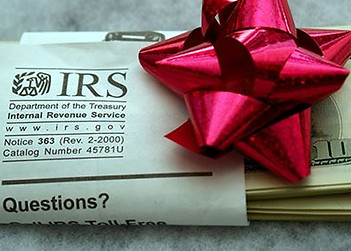
How to spend your tax refund wisely. . . or not
Getting a tax refund this year? What's your first shopping impulse? Now breathe deep and put your credit card away (or close that Amazon link)—at least until you check out these ideas from a recent post at Personal Finance for PhDs.
Blogger and financial coach Emily Roberts, Ph.D. (Duke 2014), offers targeted insights on money issues for academics. Whether your refund is a couple hundred bucks or a couple thousand, Roberts offers strategic advice for graduate students as well as faculty.
Before you spend it, consider stashing it in a savings account for upcoming needs. Or pay down your top priority debt. How about a contribution to your IRA? You could apply it to investments or a home down payment. Have you considered investing in yourself with a financial or productivity coaching or a conference? And yes, she also advocates using some to live a little!
Editor's Tip: How about using it as a reward for finishing your proposal or final manuscript? Put up a photo of your dream destination or activity or item right next to your timeline to graduation. Will it be Paris? A yoga retreat? A new laptop? Allow a wee bit of daydreaming about the future—but then you must focus on necessary steps to get there.
Can they revoke your doctorate?
One newsmaker is about to find out.
Grace Mugabe, Zimbabwe's controversial former First Lady, may soon have her sociology doctoral degree revoked by the University of Zimbabwe (UZ) if her critics get their way. In the meanwhile, she might hold the world's speed record for finishing a doctorate. Awarded in 2014, just three months after she first enrolled, the thesis has been at the center of controversy for several months. Despite the custom of publishing accepted theses online, UZ refused to upload Mugabe's work despite wide protests until January 2018.
Grace's thesis is the "greatest academic fraud in history," tweeted Zimbabwe political analyst Dr. Pedzisai Ruhanya. He implies that ghost writers "on drugs" must have written it since they included citations from 2016 and 2017—after the degree was granted. Rhodes University sociologist Kirk Heliker deemed it worth at best a half-master's thesis, well below the expectations for a doctoral degree.
The takeaway? Don't hire ghostwriters without checking their work for accuracy. (Just kidding—don't hire them at all.) And slow down—take more than three months to complete the entire doctoral program. Feeling safer now?
Photo credits:
"Delete": This Photo by Unknown Author is licensed under CC BY-SA
Instant Pot: ©2018 by Gayle Scroggs
Tax Refund: This Photo by Unknown Author is licensed under CC BY-ND
More Insider Tips for Finishing Your Dissertation Faster | Issue 237
Stop waiting for hard deadlines from your adviser or inspiration from your muse to get going on your dissertation. Jump start your progress with proven strategies to rev up your dissertation process and finish your degree faster from someone who knows. (Reading time: about 5 minutes.)

By Gayle Scroggs, Ph.D., P.C.C.
Did your doctoral program's hidden curriculum catch you unprepared?
I'm referring to the implicit expectation that you will master the principles of self-management on your own. Without self-management skills, you are an easy mark for procrastination, writer's block, and all the other obstacles you are likely to put in your own way. Every ABD student needs to hone these skills to get unstuck, keep the pace up, and finish strong.
If you are hoping that someone will set a hard deadline from you to force you to write, you will benefit enormously from the 10 top insider tips I've culled from experts, research, and experience. The first five tips were shared in the last issue, and below you'll find the final five.
Don't waste time waiting for your advisor or muse to light a fire under you. Take control of yourself and your dissertation by following these tested recommendations:
6. DISCOVER YOUR BEST PROCESS.
What works for your advisor or best friend might not work for you. Does drawing a mind map get your thoughts flowing? Have you tried free writing or outlining? Do you work better with music or silence? There is no one right way to write, as Helen Sword's investigation of prolific academic writers demonstrates.
"Be yourself. Everyone else is almost taken." ~ Oscar Wilde
7. DON'T SKIP THE REWARDS.
Minimizing your achievements is false humility and will thwart your progress. It is not self-indulgent to give yourself a pat yourself on the back or accept one when you show up for what matters. Setting up a reward expectation inclines your mind to keep going when the going gets tough. Find 155 reward ideas, including free ones, here. Be sure to choose rewards that support rather than undermine your other goals, e.g., saving money or losing weight.
"Humility is not thinking less of yourself. It is thinking of yourself less often." ~ C.S. Lewis
8. PROTECT YOUR TORTOISE.
Write first; edit later. It seems our creative mind acts like a shy tortoise; it needs freedom to roam without the threat of imminent attack from a predatory mind poised to doubt, delete, and dismiss. Your writing creature will only emerge when you give it a safe space, says Monty Python's John Cleese.
"It is perfectly okay to write garbage—as long as you edit brilliantly." ~ C. J. Cherryh
9. EXPECT YOUR INNER CRITIC.
Count on it to show up right when forward movement is possible. However, you have the power to keep the encounter brief. Here's how: (a) Meet it head on by jotting down its assertions, e.g., "This is total crap." (b) Next, disempower it by adding a preface, e.g., "I am having the thought that again that this is total crap." (3) Lastly, let go of the thought as you commit yourself to action, i.e., doing what is in your long-term best interest. Remember, your thoughts are not facts. While you cannot choose which ones arise, you do get to choose how to respond.
"You don't have to believe everything you think." ~ Contemporary bumper sticker.
10. REMEMBER: HABITS TRUMP WILLPOWER.
Cultivate a sustainable routine. That will train your brain and others to accept that "if it is between 9 am and noon, Adam is writing and cannot be disturbed." Precommitment conserves critical mental energy needed to think and resist temptations. It also creates shared expectations with others that minimize conflicts and misunderstandings.
"We are always developing habits. The real question is which ones." ~ Coach Gayle
In the end, it is up to you to choose to master this implicit doctoral curriculum. Don't expect your professors to impose it. That's not their job. If you sense that you would benefit from professional help as you cultivate your writing and self-management habits, don't hesitate to call a dissertation coach. That's what we are here for.
DID YOU MISS THE FIRST FIVE INSIDER TIPS IN OUR LAST ISSUE? CLICK HERE TO READ.
FOR FURTHER INSPIRATION
-
Davis, Josh. Two Awesome Hours: Science-Based Strategies to Harness Your Best Time and Get Your Most Important Work Done
-
Duhigg, Charles. The Power of Habit: Why We Do What We Do in Life and Business
-
YouTube: Question of Practicing: Joy Boys Video (2 minutes) with a child's simple wisdom: What you practice, you will get good at.
Top Insider Tips for Finishing Your Dissertation Faster | Issue 236
Avoiding your dissertation while you hope for hard deadlines for your advisor or inspiration from your muse? You could wait forever. Get going today with proven strategies for getting unstuck and on track to finishing your doctorate from someone who knows. (Reading time: about 5 minutes.)

By Gayle Scroggs, Ph.D., P.C.C.
One author likens dissertation writing to baptism by fire.
Does that phrase ring true for you?
If you've ever experienced doubts, anxiety, or paralysis on dissertation street, you may find it an apt metaphor. Chances are that no one warned you about rampant dissertation overwhelm—or offered a clue about how to combat it.
If you are struggling to finish your dissertation, the hidden curriculum in doctoral programs most likely caught you by surprise.
What curriculum is that? It's one that deals with the principles of self-management.
It's a tough course, but in the long run, you will find it mastering yourself to be worth at least as much as your academic learning. Managing a mammoth endeavor such as a dissertation is as much about managing yourself as about managing theories and data.
The real secret to finishing a dissertation cannot be found in a library or a laboratory. Instead it reveals itself as you become more adept at managing your time and your energy. In short, it's about honing self-discipline to a level you didn't need in high school or college because you got by on your smarts.
Careful observation reveals that truly successful scholars don't just finish their dissertation. Along the way they also establish powerful, healthy habits that convert goals into achievements. The most effective way to do this involves intentionally practicing strategies that work, i.e., the ones that allow you to turn away from distress and pivot toward productivity.
Fortunately, you don't need to reinvent the wheel. Prolific writers and productivity researchers tend to agree on the best practices. These practices also resonate with what I've learned from fourteen years of coaching ABD students to success.
In this post and the following one, I'll share the top 10 proven strategies that will get you unstuck and propel you to the finish line. If you are faltering or in danger of burning out, experiment with these to steady yourself, keep your cool, and keep writing until you earn that sheepskin.
1. Don't wait for your muse. Successful writers don't wait for inspiration. You finish a writing project by honoring your goal. That means calendarizing D-time just as you would appointments with your advisor or dentist. For extra punch, label your writing appointments with compelling, inspiring phrases, such as "For my success" or "Be kind to future me!" or whatever calls to you. Don't wait for your muse or "the right mood." Get started, keep at it, and your mind will eventually follow suit. When you become present to the writing, the words will come.
"Your job is to make sure the muse knows where you're going to be every day from nine 'til noon or seven 'til three. If he does know, I assure you that sooner or later he'll start showing up, chomping his cigar and making his magic."
~ Stephen King
2. Lower the barrier to starting. Make it easier to start writing than to fritter away your valuable time. Skip the temptation to clean off your desk by getting everything ready the night before. Keep your sequenced task list posted to avoid the merry-go-round of indecision: "Should I edit the Intro? Or write Chapter 5?" Does a blank page induce terror? Then leave your word document open with the last sentence of the day or a note about where to start. Reducing uncertainty about where to start lowers the risk that seeds of doubt will germinate.
"The secret of getting ahead is getting started." ~ Mark Twain
3. Commit yourself to a fixed start time. Don't focus on the deadline—focus on the start time. That creates an open loop that your brain works to close by reminding you to follow through. Research shows you are twice as likely to do it if you've said when you'll get going. Remember how your "inner nag" kept reminding you that you had an impending call to your advisor? And it stopped after you made the call? That's how it works.
"Don't wait. The time will never be just right." ~ Napoleon Hill
4. Minimize all distractions. Turning off your smart phone or web connection does not go nearly far enough. Mindfully assess other distractions in your environs. Every time you toggle your attention, you lose. (Family photos, dirty dishes, and the latest New Yorker are among my nemeses, which is why I am writing this from St. Michael's Blue Crab coffee shop.)
"There's no such thing as multitasking, just multifailing." ~ Peter Brookman
5. Maximize "nudgers." The opposite of a distractor, a nudger can be anything that helps keep you on track. Make your writing space attractive. Put your most inspiring book on it. Post a calendar and put a star each day that you meet your quota. Get a writing buddy or ask a friend or coach to expect your latest page at day's end. (You could pin up a photo of the exotic beach or city you will visit after graduation—but take it down if you start daydreaming about being there). What works for you?
"When you feel like quitting, think about what got you started." ~ Anonymous
Following these recommendations will reap you two important benefits—your sought-after doctoral degree and the deep satisfaction of enhanced self-management. Over time, the return on your investment will continue to compound. Plus, your self-confidence will soar because you know you can trust yourself to follow through on your commitments.
In the end, it is up to you to choose to master this implicit doctoral curriculum. Don't expect your professors to impose it. That's not their job. If you sense that you would benefit from professional help as you cultivate your writing and self-management habits, don't hesitate to call a dissertation coach. That's what we are here for.
DON'T MISS THE NEXT ISSUE — GET THE FINAL FIVE INSIDER TIPS TO FINISH YOUR DISSERTATION FASTER.
FOR FURTHER INSPIRATION
-
Davis, Josh. Two Awesome Hours: Science-Based Strategies to Harness Your Best Time and Get Your Most Important Work Done
-
Duhigg, Charles. The Power of Habit: Why We Do What We Do in Life and Business
-
YouTube: Question of Practicing: Joy Boys Video (2 minutes) with a child's simple wisdom: What you practice, you will get good at.
Harness the Proven Ingredient for Dissertation Success—And It’s Not What You Think | Issue 235
Feel like giving up on your dissertation? Harness the proven ingredient for success that will be your game changer. (Est. reading time 5 minutes)
By Ilene Berns-Zare, PsyD
"In the realm of ideas everything depends on enthusiasm. . . . in the real world all rests on perseverance."
~ Johann Wolfgang von Goethe
"I am ready to give up."
"I can't do it."
"This is too hard."
Does that sound like the little voice inside your head when you look at your dissertation?
If so, you need the secret ingredient guaranteed to steer your thesis boat away from rocky cliffs and back into sailing on deep blue water.
Earning your doctoral degree, as with other big goals, requires more than mere talent and learning. You have to stick with your work even when the going gets tough. You must expend effort even when progress is not immediately obvious. What makes this possible?
The secret ingredient, says U Penn psychologist Angela Duckworth, Ph.D., is grit—her word for a combination of passion and perseverance. "Our potential is one thing, but what we do with it is quite another," she has concluded.
The term grit may trigger images of gravel or sand between your teeth, as happens with eating steamed clams, or maybe a feisty tough guy in the movies, e.g., John Wayne. However, psychological grit is much more, as Duckworth explains in her New York Times bestseller, Grit: The Power of Passion and Perseverance. Grit turns out to be the game-changer. It's the personal element that generates the stick-to-itiveness needed to achieve long term goals.
"We were made to persist. . . that's how we find out who we are." ~ Tobias Wolff
"It's not that I'm so smart, it's just that I stay with the problem longer." ~ Albert Einstein
Grit: Your Key Dissertation Success Factor
Research by Duckworth and her colleagues shows that those who have grit are more likely to succeed in a variety of venues.
Studying more than 1200 West Point cadets, they found grittiness a remarkably reliable predictor for those who finish the rigorous program. Remarkably, the critical factor turned out to be grit rather than leadership experience, SAT scores, high school rank, or athleticism.
In their National Spelling Bee study, they isolated the single factor that determined whether kids advanced in the competition—and it was grit, not verbal proficiency. Successful competitors had devoted significantly more effort in the form of hours of studying and competing in spelling competitions.
You can make grit your antidote for dissertation doldrums. And here's the best news: you can grow grittiness with simple research-backed strategies.
"There are no secrets to success. It is the result of preparation, hard work, and learning from failure." ~ Colin Powell
Ready to Get Grittier? Here's How
How gritty are you now? Take the Grit Scale free on Duckworth's website here: http://angeladuckworth.com/grit-scale/
If you are not satisfied with your current grit level, take heart. You've learned esoteric facts in your discipline. You've mastered apps your parents never heard of. You learned how to shop and cook. You've learned zillions of things that facilitate the good life—and now you can learn to be grittier. Duckworth offers insights and tips to guide you:
Renew your passion. You've chosen your dissertation topic, now invest in it. To sustain perseverance, gritty people activate interests again and again. Revive your interest—remind yourself why your topic and work matter. Spend time with those who encourage you. Talk about your work with others. Find ways to stay engaged with the material and your goals.
Practice deliberately and daily. "Deliberate practice" drives continuous improvement, asserts renowned performance researcher Anders Ericsson, Ph.D. Unlike the mindless repetition that may occur in ordinary practice, deliberate practice requires a clear focus on improving performance. First define your specific goals and then cultivate a daily routine for total engagement as you work. It is crucial to assess key weakness—with others' feedback as necessary—to determine next steps for further improvement. For your dissertation, how can you use your committee's comments to identify those areas for special attention?
"Talent is cheaper than table salt. What separates the talented individual from the successful one is a lot of hard work."
~ Steven King
Identify your purpose. How will your work benefit others? Articulating a purpose beyond your own small self will lift your interest to a higher level. "What ripens passion," Duckworth explains, "is the conviction that your work matters." For example, a waiter can choose to view serving food as an opportunity to make a positive difference in each customer's day. Whether or not your dissertation becomes a magnum opus, your doctoral degree empowers you to impact the world in ways you may not yet have dreamed.
Nurture hope. Approach negative feedback and failures as opportunities to grow, focusing less on performance and more on process. As goals psychologist Heidi Grant Halvorson urges, don't aim to "be good"—instead aim to "get better." Practice talking to yourself as you would to a dear friend, with kindness and compassion. Also, reach out to others who can help, e.g., mentors or coaches. When you don't let negative thoughts impede you, you are more likely to cross the finish line.
"The three great essentials to achieve anything worthwhile are hard work, stick-to-it-iveness, and common sense."
~ Thomas Edison
Start Cultivating Dissertation Grit
How will you grow your own grittiness? Create your own grit action plan based on the above four dimensions of practice, passion, purpose, and hope.
Who will you talk to about your dissertation research? Why does your work matter? How can you identify areas for deliberate practice? What steps can you take to make dissertating a daily habit?
Journal about how your work (including your greater skills and wisdom) will benefit others—from your family, students, clients, readers, society, the discipline, etc.
Finally, acknowledge that developing grit comes through intentional practice. Watch for signs of improvement and celebrate them. Pat yourself on the back for cultivating a habit of mind that will reap rewards both now and later.
"Success isn't always about greatness. It's about consistency. Consistent hard work leads to success. Greatness will come." ~ Dwayne Johnson
Learn More about Grit
Duckworth, Angela. Grit: The Power of Passion and Perseverance. Also see her Ted talk with the same title here.
Halvorson, Heidi Grant. Succeed: How We Can Reach Our Goals
Miller, Caroline Adams Miller. Getting Grit: The Evidence-Based Approach to Cultivating Passion, Perseverance, and Purpose \

Ilene Berns-Zare, PsyD, MS, ACC, CMC is a life and leadership coach, psychologist, and educator. Ilene is committed to empowerment through learning, personal/professional development, and integrative well-being. She sees coaching, training, and writing as offering a lens through which people can gain fresh perspectives, ask important professional and personal questions, and access strengths, skills, and possibilities. Email Ilene at ibzlifecoaching@gmail.com and read more at http://ileneberns-zare.com
The Critical Dissertation Resource You Are Mismanaging | Issue 234
In less than 6 minutes, discover what critical dissertation resource you are mismanaging. Find out what you need to STOP doing and START doing to achieve your doctorate or any other goals.

The Critical Dissertation Resource You Are Mismanaging
By Gayle Scroggs, PhD, PCC, Editor
"In the absence of willpower, the most complete collection of virtues and talents is wholly worthless." ~ Aleister Crowley
Did you resolve for 2018 to make noticeable headway on your dissertation?
If you are struggling, your problem might not lay in a lack of scholarly ability or time management skills. You have a different problem if you answer yes to any of these:
1. Do you find it hard to get started on your dissertation?
2. While writing challenging sections, do you find your mind wanders excessively?
3. At times do you find it hard to make up your mind about simple things?
4. Do you tend to overreact to trivial stuff too often?
5. Do you feel brain dead or listless when you need to be productive?
Most likely you are mismanaging one of your critical resources: your willpower.
Your Critical, Limited Resource
To manage your willpower optimally, you first need to understand two basic lessons:
1. Your supply of willpower is limited.
2. The energy resource that fuels willpower also fuels many other crucial activities.
Let's unpack those lessons from Roy Baumeister, Ph.D., the world's leading willpower investigator to show you how to boost your own willpower. Forget concepts of willpower as some mystical force or inborn trait. You and everyone else has the capacity for willpower, which is simply the ability to monitor and regulate our behavior.
Research shows that willpower works like a muscle—one that gets depleted with use but stronger with exercise. You begin each day with a fresh reservoir of willpower so long as you get a good night's sleep.
You consciously deploy willpower to avoid the jumbo sugar-spiked muffin at the coffee shop when you order your latte. And you call on it again at lunch to order the tossed salad instead of the juicy burger with fries. But those are not the only kinds of occasions which deplete this precious resource.
Whenever you exercise self-control, you are draining your willpower reserves. It does not matter whether you are restraining "bad" behavior or activating "good" behavior, or if you struggle and then succumb to temptation. You've used up some of your willpower.
Of course, you are using willpower when you force yourself to open your manuscript instead of Facebook. But did you realize that you are also tapping it whenever you button your lip while someone rips through your latest draft? Or when you fake interest during a boring lecture? Or when you force a smile at someone's dumb joke? When you exert conscious force to regulate your behavior, you are draining your willpower energy.
Even Small Decisions Sap Your Willpower
Even the wheels of justice require willpower to grind. One study found that parole boards granted parole more often during early morning hearings and right after the noon recess compared to late morning and late afternoon. Apparently making tough decisions depleted their willpower, leading them to render the easier default decision of "no parole" until lunch provided a temporary rebound. If you ever grabbed fast food at the end of the day instead of making a healthy dinner, you can sympathize with them.
What is going on? It turns out that the act of deciding sucks your willpower energy, explains Baumeister. Weighing information and arriving at a decision consumes the same fuel source that self-control does, creating "decision fatigue."
Try counting how many decisions you make in a day. According to Cornell researcher Brian Wansink, the average person makes over 220 just about food. Even a Starbucks stop involves myriad choices: "Espresso or latte? With a shot of amaretto? Cream or sugar? Cash, debit, or credit?" This suggests that if you are counting on an energy boost from coffee, you would do best to place a standard order each time.
Willpower: A Must for Thinking
By now you should be getting the picture: If you are making a host of decisions before you even sit down at your desk, your willpower has been compromised before you write your first word.
Why does this matter to a scholar? You need to tap into that same willpower energy reservoir to think. We're talking about the "heavy cognitive lifting," e.g., analyzing, synthesizing, evaluating, creating, and so on, not rote tasks.
When you engage in deep thinking, your brain burns the same fuel it requires for self-regulation and decision tasks. In a willpower-depleted state, you will struggle with the challenging sections of your dissertation. Given all the drains on your willpower reservoir, is it any wonder you feel "brain dead" at times?
If you find yourself overwhelmed by simple decisions as you write, or if you catch yourself overreacting at small irritations and interruptions, take note: These signal a willpower tank hovering on empty. Beware misinterpreting them and becoming frustrated or angry with yourself or others.
Take a break and allow your willpower to renew itself before proceeding. Eat that lunch you skipped. Try a walk outdoors or some meditation. Try a nap. Even better, work on building your willpower with these 12 evidence-based tips.
"There is no such thing as a great talent without great willpower." Honore de Balzac
12 Ways to Boost and Manage Your Willpower
Willpower, like money, is a depletable but renewable resource. For success, you need to budget the resources you have while growing them. Here are some immediate steps you can take to conserve and increase your willpower:
1. Do the hardest thing first each day. Willpower is strongest in the morning—so put your highest priority willpower items here. Many successful people reserve these hours to do their creative or intellectual work, saving for later routine work, e.g., answering emails, filing papers, etc.
2. Budget your willpower. Prioritize your dissertation for your willpower resources. Throughout each day, intersperse willpower-intensive tasks such as writing with easier tasks (e.g., checking references or folding clothes) to give your willpower muscle time to bounce back. Say no to new projects that will drain you.
3. Let someone else decide. What decisions can you stop making? Enjoy letting someone else pick the movie, the restaurant, the gift for grandma, etc. President Obama was famous for letting others choose his daily suit and tie so he could focus on more vital decisions.
4. Pre-decide your schedule. Hold a weekly "executive session" with yourself to calendarize your dissertation and other tasks to help you conserve time and energy later. Also, plan your work the evening before or first thing in the morning before you get started. Stopping to decide what to do kills your momentum.
5. Take care of your body, starting with sleep. "A rested will is a stronger will," assert Baumeister and Tierney. Adequate sleep may be even more important than food. Unless you are walking up on time and refreshed without an alarm clock, you need more than you are getting. Tom Rath's Eat, Move, Sleep will convince you to get at least 7 or 8 hours of sleep each night if you want sustained high performance.
6. Fuel your brain. Nourish your brain with low-sugar, high-protein foods that metabolize slowly. You can't do your best work on coffee and a donut or granola bar. Resist the craving for sweets that arises as willpower wanes. Stave off the sugar spike-and-crash syndrome--munch on nuts, cheese, or high-protein foods for your mid-morning and mid-afternoon breaks.
7. Expend a little willpower on neatness. Start with your desk. You'll get a good return on your investment because, as studies show, messy desks reduce self-control. "Order seems to be contagious," note Baumeister and Tierney.
8. Build your willpower reserves by deliberately exercising it in small ways. Make your bed each morning. Open doors with your non-dominant hand. Stop eating while computing. Do not let yourself get up from your chair during dissertation time—even if you can't write, you must stay glued to the chair. (This was a key strategy for author/poet Raymond Carver.)
9. Identify other environmental cues that lessen self-control. Identify and remove other triggers in your environment that distract you. An unpaid bill on your desk? A pinging smart phone? If practical, dedicate one computer to your dissertation and use a second one (or your tablet) for internet and Facebook time to avoid the "slippery slope."
10. Monitor your progress. A visual record will give you immediate encouragement and permit better long-term planning. Even if you slack off now and then, you'll see your progress and immunize yourself from hopelessness. Check off your tasks as you finish them on a posted timeline so you can see how much further you have to go. Drop a marble in a jar each time you work for an hour straight or finish a page. Acknowledging progress provides a nice dopamine boost that will nourish your habit.
11. Reward yourself. Online game designers know what keeps the hordes coming back: a mix of frequent small prizes with occasional big ones. How can you tweak your reward system to become addicted to playing with your dissertation? What small treat could you use for completing your daily quota of time or words? Or when you fill up your marble jar? What larger reward would pull you towards finishing an entire chapter draft? (One client paid herself per hour in Monopoly® money, keeping the growing stash in view; she later converted the colorful notes to real money for a post-dissertation vacation.) Rewarding self-control helps build it.
12. Leverage willpower to create healthy habits. Most importantly, don't rely on your limited willpower resource to get your dissertation out the door. Instead, invest it in building good habits one at a time. That way you will reap rewards without burning up resources. Save willpower energy for important decisions, deep thinking, and crises.
"I value self-discipline, but creating systems that make it impossible to misbehave is more reliable than self-control." Tim Ferris
Developing self-control requires some effort at first, but in the long run, it is well worth it. So when will you get started? Use your existing willpower now to decide just one small habit to create. Then commit yourself to practicing until it becomes ingrained. Let me know how it goes. Drop me a line at gayle@mcpcoach.com.
RECOMMENDED WILLPOWER RESOURCES
Under Armour Ad with Michael Phelps, "Rule Yourself" video: https://www.youtube.com/watch?v=Xh9jAD1ofm4
Baumeister, Roy and John Tierney. Willpower: Rediscovering the Greatest Human Strength
Rath, Tom. Eat Move Sleep: How Small Choices Lead to Big Changes
Illustration above by Unknown Author is licensed under CC BY-SA
Explore New Dissertation Hacks, Jobs Beyond Academia, and Grad Student Tax Hikes | Issue 233
In less than 7 minutes, discover tips and info to speed you to graduation and a great job. Find out--
…how a daily gratitude practice will get your dissertation out the door faster.
…how some ABDs and postdocs are snagging good non-academic jobs—and how you can too.
…why grad students are freaking out about proposed tax legislation—and what to do about it.
…what to do if your dissertation has grown cold and you want to re-start.
…fun, effective ways to let your inner kindergartner manage your time and attitude.
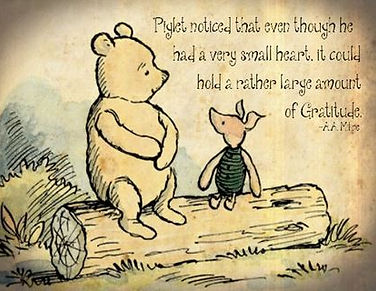
Gratitude Hacks: 5 Ways Gratitude Revs Up Your Dissertating
Don't stop giving thanks when turkey leftovers vanish. Here's why:
Research shows that one of the surest ways to get you into dissertation flow is starting every morning with gratitude, as Scott Tousley of HubSpot observes:
• Yale studies say a gratitude journal will result in higher alertness, enthusiasm, determination, attentiveness, and energy.
• Stanford offers a high-demand class leveraging gratitude journals, which made students 27% less stressed.
• Harvard studies indicate gratitude improves health and strengthens relationships.
• UC-Berkeley research ndicates a gratitude journal improves sleep and decreases illness.
• Columbia research says gratitude improves the immune system, while reducing anxiety and/or depression
Tip: Keep a little notebook and pen by your bed and contemplate three things that are going right in your life. For the digitally minded, download the acclaimed Five Minute Journal app to jumpstart every morning with gratitude, affirmation, and intention.
Why it works: Cultivating gratitude increases your happiness, which then energizes you, opens your mind, and builds your resources. It's the closest thing we have to a silver bullet. Keep in mind that gratitude is not just for breakfast anymore—it works any time of day to lift you out of a funk.

Getting Hired: How Berkeley ABDs & PostDocs Snag Non-Academic Jobs
Unless you've been asleep for the last couple of years, you know that today's doctoral students must broaden their career horizons to include non-academic paths. To meet this new reality, a group of UC Berkeley graduate students and postdocs have organized as "Beyond Academia," or BA for short.
BA strives to educate PhDs in the Humanities, Social Sciences, and STEM fields about careers outside the ivory tower through small professional developmental events and more. This year the Beyond Academia two-day conference featured over 100 PhDs who transitioned successfully and attracted 400 attendees.
"Beyond Academia alumni have successfully transitioned to careers in industry, consulting, writing and media, policy, entrepreneurship, and many other fields," notes their latest newsletter.
What you can do: Develop your own local team of doctoral students and post-docs to create a "Beyond Academia" movement on your campus. Contact UC Berkeley's Beyond Academia group for more information.
Grad Students Freak Out at House GOP Tax Plan
Do you receive a tuition waiver? If so, be aware that the Republican tax legislation passed by the U.S. House of Representatives could raise your taxes by 300 to 400%, according to several sources, including NPR.
"Graduate students are freaking out about the GOP tax plan—they should be," writes Wired, given the provision buried in the bill makes graduate students' tuition waivers taxable income.
Even with untaxed tuition waivers, most doctoral candidates live frugal lives, and many support families. A hit like this could force many to drop out and stifle diversity efforts, especially in STEM fields. Universities will feel the impact on several levels, from staffing to research. (The Senate version lacks this provision, so there's a chance it could be dropped in the final version.)
"The American Council on Education sent a letter to Congress decrying the plan," notes NPR. The letter was signed by over 30 academic organizations, including the Association of American Universities, the Council for Advancement and Support of Education and the American Psychological Association.
What You Can Do: Share your opinion with your elected Federal legislators using contact details at www.usa.gov/elected-officials.
Dissertation Grown Cold? Here's What to Do Now
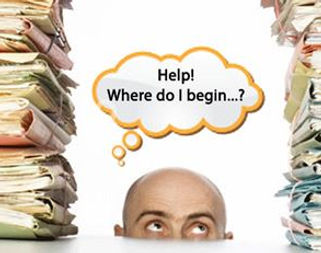
Life is what happens while you're busy making other plans.
~ Allen Saunders
Doctoral years are also prime time for significant life events—job hunting, starting new job, getting married, getting divorced, having or adopting a baby, moving, etc. Any of these may lead you to hit the dissertation pause button. That's okay. Picking it up again later can be tough, which is when you need this advice from someone who's been there.
As Heather VanMouwerik tells it in her Grad Hacker blog post, her Russian history dissertation went off the rails during a cross-country move. Despite careful planning, the move morphed into a "5,000-miles-in-4-days saga of broken dishes, exploding tires, dishonest mechanics, twitching eyelid, and exhaustion," she writes. Worse, her grandfather died at the same time.
After two months of Netflix binging, Heather emerged from her slump only to panic whenever she merely thought about her dissertation. She struggled to remember where her research was—and what it was about. She questioned if she could or should continue.
At last a sliver of inspiration allowed Heather to get her dissertation mojo back and share her hard-earned wisdom with others. Start with forgiveness, she advises, then get your dissertation ducks in order. In short order, you'll get re-inspired too.
[Editor's note: Dissertation coaches can also be very useful in helping you get that spark back and words on the page.]
Productivity Secrets from Your Inner Kindergartner
For those who did NOT learn everything you needed to know about time management in kindergarten, read this. Quartz's Indrani Sen offers spoofy suggestions from the playground set based on actual evidence. How many can you adapt to manage your time and attitude? Check out the best below, and find the rest here:
1. Conserve time and energy by wearing your own personal uniform daily. Add a funky accessory (e.g., dinosaur mask or glittery tutu) to show your wacky side.
2. Become a thought leader by uttering authoritative phrases, e.g., "actually," "technically," "as I was saying," etc.
3. "Keep your cubby inbox at zero." Don't let stuff accumulate.
4. "Embrace failure—or else rename it." If your Lego pirate ship collapses, call it a cannon.
5. "Wasting time is for preschoolers." Apply the Pomodoro technique, network at meals, stay focused, and above all, learn the power of saying "no."
~ Compiled by Gayle Scroggs, PhD, ABDSG Editor
PHOTO CREDITS: (1) This Photo licensed under CC BY-NC-ND; (2) This Photo licensed under CC BY-NC-ND; (3) This Photo licensed under CC BY-SA
Want a Quicker, Better Dissertation? Do These Three Things Now | Issue 232
Dissertating goes faster, smoother, and better when you do "deep work." Learn how to create a ritual to help you hone this indispensable skill for doing work that matters. [5-minute read]
Want someone in your corner to help you do deep work? Get a dissertation buddy or contact us for your very own coach.
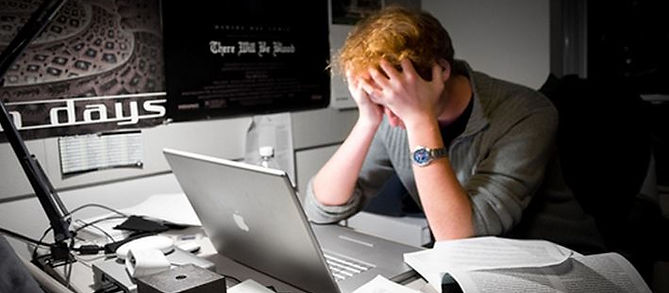
Want a Quicker, Better Dissertation? Do These Three Things Now
By Gayle Scroggs, Ph.D.
Positive Psychology Dissertation Coach & ABD Survival Guide Editor
"Focus is the new I.Q." ~ Cal Newport
The skill you most need to finish your dissertation is one you were never taught.
Don't worry—it is not too late. You will find it to be the most effective way to rev up your dissertation pace and quality at the same time.
This amazing skill is known as deep work. It is the "ability to focus without distraction on a cognitively demanding task," explains Cal Newport, Ph.D., who popularized the concept in Deep Work, an award-winning bestseller.
The capacity for deep work divides the mediocre from the extraordinary in business, academia, and other endeavors, argues Newport, an associate professor computer science at Georgetown.He further emphasizes that deep work is a skill that can be developed. He contends—and I've experienced—that honing this skill leads to a very fulfilling career and life.
You absolutely need to do deep work as a doctoral candidate and scholar. It's imperative for learning challenging material and for producing high-level work—two activities central to academic success. Below I've sketched out Newport's basics to guide you in designing your own deep work ritual, adding my own tips gleaned from over a decade of coaching dissertation clients.
What facilitates deep work?
Newport spells out just what you need for the peak performance that deep work facilitates: your full concentration, a single task, and a distraction-free environment.
Have you noticed a significant uptick in the quality and quantity of your work when those three conditions prevail? Have you wondered how to create those conditions on a regular basis?
If so, it's time to cultivate your own deep work practices to get that dissertation out the door sooner. Moreover, you will create a better product that will give you a deserved sense of fulfillment as you graduate. Finally, you will have developed a skill whose value compounds over time. That's because deep work will lift you from mere busyness to accomplishing what matters, no matter what career you choose.
As deep work becomes rarer, its value rises, observes Newport. In a crowd lost to distraction and overwhelm, your superior work will stand out. By completing meaningful projects, deep workers reap more satisfaction and greater rewards than those who equate hyperactivity with productivity. When did a multi-tasker or juggler ever create a lasting monument?
To develop a deep work practice, you must first commit yourself to uprooting some ingrained habits that block your way. Going deep means going against the social currents, where most people get caught in a frenzy of email, social media, and pointless meetings.
It means saying "no" to umpteen distractions and shallow work in order to say "yes" to what really matters. For example, Newport strongly recommends quitting social media. Developing your own deep work ritual creates a new normal for you. In doing so, you are retraining your brain, so with practice, you will find it gets easier.
Create your own deep work ritual in 3 steps
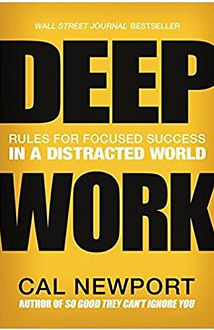
The deep work ritual contains three chief ingredients: time, structure, and support. My experience shows that you will also need some explicit strategies for handling inevitable interruptions and obstacles along the way.
1) Block out time on your calendar.
On your calendar, schedule your deep work sessions in blocks as you would important meetings. Newport recommends blocks of no less than 90 minutes, although you may break it up into Pomodoro-style chunks, e.g., 25 minutes of work followed by a five-minute break. [The Productivity Challenge Timer, a Pomodoro-style app with tracking capabilities and quirky humor really keeps me on track.]
If someone attempts to intrude, aim to reschedule the intruder rather than your deep work. It's helpful to hone some handy phrases for this, e.g., "I'd love to meet with you, but I'm booked at that time—when else would work for you?" Some of my dissertation clients struggle to turn a student or family member away—until they actually try it and discover that the other person is usually more than willing to accommodate their request.
Temptations more often arise from within—and you need to say "no" to those too, I've found. For example, if your inner monkey begs you to check email or Facebook, calm it down by assuring it that you will do that in your free time—but that right now you are going to finish the sentence you were writing. Then ignore it as you would a spam caller.
Some go further—disabling their internet connection or dedicating a separate computer for dissertation-only work for fuller concentration. It seems deep down there is a consensus on Newport's observation: "Human beings, it seems, are at their best when immersed deeply in something challenging."
Choose where you will work and note that as well. Over time, experiment as necessary to which surroundings best promote focusing on your work. I've had dissertation clients choose the university library, a coffee shop (often with earphones), a convent, and even a hotel lobby! The dining table rarely works well. Staving off distractions and interruptions eats at your cognitive power, so choose carefully. Pre-committing yourself to a time and place also conserves your willpower energy.
2) Define your structure.
How will you measure your progress? Will you track words or pages produced? Time spent researching a particular topic? Make it something measurable.
Decide in advance, then stick with it so that you know when you can stop. Newport suggests aiming high, e.g., by giving yourself 20% less time than you think it will take, to produce the intense focus that accompanies impending deadlines.
That might work for you, although it has not for me. Nobel Prize winner Daniel Kahneman found most people drastically underestimate the time needed to complete a project because they tend to assume the best-case scenario—which almost never happens. I block out extra time for each project to prevent overbooking or last-minute panic. Until you are more experienced with a task, allow at least twice the time you predict you will need.
Some of my ABD clients have devised clever ways to monitor their output or time spent to boost motivation. One literature grad student paid herself $10 Monopoly dollars per hour, redeemable after graduation for a dream trip. Another creatively added Legos to a fanciful structure that served as a visual reminder of her continuing progress.
Yet another advanced her token over mountains and through swamps on her very personal Dissertation Journey Map. You can keep it simple: just drop a marble in a canning jar for each deep work session you complete. Marking your progress gives your brain an energizing jolt of dopamine that will keep you going. Keep it in view to serve as a prompt to get working.
3) Organize your support system.
What materials will you need while you work? Keep any needed dissertation materials handy, either electronically or in portable files. Nothing feels more frustrating than to sit down to write only to realize you left the key reference in your study.
What kicks your brain into gear? Some swear by a cup of coffee. Others find a short walk, especially in nature, puts them in a deep work frame of mind, says Newport. Your brain doesn't run well on mere caffeine or on empty, I might add, so remember to feed it as needed, e.g., with healthy snacks or a nutritious lunch. Getting a good night's sleep will also contribute to your ability to focus.
As you experiment with deep work, keep notes on what you discover works. As his blog excerpt in the box asserts, dissertating may be hard but it is not hard to do, i.e., painful or unsustainable.
CAL NEWPORT ON DISSERTATING
"Hard" vs. "Hard to Do"
I found writing my thesis to be similar to writing my books. It's an exercise in grit: You have to apply hard focus, almost every day, over a long period time.
To me, this is the definition of what I call hard work. The important point, however, is that the regular blocks of hard focus that comprise hard work do not have to be excessively long. That is, there's nothing painful or unsustainable about hard work. With only a few exceptions, for example, I was easily able to maintainmy fixed 9 to 5:30 schedule while writing my thesis.
Add a dose of freedom
Paradoxically, adding a little freedom helps, observes Newport. Down time can promote insights and allow for recharging your batteries. Spending time with family, friends, nature, and favorite pastimes will revitalize you—so make time for them.
When you do deep work during the day, any evening work will probably not be up to snuff, so skip it in favor of shallow tasks, he advises. Willpower research supports his contention, as does the experience of many of my ABD clients.
ABDs who try to dissertate after a long workday—e.g., after dinner, after putting kids to bed, after a little TV to relax—usually report that they cannot focus, I've noticed. Worse, despite good intentions, many fall prey to binge Netflixing. If your dissertation matters, you must make it a priority—not the last thing on your list.
When you start practicing your very own deep work ritual, you will witness a boost in productivity that will make it easier for you to say "yes" to the other things that matter. You will be able to complete your assignment during the day—and wrap it up before dinner.
Sound impossible? Consider highly productive academics such as U Penn's Adam Grant, an uber-productive academic and social media contributor. The youngest-ever tenured professor at the prestigious Wharton School, Grant departs his office at 5:30 to devote himself to a thriving family and social life. Notice the successful academics and other professionals around you who have mastered keeping boundaries around their work day—they are the ones who have mastered deep work.
If you find that tempting, sketch out your own ritual and experiment with it this week. Tweak it until it works for you. Remind yourself why this matters to you. For more inspiration and details, read the book.
You will spend much of your life working. Why not choose to do the deep work that will create a life of success and meaning?
RECOMMENDED RESOURCES ON DEEP WORK
-
Deep Work: Rules for Focused Success in a Distracted World by Cal Newport
-
Interview: "Deep Work" with Cal Newport by Brian Johnson
-
Quit Social Media, a TED/Tyson Talk by Dr. Cal Newport
-
Study Hacks Blog by Cal Newport
The 7 Habits of Highly Productive ABDs & Other Academics | Issue 231
In this issue: Cultivate the 7 habits you need most to finish your dissertation. [Reading time 5 minutes.]
Need more support? Apply for your own coach. Finish faster and enjoy the ride.
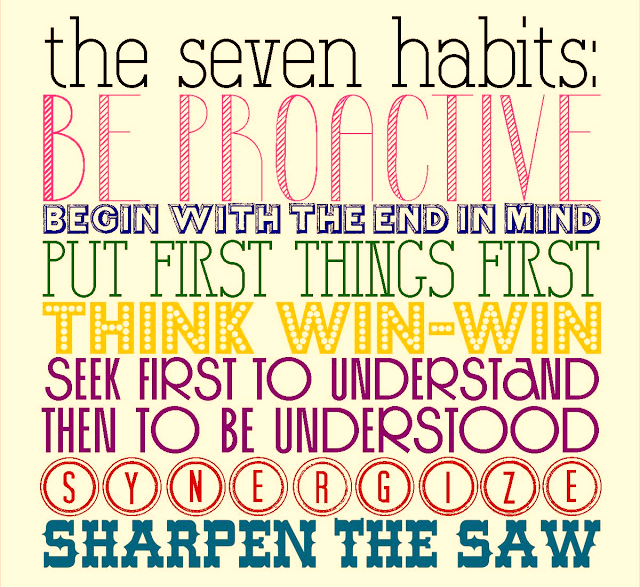
THE SEVEN HABITS OF HIGHLY PRODUCTIVE ABDs & OTHER ACADEMICS
By Gayle Scroggs, PhD
"Motivation is what gets you started. Habit is what keeps you going." - Jim Rohn
How can a business classic help academics—including doctoral students—be more productive?
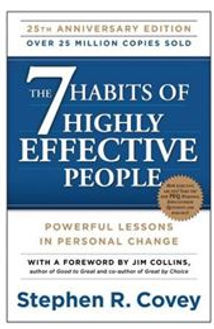
As Stephen Covey's bestseller, The 7 Habits of Highly Effective People, approaches its 30th birthday, we looked at how his advice holds up against contemporary research and expert recommendations.
The results will surprise you.
First, forget "productivity hacks." Those serve as mere band aids if you perpetually struggle to reach goals.
One basic truth emerges from Covey, science, and top gurus: Your success depends less on finding tricks than on cultivating good habits.
Rather than seeking short-term strategies, you need to build a rock-solid foundation for doing your best more through daily practices. (Remember the children's tale of the Three Little Piglets?)
HABIT 1: BE PROACTIVE—PLAN, MONITOR & REVIEW DAILY
Being proactive is about taking responsibility for your life, according to Covey.
Do you put off working on your dissertation because you lack hard deadlines?
Once you've navigated the graduate classes and qualifying exams, the external structures that once held you accountable vanish into thin air. You become the master of your time, responsible for inventing your day—which eventually becomes your life and legacy. No one else is going to create your dissertation timeline or write it for you.
What really matters to you?
Being proactive means that you set your priorities and then you plan your schedule accordingly. Thus your first task is to narrow your priorities for the year to no more than five areas of focus, advises Peter Bregman, the top on-line columnist for The Harvard Business Review.
Plan your worktime around the deliverables for those areas, devoting 95% of your time to those five areas. That means saying "yes" to tasks related to your dissertation and at most four other major foci.
Then say "no" to anything you can't fit in the remaining 5% of your workday. Do the math: That adds up to a mere three minutes an hour—not long enough to do email, check Facebook, or shop on Amazon. Relegate those distractors go to your leisure hours.
Here's how Bregman breaks it down in his book 18 Minutes: Take five morning minutes to identify what would make today a success, check in with yourself for one minute at the top of each working hour, and then spend five evening minutes reviewing your day.
Over time, keep your desired balance across your five areas of focus. (For a video summary, click here.)
Besides your dissertation, what other four top areas of focus will you choose? What will you have to delete or delay until after D-day (dissertation defense day)? Remember that your future self will thank you for your hard work and persistence.
HABIT 2: BEGIN WITH THE END IN MIND—AND PLAN FOR THE OBSTACLES
"Begin with the End in Mind means to begin each day, task, or project with a clear vision of your desired direction and destination, and then continue by flexing your proactive muscles to make things happen," wrote Covey.
A good intention is only half the story. As Aldous Huxley wrote, "Hell isn't merely paved with good intentions, it's walled and roofed with them."
Keep your graduation goal firmly in mind—and then create the steps to get there. Imagine not just the destination, but the very path you will take. As with any worthwhile goal, the path is strewn with obstacles to be overcome. After all, if it were easy, everyone would have a doctorate.
Ignore New Age types who claim all you need is a bucketful of positive affirmations and a tantalizing vision of your goal—and voila!—your dream will come true. Such fantasizing backfires by tricking your brain into thinking you've already accomplished your goal—and then kills your motivation to work.
NYU psychologist Dr. Gabrielle Oettinger has spent over two decades demonstrating that simplistic positive imagery and thinking (whether about getting a job, finding a mate, losing weight, or other) leads to worse outcomes.
To succeed, you need your wish (W), but you also need to state the outcome (O), identify the obstacle (O), and devise a plan (P). Oettinger calls this approach "WOOP" for short, as illustrated here. When you need energy to take relevant action, don't fantasize. Instead, practice flipping from thoughts about your desired goal to what you need to do to get there—and you'll generate the zest for the next step.
Sure, allow yourself to imagine the happy ending to your doctoral journey. Absolutely acknowledge your assets. Then sit down and figure out the path, obstacles and all, between you and the finish line.
(Tip: If looking at the whole path up the mountain gets overwhelming, take your eyes off the summit and focus on your next step.)
HABIT 3: FIRST THINGS FIRST—EVEN WHEN TEMPTATION STRIKES
Putting first things first means doing what you know is in your long-term best interest. Yet how often have you put off writing a difficult section to read another resource, or worse, to check email or bake brownies?
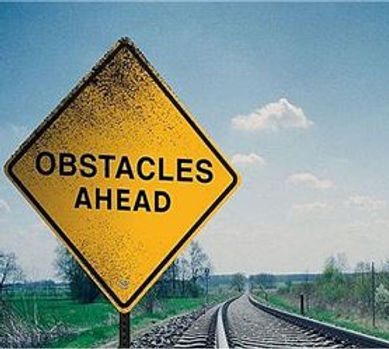
Obstacles have a strange way of making distractions even more tempting. Alas your more primitive brain wants to make things safe and easy for you in the short run. Its strong impulses swamp the signals from your modern executive brain, whose role is to look out for your long-term best interest. Impulses often win out when doing the "right thing" has not become a habit.
Build on the second habit by creating a surprisingly simple form of self-discipline that really works. This strategy shields you for all manner of clever enticements, hidden obstacles, and nasty surprises and keeps you true to your best intentions. Here's how it works: Create an "if-then" plan to deal with potential distractions and saboteurs, such as these:
Build on the second habit by creating a surprisingly simple form of self-discipline that really works. This strategy shields you for all manner of clever enticements, hidden obstacles, and nasty surprises and keeps you true to your best intentions. Here's how it works: Create an "if-then" plan to deal with potential distractions and saboteurs, such as these:
-
"If the phone rings while I am working, then I will let voice mail get it."
-
"If I am tempted to start baking brownies while working, then I will drink a glass of water."
-
"If a little voice inside my head starts whispering my writing stinks and I should just give it up, then I will boot the little devil into outer space, take three deep breaths, and write another sentence!"
-
If anything tries to get me off course, then I will take one minute to evaluate the situation and then choose to act in my best interest.
Athletes, dieters, scholars, and countless others have found "if-then" planning works wonders. In fact, those with such plans are usually more than twice as likely to reach their goal compared to those without such plans, according to Heidi Grant Halvorson in Succeed: How We Can Reach Our Goals.
HABIT 4: THINK WIN-WIN — AND BE GENEROUS TOWARD OTHERS
You are becoming an "independent scholar," yet do not overlook your interdependence with others. Covey's win-win attitude balances consideration for others with courage to be yourself.
Feeling at odds with the IRB or your committee over details? How can you respect their agendas, including their role in upholding your institution's standards while still maintaining ownership of your project? Ditto for balancing your personal priorities with those of families and friends.
Dr. Adam Grant (U Penn Wharton School's youngest-ever tenured professor) documents how going beyond "tit-for-tat" to generosity will get you further ahead. His bestseller Give and Take: A Revolutionary Approach to Success, documents how good deeds, e.g., introducing others, freely giving resources, and so on, often sow tremendous indirect benefits for the giver.
Your generous gesture today may provide tomorrow's opportunities. Who knows? Maybe that classmate who pesters you for proofreading help now could someday be the editor of your field's top journal!
HABIT 5: SEEK FIRST TO UNDERSTAND, THEN TO BE UNDERSTOOD —AND KEEP A GROWTH MINDSET
Be sure you understand—then try to get your point across, recommends Covey's classic.
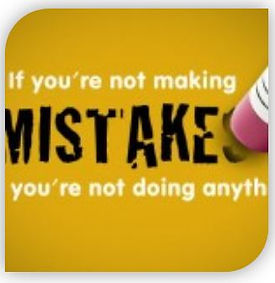
Writing a dissertation presents an unparalleled opportunity to hone various professional skills—including how to receive feedback skillfully. For example, before getting huffy or depressed about requested rewrites, keep the big perspective, including an appreciation for your professors' roles as teachers as well as gatekeepers.
In addition to opening yourself to simply listening to others, open yourself up to their influence in ways that stimulate your intellectual and personal growth. Jettison any notions that your intelligence or talents are fixed. Embrace the possibilities for growth.
For example, one way to do this is to reframe criticism of your work. Rather than take feedback as a sign that you are an intellectual fraud, accept it as a chance to improve your writing skills. In your research and writing, instead of aiming to "be good," aim for "getting better," advocates Halvorson.
Keeping a "get better" or "growth mindset" lowers your anxiety and allows you to maintain a more positive attitude—which in turn will broaden your perspective and build your resources for greater success with the next draft.
Find more examples in the highly recommended book, Mindset: The New Psychology of Success, by Dr. Carol Dweck (who, not so coincidentally, was Halvorson's dissertation chair).
HABIT 6: SYNERGIZE—COLLABORATE FOR SUCCESS
Synergy refers to creative cooperation, a critical component in Covey's principled approach. Open interaction generates new insights due to intra-group differences.
While you are the sole author of your dissertation, opportunities for synergy still abound. You may discover, for example, that the committee member or a colleague who knows the least about your field asks the most mind-opening questions.
Participants in dissertation writing groups and those with a dissertation buddy consistently report that working with peers offers far more than mere moral support. It also creates the opportunity for synergy when the group includes students with varied backgrounds. The group serves as a veritable talent pool that each member can access for help with theory, methods, writing, and so on.
Sharing feedback in a safe environment also allows each member to develop broader perspectives and enhanced writing and speaking skills that will improve final dissertation content and defense presentation. That means less rewriting and less time until graduation day.
HABIT 7: SHARPEN THE SAW—AND TAKE GENTLE CARE OF YOU
How much time and energy do you invest in caring for your own greatest asset, namely you?
Covey's recommendation for a balanced self-renewal program in the four areas of your life (physical, social/emotional, mental, and spiritual) gets two thumbs up from positive psychology researchers and practitioners.
Self-care also turns out to influence your ability to self-regulate, the foundation of Habit 3. Without self-control, ever-present distractions—from Internet links to domestic duties—can easily send you down a rabbit hole from which you may not emerge for hours.
Surprisingly, eating well, exercising regularly, sleeping, and meditating can all boost your ability to stick to your plan, according to willpower expert Kelly McGonigal. In other words, taking time out for self-care will make you more productive in the long run.
Spending time in nature, exercising, and connecting with others also contribute to your well-being, according to Covey and scientists. As you weave positive emotions into your day from such activities, you create an upward spiral that enhances productivity and health on multiple dimensions, UNC positive psychologist Barbara Fredrickson has asserted.
"IT'S ALL ABOUT THE PRACTICE"
Which of the above success habits do you most need to cultivate to rev up your work on your dissertation? You may wish to print this, post it, and put a check mark next to one or two that you can focus on for now, then move on to the next.
A caveat is in order: Trying to start multiple habits simultaneously can backfire by overtaxing your willpower reserves, so focus on just one or two at a time. Chart your progress. I invite you to share your experiences with me. Keep in mind these words from Aristotle:
"We are what we repeatedly do. Excellence, then, is not an act, but a habit."
"It's all about the practice," my coaching colleague Steve Coxsey wisely reminds me. Developing the above seven habits can be a powerful way to finish your dissertation as well as other projects that matter to you—and note that word "develop." A new habit takes time and effort—and these are worth it. Any time you backslide, resist the urge to throw in the towel. Just start again. Rely on supportive friends. Consider getting a coach—they specialize in helping make new habits stick.
"Good habits are worth being fanatical about," asserted John Irving, who may be the only author to have won both the National Book Award (The World According to Garp) and an Academy Award (The Cider House Rules). These seven habits, well supported by research and expert opinion, rank as some of the most important ones you could ever possess, and their value will multiply over time.
With well-aimed persistence, you will become not just a highly effective person, but also a proud doctor in your field.
References/Recommended Reading:.
Covey, Steven. The 7 Habits of Highly Effective People
Dweck, Carol. Mindset: The New Psychology of Success
Grant, Adam. Give and Take: A Revolutionary Approach to Success
Halvorson, Heidi Grant. Succeed: How We Can Reach Our Goals
McGonigal, Kelly. The Willpower Instinct
Fredrickson, Barbara. Positivity
Weed out bad advisors, boost job prospects, write more, and other dissertation tips | Issue 230
In under 8 minutes, discover how some universities are canning bad advisors and boosting job prospects for their PhDs.
Also find tips for writing more, beating procrastination, unleashing your inner genius, and landing a job in the same city as your sweetheart.

Time to Weed Out Bad Dissertation Chairs
Some professors should never be allowed to supervise a dissertation, as too many ABDs know. They wreak havoc in students' lives without any consequences for themselves. Meanwhile, their competent peers who shepherd doctoral candidates to the finish line in a kindly, timely manner may get little or no credit from their departments.
A group of eight Australian universities has forged a strong stand on the issue of advisor quality. Their assessment procedure weeds out the bad apples while retaining the good ones. Professors get rewarded for timely completions and successful rescues of would-be dropouts and penalized for those who drop out due to dissatisfaction with their supervisor.
Furthermore, these same universities require training and registration of doctoral supervisors. These measures have led to an eight percent increase in timely completions, research finds. Keeping score not only helps students but also allows faculty objective data for their own performance reviews.
When will U.S. institutions take note? Share this with the graduate school dean at your university.
Do We Need PhD Job Fairs?
"Yes!" asserts Leonard Cassuto, frequent Chronicle of Higher Education columnist on graduate education. Universities and colleges routinely plan career fairs that bring employers to campus for undergraduates. Given the dismal academic hiring scene, it's about time they do it for their graduate students as well, he argues.
"For years, faculty and graduate students in most fields disdained work outside the university walls," writes Cassuto, a Fordham professor, which led outsiders to ignore the ivy tower. "We have to forge ties with them now. We can't afford to wait for them to come to us," he concludes.
Read his entire column here—and don't skip the readers' valuable comments. For more, see Cassuto's book, The Graduate School Mess: What Caused It and How We Can Fix It. Better yet, give the Cassuto article and book to your chair and dean. Then start negotiating for a PhD job fair at your institution.

Lean the Secrets of Prolific Academic Writers
Stop struggling to adopt someone else's dissertation writing habits. It's time to be yourself.
Check out Air & Light & Time & Space: How Successful Academics Write. In her new book, award-winning scholar Helen Sword kills the myth of the "one-size-fits-all" model through fascinating interviews with highly productive academic writers. You will be amazed at the diverse ways in which academic writing actually gets done.
An astute observer, Sword identifies four important foundations for the academic writer—behavioral, artisanal, social, and emotional habits. Diagnose your developmental needs with Sword's free assessment here . Struggling to make writing a habit? Master the art of writing? Connect with other writers? Cope with emotions? You can improve.
Fortunately, each chapter includes "things to try" and excellent resources so you can create your own best practices. (By the way, Sword notes that women doctoral candidates are among those who express the most frustration with the writing process.)
For more ways to enhance your verbal fitness, consult her prior books, Stylish Academic Writingand The Writer's Diet. Get immediate feedback on how "flabby or fit" your prose is by entering a sample here.
Conquer Procrastination with 10 Quick Tips
Stop delaying dissertating by implementing science-backed tips from Forbes contributor Vanessa Older.
1. Pick your poison, i.e., focus on just one thing you've put off.
2. Start today—that means now.
3. Try the Five-Minute Miracle: Spend five minutes on it-and notice what happens.
4. Do a Power Hour: Dedicate distraction-free twenty-minute chunks to it.
5. Kill it with kindness: Forgive yourself for past procrastination and get back on the wagon.
Wait—that's only five. Find the next five here.
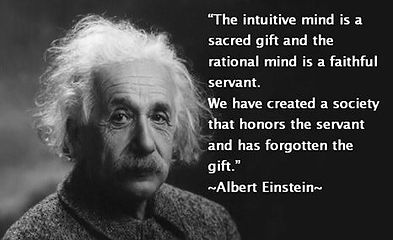
Stop Dismissing Your Genius Thoughts
Who comes to mind when you think of geniuses? Einstein? Picasso? Tolstoy? Someone in your discipline? What about you?
The only thing standing between you and genius status is your tendency to dismiss the strange or weird ideas that pop in your head—those freaky ideas that scare us—but attract a genius's curiosity.
According to the experts at The School of Life, most of us are afraid of being seen as odd, so we let those brilliant, original thoughts slip away. . . only to be leveraged by someone else.
Why settle for mediocrity when you could be great? Follow the path at YouTube in How To Be a Genius.
How Two ABD (then PhD) Lovebirds Snagged Jobs in Same Location
It's tough enough for one aspiring academic to find a position. Now imagine how much harder it is to find two jobs—and in the same location. That's the challenge for doctoral students who marry another student. When your partner is in the same field and graduating at the same time, well, the odds become miniscule.
That was the case of Chandani Patel and Brady Smith, who finally ended up together in New York City. But that was only after one of them spent four exhausting years in the job market—enduring 30 interviews and six campus visits. Read the happy couple's advice in Inside Higher Ed.
Major takeaway: Don't spend all your time huddled over your dissertation, isolated in your study. Develop various marketable skills. Be prepared to think beyond a tenure-track position. Now that's good advice for any doctoral candidate.
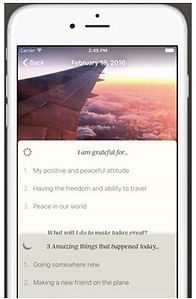
App of the Month: Five Minutes a Day to Enhance Productivity, Positivity
Want more energy and focus to speed you to the finish line? In just five minutes a day, you can find more energy and focus by using a simple journaling app based on positive psychology principles.
By jotting down your gratitudes, affirmations, and uplifting experiences each day, you can keep the productivity and positivity flowing. Gentle daily reminders will help make this a most productive habit. Endorsed by Tim Ferriss and Leo Babuta, the Five-Minute Journal garners top ratings as an app (iOS and android, $4.99) and as a print book ($18.88) available from Amazon.
Use it each morning to identify three good things in your life, three top important outcomes for the day, and your strengths and talents. In the evening, reflect on three amazing experiences and add an inspiring photo. [It's my favorite app after Lexulous, by the way.] Daily notifications help you cultivate the journaling habit that can rewire your brain for success and happiness.
Editor's note: Discover more ways to increase your happiness in the free course, "The Science of Happiness," offered by two Berkeley psychologists via edX, a recognized provider of quality internet-based college courses.
The ABD Ten Commandments | Issue 229
In this issue: Follow the ABD 10 Commandments to get that dissertation out the door faster! [Est. reading time under 5 minutes.]
Need more support? Apply for your own coach. Finish faster and enjoy the ride.

By Gayle Scroggs, Ph.D., P.C.C.
Are you stressed out about finishing your dissertation? Do you spend time beating yourself up over it? Do you waste time you could be writing? Are you lost in the process?
Turn the situation around fast by cultivating ten habits proven to turn dissertation stress into dissertation success. Let's call them the Ten Commandments for ABDs.
You already know the gamut of dissertation self-sabotage, i.e., the thoughts and actions that keep you stuck. Now try the antidotes that will catapult you forward.
These ten prescriptions emerge from my application of positive psychology principles in over a dozen years of coaching all kinds of doctoral students, from educators to historians, from Ivy League colleges to online universities, from Canada to South Africa, from youthful scholars to senior citizens.
You will notice that each commandment offers a positive strategy to counter a negative habit shared by many dissertators. Focus on the ones that resonate with your maladaptive tendencies.
Furthermore, these have all been shown to be universally effective. Solid research and client successes back them up. Test them yourself. Notice how your new habits create an upward spiral of productivity and positivity.
What others might you add? We invite you to share your personal ABD commandments with us by sending to the editor at gayle@mcpcoach.com.
I. THOU SHALT GIVE YOURSELF PERMISSION TO MAKE MISTAKES.
Mistakes are an inevitable part of learning. If you already knew everything, you would not be in school. Don't try to be the perfect writer or researcher. Instead strive to be a good learner.
II. THOU SHALT REMEMBER IT IS JUST A DISSERTATION, NOT YOUR MAGNUM OPUS.
Most dissertations have very small readership. They don't win Nobel Prizes or create world peace. Consider the dissertation experience as necessary practice for the significant work you will do later.
III. THOU SHALT CARE FOR YOUR BODY WITH GOOD SLEEP, NUTRITION, AND EXERCISE.
Your body is the tool that does the work; after all your brain is part of your body. For optimal performance, this magnificent organism requires regular maintenance. Don't try to run on empty.
IV. THOU SHALT TRUST THAT YOU CAN LEARN WHAT YOU NEED TO KNOW.
Everything necessary for finishing your dissertation can be learned. If you got this far, you already have the brains to finish. Now put them to work learning what's left.
V. THOU SHALT BE AWARE THAT SUCCESSFUL PEOPLE ASK FOR THE RESOURCES AND SUPPORT THEY NEED.
You don't get to see other folks' entire process, just the final product. No one achieves anything big without input from others. Who could help you rev up your dissertation pace?
VI. THOU SHALT BE GRATEFUL FOR YOUR ACADEMIC OPPORTUNITY—MANY ENVY YOU.
Doubt this? Check the news and identify people that would prefer being in your shoes, fretting about lit reviews and methods, rather than trying desperately to survive.
VII. THOU SHALT SAY "YES" TO WHAT TRULY MATTERS TO YOU AND SAY "NO" TO THE REST.
Life is a lot like a buffet meal: You can only fit so much on your plate, so pick carefully. Make "no, thanks, I'm working on my dissertation" your personal mantra.
VIII. THOU SHALT NOT FORGET WHY YOU ARE DOING THIS IN THE FIRST PLACE.
You committed yourself to this for a reason: What was it? How will you feel if you quit now?
IX. THOU SHALT NOT MAKE EXCUSES.
No one was ever awarded a doctorate for having the best excuse for not finishing. Use your creativity to make progress, not to make rationalizations that no one wants to hear anyway.
X. THOU SHALT MAKE TIME FOR SOME FUN ALONG THE WAY.
Successful people enjoy their work and their hobbies, including music, art, and sports. Positive emotions are the "tiny engines of flourishing," so make room for them. Unnecessary suffering is not a prelude to success.
P.S. Also recognize that finishing your doctorate will not make you a better person—but how you go about it just might.
Break the Dissertation Anxiety-Procrastination Cycle Forever | Issue 228
In this issue: Learn to conquer dissertation anxiety and procrastination forever. Need more support? Apply for your own coach. Finish faster with less angst. [Estimated reading time 5 minutes]
Excerpted from Breaking the Vicious Circle by Tomas Walter
Adapted with permission for the ABD Survival Guide by Gayle Scroggs, Ph.D., Editor
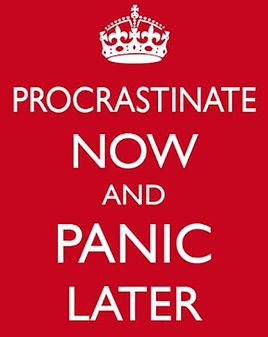
Procrastination has been called the number one problem in academia by researcher Tim Pychyl, Ph.D. Although it appears in various guises, many forms stem from just one common cause. Can you name it?
It's anxiety.
Have you ever felt a sense of doom cloud your dissertation quest? Or experienced fear, nerves, worry, concern, or doubt? Or perhaps, in imagining whatmight happen on the road to your hooding ceremony, you felt a sense of queasiness?
If so, you've suffered from dissertation anxiety.
In dissertators, as in others, anxiety symptoms get triggered by various things—fear of failure, fear of success, perfectionism, unrealistic standards, and so on.
The bad news is that some individuals are especially prone to anxiety—and thus to procrastination. Are you one of them? If so, read on to understand how it provokes suffering and delay and how you can overcome it.
Why You Procrastinate
Anxiety-prone individuals are more likely to be burdened by irrational assumptions—unfounded beliefs that instigate the pernicious anxiety-procrastination cycle. For example, a doctoral candidate may worry that his advisor will read his chapter drafts and conclude that he is totally unfit for the program (although the advisor has never communicated anything of the sort). So he finds excuses to put off writing or sending the advisor any drafts.
Another might be afraid of failing to live up to her own performance—and thus constantly invents shallow excuses to delay dissertating.
These and other procrastinating ABDs make the common mistake of attempting to cope with dissertation anxiety through procrastination. However, it turns out to be undeniably ineffective as the unfinished dissertation continues to generate feelings of dread and/or shame, creating yet more emotional and productivity drag.
An effective solution requires understanding three common mental habits that underlie anxiety-provoked procrastination behaviors: (1) low frustration tolerance, (2) catastrophizing, and (3) an excessive need for control.
.
Low Frustration Tolerance: "I can't take this anymore!"
Forced out of their comfort zone by the task at hand, anxiety-prone students may balk at putting in the necessary effort. By embracing the "I can't take it anymore" mentality, they suspend any activity related to their project, thereby finding relief, albeit temporary, from any dissertation-associated anxiety.
While this behavior may resemble a childish tantrum, we should not be too quick to judge ourselves or others. Called "low frustration tolerance" by experts, this tendency reflects an unwillingness to tolerate even the smallest amount of distress—which is as inevitable on the dissertation journey as it is on any path to meaningful success.

This hedonistic attitude explains why some people quit working the minute they encounter an obstacle, thinking, "I can't do this! It's too hard!" This mindset may also elicit angry outbursts, high distress levels, and considerable restlessness.
How can you overcome low frustration tolerance?
First, acknowledge that frustration is a normal reaction when one's programmed need for short-term rewards is not met. Remember you are now an adult. You can combat the urge to throw a hissy fit by committing to developing an increased frustration tolerance in return for the greater rewards of reaching your goal of becoming a doctor. Accept that the only route to a doctorate involves some uncomfortable feelings.
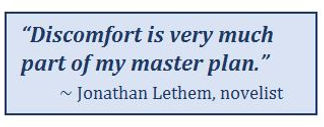
Next, pay close attention to how you talk to yourself, especially just as you are tempted to give up in frustration. Notice the negative self-talk that convinces you to stop dissertating (even if you've only been working for ten minutes).
Becoming mindful of the procrastination-inducing thoughts allows you to acknowledge them—and then let them go.
You do not have to obey every thought that arises! Strive to talk to yourself as you would to a struggling friend, i.e., with gentleness and kindness.
You may wish to try this simple, proven strategy: (1) Write down the negative thoughts (e.g., "I hate this," "This is exhausting," "I'm not cut out for this") that break your work flow. (2) Challenge these irrational, self-sabotaging assumptions by asking: How does this belief help me? (3) Now write down constructive steps you can take in your own, long-term self-interest.
Notice how this transforms your angst into progress by leveraging disruptive negative thoughts. No longer a reason to delay, they serve as prompts to resume your dissertation. Here's an example:
"My inner critic says my writing sucks. That belief does not help me finish and makes me want to quit—hardly a helpful thought. Instead, I will immediately focus on the current page and write three more paragraphs. I can defer editing until later."
In other words, feel the frustration and dissertate anyway.
The choice is yours: You can either tolerate the standard amount of tension associated with any unpleasant but necessary activity for your dissertation, or you can choose to "rage quit" whenever you find the frustration "unbearable."
EXERCISE: BECOME MINDFUL OF PROCRASTINATION TRIGGERS
The next time you feel tempted to procrastinate, stop and sit still while remaining comfortable yet alert.
Read the following questions, then close your eyes and answer them.
• What thoughts are going through your mind right now? Are they trying to convince you to put aside your dissertation and do something easier or more fun? Acknowledge them without criticism or trying to change them.
• What emotions are you experiencing? Do you feel anxious, frustrated, tense, bored, or other? Again, notice them without trying to change anything.
• What bodily sensations are there? As above, just notice.
Now open your eyes and decide what you will do in your own long-term best interest. Write down your intention.
Catastrophizing: Making Mountains out of Molehills
Anxious people catastrophize a lot. For such an ABD, even the smallest disruption (e.g., not having a needed reference on hand) can quickly erupt into crisis—and a justification to put off dissertating. They further exacerbate their anxiety by often saddling themselves impossible, self-imposed standards.
By making mountains out of molehills, these anxious folks convert even small hassles or obstacles into dramatic, even tragic, events that allow them to rationalize delays. As victims of some awful situation, they feel entitled to discontinue working.
Probably the saddest part here is that these procrastinators often fail to realize how ridiculous and exaggerated their excuses sound to others. They believe their self-fabricated catastrophic interpretations and refuse to take responsibility for their procrastination.
How can you stop catastrophizing?
One good way is to imagine the worst thing that could happen. . . and then something even worse than that. For Albert Ellis, founder of Rational Emotive Therapy, it was "to slowly die by being cut to pieces with a sharp blade." He then realized that the pain intensity would depend on a variety of factors. Thus any injury he imagined could be worse. Similarly, any harm you might imagine could be made more severe.
As you can see, the worst thing has not happened and will not happen. That missing so-called critical resource need not stymie you. When you realize that a situation is only as catastrophic as you interpret it, you'll be able to unmask procrastination tendencies and get back on track to your goal.
The Excessive Need for Control: A Hyper-Focus on the Negatives
Experts warn that an excessive desire to control every aspect of our life can lead to procrastination tendencies. Those who obsess over gaining full control develop a hyper-focus on the negatives. For them, apotential adverse outcome represents not merely an unpleasant possibility but a serious threat to their integrity, performance, status, or similar concept.
You could spend time and energy envisioning an infinite number of ways in which your dissertation proposal and research might fail—and waste undue effort attempting to devise a plan to forestall every catastrophic scenario. There's a downside to this: You'll lose your peace of mind and push back your graduation date.
How can you get over your obsession for control?
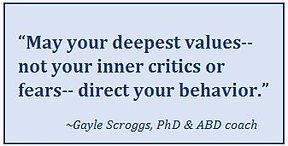
The hard truth about life is that none of us can always have full control over our behavior or our outcomes. There are simply too many other influencing factors.
This, however, is no reason to admit defeat and retreat from challenges that give life meaning. Sometimes being average and having less-than-perfect results is the best you can do under the given circumstances—and that is perfectly okay. Remind yourself that very few successful doctoral candidates turned in a masterpiece.
Whenever you find yourself dwelling on potential disaster, stop immediately. Invite your brain to get off its default negative neural pathways and start retraining it. Do this by intentionally searching for at least three potential positive outcomes from doing your work. You'll discover that not having 100% control over your life or work does not portend disaster. Everything will not fall apart.
Final tip: Print this and post it where you will see it the next time you are tempted to procrastinate. We bet you will get back on track and finish your dissertation sooner. If you need intensive help with procrastination, consult a coach or therapist.
MORE PROCRASTINATION RESOURCES
Pychyl, Timothy A. Solving the Procrastination Puzzle: A Concise Guide to Strategies for Change
Find Ben Dean's free in-depth interview with Dr. Pychyl here.
Urban, Tim. Inside the Mind of a Master Procrastinator (TED talk)
Walter, Tomas. Breaking the Vicious Circle: How to Beat Procrastination, Skyrocket Your Productivity, and Finally Get Things Done
Skip Format Hassles and Enjoy Dumb Dissertations and Summer ABD Novels | Issue 227
In under seven minutes find out how to save dissertation formatting headaches, avoid tempting websites, get the resource you need most, and laugh. Summer bonus: ABD novels for light reading.
Need more? Apply for your own coach and finish faster with more fun.

STOP WASTING VALUABLE TIME FORMATTING YOUR DISSERTATION
Graduate students who grumble about the intricacies of APA or MLA formatting for their manuscripts haven't heard about formatting software for academic papers. For less than the price of a few edited pages, you can download PERRLA for Windows or MAC to take care of those pesky details. Highly recommended by our dissertation clients, it can be found at perrla.com.
Note: We invite you to share your favorite dissertation apps and software. Send to the Editor gayle@mcpcoach.com.
STAY FOCUSED: AUTO BLOCK WEB DISTRACTIONS
If social media, gaming, or other websites are sucking your work time, it's time to install Blocksite, a Google Chrome browser extension that will deny your device access to your designated list of distracting sites. The block can be 24:7, or you can set up your own schedule for each day of the week.
When you try to access one of your taboo sites, Blocksite immediately redirects you by default to the Google home page, but you can boost your productivity by changing it to your dissertation task page. What—no task page? Set one up using the highly rated GTask or similar list app.
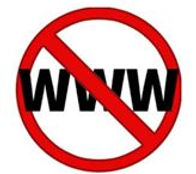
WHAT ABDS MOST NEED TO FINISH MAY SURPRISE YOU
Why does progress on your dissertation elude you? Most of us invent intellectual, dramatic, or existential explanations. In contrast, the highly acclaimed London-based School of Life offers a memorable, fact-based answer in under three minutes in their video, Why You Need an Early Night.
To muster the resilience and courage for surmounting daily hurdles, you need more sleep, it explains. So turn off your devices and hit the hay. (Pssst: Don't miss their other entertaining, well-founded self-help video advice, e.g., How Not to Rant, The Importance of Flattery, Why Tiny Things about Our Partners Drive Us Mad, etc. Who knew wisdom could be distilled into such short takes?)
HOW DUMB IS YOUR DISSERTATION? CHECK THESE OUT
Energize yourself with some laughter by checking out tickld.com's twist on the dissertation elevator pitch. Can you top these?
-
People sometimes think about animals as if they're people. People like those animals a little more than regular animals. Except when they don't. I can't believe they gave me a PhD. ~ too_many_mangos
-
We can take random pieces of bacterial DNA from beaver poop and put them into other bacteria to discover new things, like how to break wood down into biofuels. Yes, I had to dissect dead beavers and handle their poop. ~ Geneius
-
Sand washes away, don't build important stuff on it. ~ Zoidy
Read the rest here, then write your own—but we suggest you refrain from sharing with funding sources.

YOUR SUMMER READING: ABD ROMANCE AND MYSTERY
Relax in the hammock or beach chair with the adventures of two fictional doctoral students whose challenges just might outweigh yours.
ABD: An Academic Mystery by Shirley Kirilenko. When Jan McCann, a PhD student in German at Willwood, responds to her dissertation advisor's urgent call by rushing to his office, she finds him dead. The coroner blames strychnine in the Mozartkugel Jan had given him. Jan realizes she's been framed—but how will she prove her innocence and finish her degree before time runs out?
The Academic Bride: Billionaire Marriage Brokers, Book One by Lucy McConnell. When anthropology doctoral student Janel Fendrick loses the funding for her Mayan excavation, a marriage broker offers her a surprising proposal—and a groom with oodles of money. Will Janel get more than she bargained for? Find out for free here on Amazon Kindle.
Finish Your Dissertation in Two Awesome Hours | Issue 226
How did it get so late so soon? - Doctor Suess
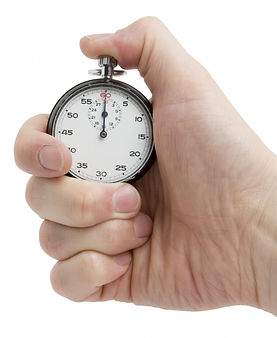
By Gayle Scroggs, PhD, PCC
Are you struggling to finish your dissertation?
Abandon ideas for marathon sessions that wreak havoc with the rest of your commitments. That's a surefire way to burn yourself out before you hit "send." That kind of hasty work will probably not pass muster with your advisor so you'll end up doing extra rewrites later.
You can do it right the first time and at a sustainable pace. How?
First, you need to find your two peak hours for mental work each day—and then protect them. Don't waste them on emails or routine tasks—invest those two hours in dissertation writing. Even if you can't do this every single day, follow the practice explained below on your dissertation days.
This advice follows in Two Awesome Hours: Science-Based Strategies to Harness Your Best Time and Get Your Most Important Work Done. As research director at New York's NeuroLeadership Institute, author Josh Davis, Ph.D., buttresses his recommendations with plenty of brain science.
"Every day is a battle of priorities," Davis observes. Every task saps mental energy—and some are very draining. That means you can't bring your A game to every task. But you can carve out a couple of awesome hours of productivity by choosing which tasks most merit your best mental energy.
In short, you've got to get more strategic about where you invest your mental energy. You already know it's smart to be intentional about how you spend your money. But are you being intentional about how you spend the 24 hours you have each day?
To set up the right conditions, it helps first to understand what kinds of tasks drain your brain.
I've got some bad news for you: Exercising willpower sucks your brain's energy. When you resist the blueberry muffin while ordering your latte or pointedly ignore your iPhone ping, you are exercising self-control. "Engaging in self-control tends to wear out our self-control," Davis notes.
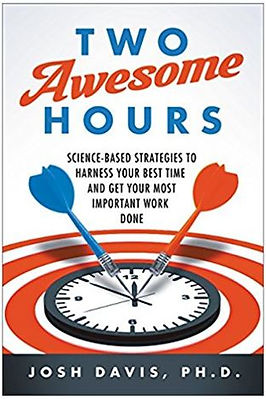
Willpower often acts like a muscle—a metaphor offered by researcher Roy Baumeister, Ph.D.: It gets depleted with use and replenished with rest, e.g., a good night's sleep.
Consider all the ways in which you exercise willpower in a single day: sticking to your diet, holding your tongue when angry, forcing yourself to pay attention when bored, resisting an impulse buy at the checkout counter, and so on. Any time you force yourself to do something you do not want to do or force yourself to refrain from doing something you want to do, you're burning up mental energy.
Why does this matter to a dissertation writer?
Surprisingly, it turns out that willpower draws on the same mental energy reservoir you need for doing heavy cognitive lifting—for evaluating, analyzing, synthesizing, hypothesizing, and all those other clever things a dissertating mind must do. Hard thinking and self-control behaviors are all powered by the executive function areas of your cerebral cortex.
Alas, it turns out that willpower is not the only mental energy thief. There's a much more insidious one that most of us underrate.
How Decisions Can Stall Your Dissertation
Cornell researchers found that people think they make about 15 food-related decisions daily when the real number is more like 200. Internet sources claim the average adult makes about 35,000 decisions per day. Choice can be a good thing—but there is a cost involved.
Just making simple, everyday decisions—about food or anything else—drains your mental resources, making it harder to do your best work.
Chances are that you underestimate how much of your daily supply of mental energy goes to making typical decisions, e.g., what to wear, what to eat, what to do, when to do it, how to say something, who to spend time with, etc. Checking your email has the potential to sap oodles of your precious reserves as you decide whether and how to respond, whether to archive or delete, and so on.
How much of that energy would be better invested in finishing your doctorate?
Avoid the Mental Energy Vampires
You can begin to identify the tasks that drain your energy by noting how spent you feel after various activities. The energy toll for any given task varies from person to person.
For example, if you can proofread on autopilot, that means you are not using energy as much as someone who needs to pay special attention. [Personally, I print my written work and read it aloud to catch missing or repeated words due to repeated editing tweaks. I need a break afterward!]
Davis cites these as examples of common activities that can cause mental fatigue: task-switching, networking, small talk, sitting still for hours, making cold calls, identifying errors and correcting them, planning or scheduling projects, and keeping track of deadlines.
While you can't avoid such tasks, you can choose when to do them. Keep in mind the muscle metaphor: Don't strain your willpower or executive functions with overuse.
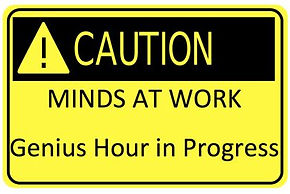
Become a Good Steward of Your Mental Energy
Applying Davis's approach to productivity, I offer you these four tips for avoiding mental fatigue to create the two awesome hours for writing your dissertation:
1. Do your dissertation work first thing in the morning. That means before your best energy has been depleted by exercising willpower and making decisions. No checking your email or any media first!
2. Categorize the tasks on your daily To Do list as "important decisions, creative," or "other." Schedule your non-peak time (after lunch? before dinner?) for the "other" tasks.
3. Limit your email time to one hour each afternoon. Then reflect on whether this change improved your ability to focus on your dissertation and other important tasks.
4. Make some decisions the night before a big day. Going to defend your proposal? Meet with your chair? Whatever the occasion, you can save some energy for the really important stuff by choosing what to wear, planning your meals, or laying out your agenda before hitting the hay.
First Aid for a Fatigued Mind
If you need a quick recharge, Davis suggests three ways to get back on track:
1. Breathe deeply and slowly.
2. Have a good laugh. [I watch a silly cat or baby YouTube video.]
3. Take a 10-minute nap.
When you invest your time mindfully, you avoid the perils of autopilot. By devoting two peak hours of brain time each day to your dissertation, you will assure yourself of that awesome degree you want.
Recommended Reading:
Josh Davis, Ph.D.
How doctoral students can find more time, snag jobs, write more, and rap more on the way to their PhD | Issue 225
In less than 8 minutes, discover how to find more time, snag a non-academic job, blast past writer's block, and decipher the proposal process. . . plus get updated on activism in dissertations, campuses, and the streets.
Need more? We are here for you—apply for your own coach if you want to finish faster and enjoy the ride.
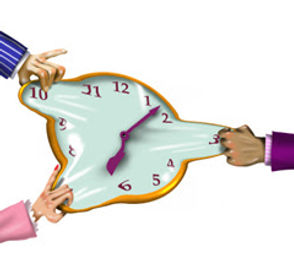
HOW TO FIND MORE TIME: APPLY THE FIVE D'S STRATEGY TO GET YOUR PH.D.
Think you don't have enough time to dissertate? Think again—but this time using the 5 D's. This update on the traditional 4-D time management model quickly shrinks a ginormous To Do list to more manageable size. Get out your academic and personal action lists and review each item. Decide which of these five D's you could best apply to create more time for your dissertation: Do, Delete, Delegate, Defer, or Diminish (the newest addition to the model).
Dyan Williams in her top-notch post describes and illustrates each "D" option. She also makes astute observations on how perfectionism, people-pleasing, and overachieving can get in the way of managing time effectively.
Editor's note: My ABD clients find it helpful to post the 5D list in a handy spot for applying to new tasks as they come up. Can you diminish the time spent on preparing lessons or meals? What about delegating formatting or laundry to paid services? What can you stop doing or postpone until after you finish? For peace of mind, keep deferred items in folders marked "Incubating" or "Someday/Maybe" and review these monthly.
CONSIDERING A NON-ACADEMIC JOB? BETTER READ THIS FIRST
Sarah Pike planned to teach college writing, earning a BA in communications and an MA in rhetoric along the way. But then she pushed the pause button while working on her doctorate to pursue unrelated jobs. Now she works in marketing—by choice—and shares her story plus tips in her post for The Muse, a resource-filled career website.
Pike clearly describes various transferrable skills from academia that you probably share but may not yet have identified. Follow her lead to create your own resume that will land you a decent job that you previously had no hopes of snagging. Here are just a few of the highly desirable skills you likely possess: doing research, public speaking, teaching, mentoring, planning events, increasing audience engagement, representing a brand in public settings, etc.
Don't forget, she stresses, to tailor each resume to the particulars of the job under consideration and to use your cover letter as a persuasive essay to make the case that your qualifications are highly relevant.
12 SIMPLE WAYS TO CONQUER WRITER'S BLOCK
The next time a blank page paralyzes you as you sit down to dissertate, try one of the twelve tips offered by Dora Farkas's blog post for Next Scientist, a website dedicated to helping PhD students stay motivated, graduate, and find a job in industry.
To get going, she recommends a writing support group, writing daily, writing first, writing about any aspect of your research, writing about the big picture, and writing an outline, among other things. You can read the complete annotated list here.
Editor's note: If none of those strategies work, consider getting your own coach.
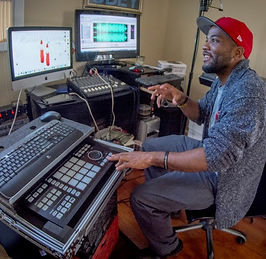
HOW MANY RAP SONGS DOES IT TAKE TO GET A PH.D.?
The answer is 34.
We know this because A. D. Carson made history at Clemson in February by successfully defending his dissertation—a 34-track rap album titled "Owning My Masters: The Rhetorics of Rhymes & Revolutions." His unusual dissertation explored racism, the rap community, and aspects of black lives through music and video.
A seasoned campus activist, Carson earned his degree from the department of rhetoric, communication, and information design, reports the Chronicle of Higher Education. "I realized that there were lots of people who were in attendance at the defense who were moved by the messages, the music, and the engagement in ways that I hadn't considered," Carson told CHE.
"The project, which has already been referenced publicly by such leading scholars in popular music culture as Mark Anthony Neal, explores complicated questions related to the art, criticism and knowledge production in the context of the ongoing problem of global racial and class hierarchies within and beyond the academy," his mentor and former hip-hop musician, Chenjerai Kumanyika commented to the Clemson Newsstand.
Who said academics had to be dull or irrelevant? Experience part of his work here and here on YouTube. The latter garnered more than 10,000 views and sparked community dialogue at Clemson—situated on a former plantation worked by slaves. Bravo, Dr. Carson!
FOR BEGINNING DISSERTATORS: A SIMPLE ROAD MAP TO YOUR PROPOSAL
Getting a dissertation underway can be a daunting task, but www.scribber.com makes it easier with a very simple roadmap. They offer the skinny on choosing a topic, writing a problem statement, and structuring your proposal. You can check for plagiarism and generate APA-style references for free at their site, though other services come with a fee.
Also check with your own university—they may offer roadmaps, tutorials, and timeline templates. You can also take a look at our most recent issue, "Want To Get Your Research Question Approved Fast?" in the Recent Issues section at www.abdsurvivalguide.com.
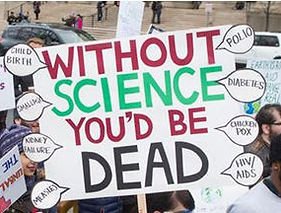
SIGNS OF THE TIMES: STREET ACTION AND NEGOTIATING DELAYS
Earth Day dawned gray and rainy but scientists, graduate students, and folks ready to aid and abet science turned out in force in Washington, D.C., and other major cities for the March for Science, reported the Washington Post.
Thousands marched in support of politics-free scientific investigation, more research funding, and an affirmation of the value of science, countering the anti-science voices in the current administration and Congress
Meanwhile, inaction has become the order of the day at Yale, where administrators have delayed negotiating terms with new graduate student teacher unions. Some of the unionizers claim that the college is stalling in the hope that Trump's eventual nominees to the National Labor Relations Board will quash the emerging graduate student unionization attempts, reports the CT Mirror. The Chronicle of Higher Education reports a similar situation at Harvard.
How are politics affecting you as a grad student? Let us know.
Want Your Research Questions Approved Fast? | Issue 224
Follow expert guidance on how to--and how not to--write a rock solid research question that will speed you to your doctorate. Need other dissertation advice? It’s in here! (Reading time: 6.5 minutes)
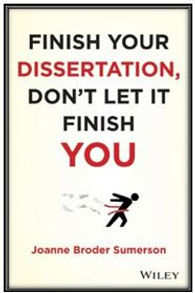
Dear ABD Survival Guide Reader,
Are you wandering about in the dissertation wilderness, anxious for clear signposts to the finish line? You would be well advised to consult a guidebook and map to get on track.
Joanne Broder Sumerson, Ph.D., is a particularly apt guide as she has shepherded countless students to a completed doctorate in her role as a research professor at St. Joseph's in Philadelphia. Her book, Finish Your Dissertation, Don't Let It Finish You!, serves as a trusted, step-by-step travel guide for doctoral researchers in the behavioral and social sciences with its exceptionally clear style and organization.
Some notable and unique sections of the book that you will find particularly helpful in speeding you to your degree include these:
• The "Anatomy of a Dissertation" table—personalize it to create your own outline and timeline
• A template to extract just the "juice" from articles you are reading—avoid overwhelm from "too much information" while getting a jump on your lit review
• How to survive the Institutional Review Board (IRB) process
• Chart on data collection strategies to help you through that maze
• A sample dissertation defense rubric that demystifies what your committee will evaluate at your defense so you can be well prepared
• Ideas for leveraging your dissertation later through presenting, publishing, or consulting
Dr. Broder Sumerson has particularly clear advice for those facing one of the most common early hurdles on the journey, namely, crafting your research question. With permission, we have excerpted her section about how to create a rock solid one that will guide you and get committee approval.
Wishing you beautiful questions and a speedy journey,
Gayle Scroggs, Ph.D., P.C.C.
Editor
"There are no right answers to wrong questions." - Ursula K. Le Guin
FEATURE ARTICLE: The Right—and Wrong—Way to Write a Rock Solid Dissertation Research Question
By Joanne Broder Sumerson, Ph.D.
Research Professor, St. Joseph's University, Philadelphia
[Excerpted with permission from Finish Your Dissertation, Don't Let It Finish You!]
The purpose of any research study is to answer the research questions so they must be clear, concise, measurable, and 100% blessed by the Committee.
The research questions need to be on the radar at all times since they drive the entire study. The literature review and methodology are directly linked to the research questions. The literature review includes the theoretical models and empirical data that either support or challenge the variables and how they will be measured. The methodology is created with the leading question: "What is the best way to answer these research questions?"
The research questions serve as the study's solid and sturdy foundation. Similar to a house with a weak foundation, the research questions need to be strong or the study will collapse. You would not want to build a school on top of a base shaped for a house, so every part of the study needs to be directly linked to the research questions.
The five chapters tell the long and drawn-out story about the study. Research questions and hypotheses typically do not appear until the Methodology chapter; therefore, create the research questions first and design the study around answering those questions. The research questions need to be worded clearly and precisely or quality of the study and final write-up will not be clear.
Strong, solid and precise research questions are—
-
Written concisely with as few words as possible.
-
Clear so that the readers know what the data attempt to answer.
-
Open-ended and rich, beginning with what or how and written so that they lead to unguided responses, even with quantitative data. Closed-ended questions that start with do or is can be answered by yes/no, are limited, and lack rigor.
-
Nonbiased and nondirectional; save your opinion for the hypothesis.
-
Contains words such as influence, contribute, impact, relate, and compare.
-
Avoid words such as cause, effect, or any presumptuous words (this is one of the understood rules in psychology). People are not predictable like machines.
-
Created for each variable.
-
Directly linked to the statistics used for the data analysis in order to answer the research question. . . . Write simple questions if you plan to use simple statistics; the more complex the question the harder the statistic.
-
100% blessed by each committee member.
Following are examples of strong research question stems as well as bad and good research questions. Remember that when more variables are added, a higher-level statistic will need to be applied for the analyses. These questions will be simple for the sake of the example.
Examples of Strong Research Question Stems
-
How does _____ influence _____?
-
What is the relationship between ____ and _____?
-
How does _____ compare to _____ in _____?
-
What are the trends in _____ since _____?
Examples of Bad Research Questions
-
How does Facebook impact relationships?
-
Which alcohol treatment group (full intervention, partial intervention, no intervention) is the best?
-
Do pets help with depression?
-
What happens when you mix personality, motivation, learning strategies, and the SAT with grades?
-
Do Millennials post more often on Facebook and Twitter than Baby Boomers?
Examples of Good Research Questions
-
How does the number of Facebook postings per day impact relationship fidelity rate?
-
How do the alcohol treatment groups (full intervention, partial intervention, no intervention) compare in their sobriety rates?
-
What is the relationship between pet ownership (pet owners and non-pet owners) and depression levels?
-
How do personality traits, motivation levels, the use of learning strategies, and SAT score relate to academic achievement as measured by GPA?
-
How do generation groups compare in the number of Facebook and Twitter posts per day?
Good research questions clearly and specifically tell us what we want to know. They will keep us focused as we conduct our study, do the research, and write the five chapters.

Joanne Broder Sumerson, Ph.D., is an affiliate research professor at St. Joseph's University in Philadelphia, a seasoned researcher, program evaluator, thesis advisor, consultant, and past Research Review Committee Chair. She has created the Psychology Today blog Research Notes and cofounded the new APA journal Psychology of Popular Media Culture, featuring empirically based articles on how popular culture and general media influence individual, group, and system behavior. Dr. Broder Sumerson is very passionate and committed to bridging the gap between research and practice and serves as a consultant to a variety of public and private organizations.
Sleep Your Way to Your Doctorate | Issue 223
Dissertating while sleepless leads to procrastination, moodiness, and other undesirable effects. You are probably sleep deprived—learn the symptoms and the best proven strategies for getting more zzzz's. (Hint: Coffee is not on the list.)
Estimated reading time: Under 5 minutes if you are wide awake.

Want to Finish Your Dissertation? Then Go to Bed!
By Gayle Scroggs, PhD, PCC
"Sleep less, achieve less." ~ Tom Rath
Do you go to bed when you want to—but get up when you have to? Then keep reading.
Okay, you are like most people. However, it also suggests you are less likely to finish your dissertation when you hope to.
The reason? Sleep deprivation.
Over the last generation, cultural factors have provoked a major shift in sleep patterns. Nearly everyone fails to get enough sleep. The average adult gets about six hours of sleep instead of the seven to nine hours needed for optimal functioning. Some people claim not to need much sleep, but most of these "are just used to being sleep deprived," says Professor Steven Shaw at McGill University. "Cognitive inefficiency is normal for them." They don't know what they are missing, he adds.
Sleeplessness Can Lead to Death, Destruction, and Delays
Sleep scientists have been sounding the alarm. For example, investigators concluded that sleep deprivation played a significant role in the Three Mile Island nuclear accident, the Chernobyl nuclear meltdown, in the Exxon Valdez oil tanker grounding, and in the space shuttle Challenger explosion. Furthermore, over one million injuries and between 50,000 and 100,000 deaths each year result from preventable medical errors—many caused by interns whose schedules prevent adequate sleep. Drowsy drivers cause approximately 1 million crashes, 500,000 injuries, and 8,000 deaths each year in the U.S., making driving while sleepless as dangerous as drunk driving.
If you don't finish your dissertation on time, no one will die and nothing will explode—but you will be jeopardizing your own health and future. The evidence is clear: Performance deteriorates if you short yourself on sleep. It also leads to weight gain, lethargy, high blood pressure, poor response to stress, and uneven blood sugar regulation. Shaw gets blunt: "Sleep deprivation is bad."
7 Signs that You Need More Sleep
With inadequate sleep, cognitive performance and self-management worsen. Being mildly but chronically sleep deprived makes you more susceptible to stress, cravings, and temptation, writes Gallup strengths expert Tom Rath.
How many of these symptoms of sleep deprivation have you experienced lately?
• Poor attention
• Diminished ability to think effectively
• Impaired working memory and short-term memory
• Easily distracted by irrelevant stimuli
• Procrastination
• Weak resistance against temptations
• Greater difficulty in regulating your moods
Conclusion: Don't expect to do your best work if tired. You'll be challenged to do even "good enough" work.
How To Get More Zzz's
Now that you understand the importance of getting those seven-plus hours of sleep, how can you make it a habit?
1. Consider your sleep time sacred. Don't cut into it when you find yourself getting busy. Eliminate or shorten something else—say, television or social media. I'm surprised by how many doctoral students tell me they switch on the TV to relax after a long day—but admit that it only makes them groggy. You'd be better off skipping TV and getting to bed on time if you really want to re-energize yourself.
2. Figure out your bedtime. Find out what time you need to hit the hay in order to get up on time and then plan backward from your designated bedtime to create your unique bedtime routine. Allow yourself an hour or more to wind down. Avoid digital devices and televisions during this time—except to set an alarm to remind you to start getting ready for bed.
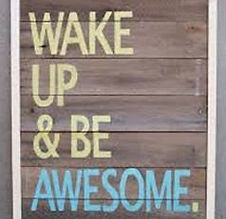
3. Create a personal bedtime routine that promotes sleepiness. Some things you may want to do to promote sleep: taking a warm bath or shower, meditating or quiet reading, turning down the heat, darkening the room. Some things to avoid: eating, exercising, TVs, digital devices. Download a screen darkening app, e.g., Twilight, if you are going to work on your computer or tablet—and then turn the device off at least an hour before bedtime. Keep in mind that yellow lights will stimulate wakefulness while blue lights do not. Did you know that caffeine has a half-life of six to nine hours and interferes with sensors that detect sleep need? Enjoy your morning joe and then abstain. Alternatives: Warm milk, which contains tryptophan, a sleep-inducing amino acid, and specially formulated herbal teas, e.g., Celestial Seasoning's Sleepytime Extra, or my personal favorite, Yogi BedtimeTea. [Both teas contain valerian and are for adults only.]
Note: If you wake up in the middle of the night, do not turn on your PC or TV—repeat your bedtime routine and get back in bed. This will train your brain to go to sleep.
4. Keep your bed and bedroom just for sleeping. Never use your bed for TV or studying. That way your bedroom and bed become conditioned stimuli that trigger sleepiness. Listen to a guided relaxation or nighttime meditation if desired, but no watching YouTube or Netflix or anything else. Avoid falling asleep on the sofa—get yourself into that bed.
5. Allow yourself to wake up naturally. Hitting the snooze button is counterproductive, Rath notes, as any further sleep is of poor quality at best. One complete sleep cycle is about 90 minutes—and interrupting it with an alarm can make you groggy for hours. Keep moving your bedtime back until you can walk up naturally, ready for your day. Then stick to those times as two bookends to your sleep module.
6. Consider what you are saying "yes" to instead of sleep. Ask yourself if this activity is worth delaying your dissertation. Then see if you can cut back on whatever is keeping you up or move it to another time slot in your day.
Taking your sleep seriously is part of taking your health and success seriously. How much do you want that doctorate? Then go to bed and wake up ready to be awesome!
13 Things You Must Give Up to Finish Your Dissertation | Issue 222
In Issue #222: Overcome the winter doldrums. Renew your energy and focus for your dissertation. Estimated reading time: 6 minutes
• Two Movies to Inspire Your Perseverance
• 13 Things You Must Give Up to Get Your Doctorate
• Become a "Slow Graduate Student"
• Featured Apps for Focus and Fun

These Oscar-Nominated Films Will Inspire Your Perseverance
Time to take a break from writing your dissertation? Let these two Best Picture nominees educate, entertain, and re-energize you. Then take a break from dissertating to watch the Oscars February 26. Warning: spoiler alerts follow.
Hidden Figures. Until the book and the movie Hidden Figures, who knew about women's crucial role in the success of the early US space program? In this historical film, three brilliant African-American women serve in a predominantly white male NASA, demonstrating passion and persistence in the face of pervasive racism and sexism.
With uncommon camaraderie, savvy and grace, these ground-breaking women brave challenge after challenge before receiving deserved acknowledgement from supervisors, peers, and astronauts. Their stories inspired a previous Oscar winner, Pharrell Williams, who contributed eight new songs for this top grossing film.
The film's afterward provides an update: Katherine Johnson (played by Taraji P. Henson), the human calculator for the first manned space flight trajectory, was presented with the Medal of Freedom by President Barack Obama in 2015. Mary Jackson (Janelle Monae) became NASA's first black woman engineer, and Dorothy Vaughan (Olivia Spenser) became NASA's first African American manager.
La La Land. Nominated for 14 Oscars, this neo-musical provides offers a charming escape with plenty of music and dancing to lift one's spirits. As the sweet romance between jazz pianist and would-be club owner Sebastian (Ryan Gosling) and aspiring actress Mia (Emma Stone) builds, they hold steadfast to their dreams—despite financial woes, doubting relatives, and perverse occupational gate-keepers. (Sound familiar?)
However, there's one critical element you won't witness but should know about: The actors dedicated three months to intensive pre-production dance and music rehearsals. For example, Gosling—a stranger to jazz piano before the film—exhibits an on-screen jazz piano virtuosity that may make you wonder who is really playing. It is indeed Gosling, who hit those keys three hours a day for three months before shooting. "It was a lot of practicing, but it was well worth it," he says.
Moral of the story? In life as in art, passion and persistence pay off in the end: Gosling and Stone garnered Oscar nominations, and their characters found fame and fortune.
Just for fun: Imagine making a film of your doctoral journey: Would your doctoral movie be more like Hidden Figures or La La Land? Would it be a drama, comedy, or other? Who would play you? Write your story line, build up to the successful climax—you at the hooding ceremony.
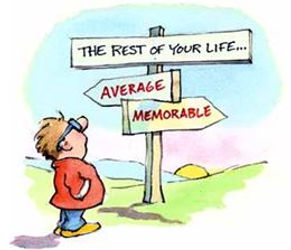
13 Things You Must Give Up to Finish Your Dissertation
"Somebody once told me the definition of hell: 'On your last day on earth, the person you became will meet the person you could have become.' —Anonymous"
So begins "13 Things You Must Give Up to Be Successful," a Medium" post that quickly went viral that we think applies to many doctoral students. In a tone both direct and unsparing, author Zdravko Cvijetic asserts that to make it, you need to ditch several common (and comfortable) habits of mind and behavior. Which of these are you hanging on to?
• An unhealthy lifestyle, a short-term mindset, playing small
• Your excuses, believing in a "magic bullet," perfectionism, multi-tasking
• Your need to control everything, saying "yes" to things that don't support your goal
• Toxic people, your need to be liked, escaping to social media and television
If these are costing you progress on your doctoral degree, resolve to overcome them and finish.
Tip: Struggling to give these up? Find a support group or dissertation coach since social support and accountability make all the difference in creating lasting change.
Become a Slow Graduate Student: More Otter and Less Beaver
Remember the "Slow Food" movement that took aim at the harm speed wreaks on our world and well-being? Now welcome the "Slow Academics" movement.
In her blog, Stanford graduate educator Chris Golde applies the principles of Berg and Seeber's The Slow Professor to graduate students. Slow academics value mindful doing, collegiality, and community. They prize reflection and depth over speed. They appreciate that trying to do more and more, faster and faster, impairs creativity and well-being.
For graduate students ready to slow the pace, she recommends these four practices:
• Do less. You cannot possibly do it all—take classes, teach, do research, write papers and proposals, study, attend seminars, participate in side projects, etc. Make peace with your limitations. Ditch perfectionism. Use newly found time to do nothing.
• Make Space to Be. Reserve unstructured time every week. Overplanning is overwhelming. Create your personal To Be list for the nonacademic stuff that makes you fully human, e.g., taking a walk, socializing, enjoying music or nature, playing, breathing, praying, daydreaming, and even thinking.
• Avoid the Overbusy Role. Avoid trying to impress others with the usual busy talk: "I am so behind, overworked, stressed out." Drop the "beaver narrative" in favor of the "otter narrative." While the former creatures are always crazy busy, the latter make room for play—working only as necessary.
• Cultivate Community. You need unstructured time to be with others—for making connections with others and discussing ideas. Communities provide support for risk-taking honesty about challenges and failures. Find a comfortable coffee lounge, show up reliably, and notice how a Slow Academic community takes root.
Slowing down means resisting ingrained American cultural values of work and busyness, Golde observes, so expect it to be challenging. And yes, it is okay to start slowly.

Featured Apps: Stay Focused, Stay Present, Have Fun
WATCH YOUR FOREST GROW: Addicted to your smart phone? The Forest app trains you to keep off your devices and stay engaged in the real world, be it dissertating or another activity. If you've been conditioned to jump at every ping, simply install the free Forest app and set the length of time you plan to spend phone-free.
With each use, the app plants a "seed" on your screen which begins to grow into mature tree or bush—so long as you don't give in. Otherwise your dear little plant withers and dies. Over time, you can populate a whole forest and have fun comparing your progress to users around the globe. [I just earned three adorable little trees while writing this on my laptop, phone free.—GS]
POMODORO ON STEROIDS: The Productivity Challenge Timer, a freemium app, works exceptionally well for those dead serious about getting stuff done. With its intuitive user interface and features, it earns top ratings from users and reviewers. As in the classic Pomodoro method, you start the timer, work for 25 minutes (one "Pomodoro"), then take a 5-minute break, or you can adjust the length of the modules. Unlike other Pomodoro apps, this one expects you to show up every day and to work without pausing until break time. The built-in tracking system adds motivation by ranking users according to demonstrated diligence. [As a new user, I am still working my way up from "Unrepentant Slacker."—GS]
If you could use help with feeling stressed, procrastination, lack of focus, poor habits, or any other inner or outer obstacle to finishing your dissertation, apply for a dissertation coach today. Positive psychology coaching works—finish faster and enjoy the journey.
Four Surprising Rules to Get Unstuck and Finish Your Dissertation Faster| Issue 221

By Melanie Sobocinski, Ph.D., and Gayle Scroggs, Ph.D.
What you do not know about how to chunk your dissertation writing is holding you back. Read our expert tips in less than five minutes... and save hours of slaving over your work.
Are you working on your dissertation in fits and starts? Does just thinking about it send you into avoidance mode?
Getting an entire dissertation done and out the door can loom as large as scaling the huge Pyramid of the Moon above. There you are, stuck at the base, futilely clawing at steep slopes because you haven't stumbled upon the staircase. "How does anyone ever get to the top?" you wonder.
Occasional dissertation overwhelm is normal. In those stressful moments, your self-protective brain wants to help. It searches for something—anything—easier than writing. It may nudge you to search for references, to check social media, or even bake a batch of brownies. But chronic overwhelm needs an intervention or you may never finish.
The key is convincing your brain that the dissertation is doable, if not easy. We will show you how to create the right-sized steps that will take you all the way to the top where you can claim your title of "Doctor."
Rule 1: Don't scare yourself by looking up at the top—just look down at a single step.
Imagine your calendar appointment reads simply "write dissertation." Your brain starts to panic and quickly converts the message into an open invitation to procrastinate.
That's because a dissertation is an outcome—and a huge one at that. Outcomes and deliverables are not actions, so your brain is suddenly forced to burn extra energy trying to compute what to do next. This provokes anxiety and queasiness—which in turn incites a desire to flee. . . that is, unless you pause and reframe this stress as your brain's desperate plea to break the giant outcome into smaller, feasible tasks.
As David Allen's productivity classic Getting Things Done explains, breaking up projects (any outcome with multiple steps) into discrete tasks is necessary for clarity and momentum--a technique you probably know as "chunking." You can chunk your dissertation by asking yourself, "What do I actually have to do to produce it?"
Some ABD's unthinkingly create their agenda around the dissertation milestones listed on the university's dissertation timeline template, e.g., Finalize Thesis Statement, Write Chapter One, Write Chapter Two (Lit Review), and so on. Those who are a little more savvy might fill a To Do list with smaller chunks, e.g., Read for Literature Review, Write conclusion to Chapter 2, or Revise Chapter 4.
Alas, even with this popular strategy, many students still flounder, disheartened by their lack of dissertation progress. They can't check off anything for weeks or months, as with the most frequently mentioned chunk, "Write Literature Review"—a ginormous undertaking. That's enough to send shivers through even the most well-trained academic brain.
If looking up at the whole mountain (or pyramid) makes you quake, just look down at your feet and take the next step. What's the next step? Figuring that out is also crucial.
Rule 2: Identify key preliminary steps before you start writing.
If you find yourself staring at a blank page, you probably overlooked the "invisible chunks" that should precede writing. Avoid this paralysis by completing these preliminary steps: (a) gather the necessary materials, (b) formulate your thoughts about the content you will write, and (c) devise work plan that includes multiple drafts.
Many ABDs get stuck trying to perform all three tasks simultaneously when they sit down to write—a sure-fire recipe for writer's block and procrastination. We've noticed that few graduate students explicitly think about their research and writing process, but those who do start blasting their way through.
When you get stuck, get some traction by asking yourself a few probing questions:
-
"Would mind mapping or brainstorming help me identify the relevant concepts?"
-
"Would writing an outline of major points help me create the necessary flow?"
-
"Would my time be better spent writing up summaries and notes of my reading?"
-
"Do I need to consult with a statistics expert to understand something here?"
-
"Is it time to talk to my advisor about the direction this is taking?"
Sequencing your chunks in the right order matters. Ask yourself what you need to do before you start to write. This is not wasted effort, for as Aristotle wrote, "Well begun is half done."
List all preliminary steps—including consultations and resourcing—on your agenda. Now you can settle into drafting your chapter and develop flow. Don't forget to note your post-draft steps, e.g., editing, on your list as well. Warning: Do not try to draft and edit at the same time.
Positive Psychology Tip: Savor Every Step
Take time to savor the satisfaction that comes with completing every step—including the necessary preliminary tasks. Give yourself permission to pat yourself on the back to acknowledge your growing ability to plan and your progress. Positivity fuels the momentum you need to ascend the doctoral pyramid.
Rule 3: Include "plan my work" as an action step.
Do you fail to credit yourself for the time you spend planning? This can lead one to skimp on planning. But high-performing professionals and academics understand that carving out a regular "executive planning session" is the bedrock of success.
Planning your work guarantees that you are focusing on the right task at the right time with the right tools. Conversely, proceeding haphazardly leads to dead ends and wasted effort. Here's what one academic coaching client discovered:
"I get it now—planning isn't something that's slowing me down from getting to my work; it's what makes my work go smoothly."
Rule 4: Right-size your tasks for peak performance.
If you suffer from dissertation anxiety, you are probably creating chunks that are too big, confusing actions with milestones and outcomes that take weeks or months to complete. Break things up into much smaller chunks—but not too small.
Aim to identify tasks doable in a single work session or at most a week.
Smaller items can offer unexpected benefits since crossing items off your To Do list sends your brain a jolt of dopamine—a reward that helps establish your new positive dissertation habit.
On the other hand, when paralysis creeps in, create even tinier tasks that take two minutes or less, e.g.:
1. Turn on computer.
2. Open current file.
3. Read first paragraph.
4. Respond to advisor's first comment.
[Yes, Melanie used a checklist exactly like this during her darkest dissertation writing days.]
What's the right size for a dissertation chunk? It depends on the individual. You will know you've got it when your underlying sense of uneasiness or befuddlement gives way to enthusiasm (or at least improved self-confidence) about getting started. You will know exactly what you need to do, and you will have all the resources in place to do it. The work has now lost its ability to scare or confuse you. You are good to go.
When you have identified a right-sized task, your motivation to complete the task outweighs your impulse to flee it.
One last caveat: While chunking keeps you from losing time to paralysis, also avoid losing time to perfectionism in chunking. (See Melanie's article in last month's ABDSG issue about the trade-off between chaos and perfectionism). There's no need to break your work into crumbs—simply work with the largest chunks that allow you consistent progress.
As you gain traction and confidence, you can gradually increase the size of your action steps.
Bonus Rule: Apply Chunking When You Get Stuck Anywhere, Anytime
Paying attention to process has its rewards. Once you master the nuances of chunking projects, you will reap extra benefits by applying it to any aspect of your life and work, such as these:
-
Grading papers more efficiently and effectively
-
Planning your first conference panel as moderator
-
Revving up your job search
-
Tackling your personal budget and income taxes
-
Planning a move or a wedding
You are now armed to conquer dissertation anxiety and procrastination. Use these chunking rules to build your own stairway to the top where you can proudly claim your doctoral degree. The only question remaining will be what pyramid will you scale next?
RECOMMENDED READING AND RESOURCES
"What Really Makes You Procrastinate—and Proven Ways to Get Back on Track," ABDSG #209, by Karen Forbes, Ph.D.
Getting Things Done: The Art of Stress-Free Productivity by David Allen.
Planning resources from Dr. Melanie Sobocinski at https://proforganizer.com/resources/
Image Credit: Stairs of the Pyramid of the Moon, Teotihuacan, Mexico. Image Source: This image was originally posted to Flickr by Jorge Lascar at http://flickr.com/photos/8721758@N06/4567207328. This file is licensed under the Creative Commons Attribution 2.0 Generic license.
MEET THE AUTHORS:
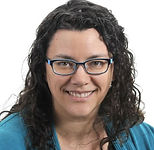
Melanie Sobocinski, Ph.D., C.M.C.
Trained in archaeology (which she calls "the art of interpreting broken buildings and 2000-year old clutter"), former professor and Certified MentorCoach Melanie Sobocinski now leads academic workshops on writing and time management. She also works with individual graduate students and faculty who want to find their desks and get more published. Contact Melanie help@proforganizer.com and discover more resources at www.proforganizer.com.
Gayle Scroggs, Ph.D., P.C.C. This year marks Gayle's fifth year at the helm of the All-But-Dissertation Survival Guide. Find her bio and links below.
5 Productivity Hacks for Finishing Your Dissertation | Issue 220
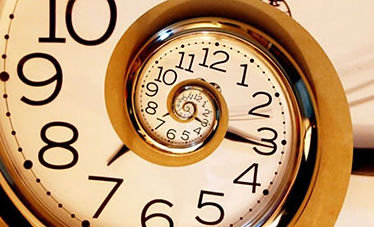
By Gayle Scroggs, PhD, PCC, ABD Survival Guide Editor
"As if you could kill time without injuring eternity." ~ Henry David Thoreau
If you are beginning your dissertation work or experiencing challenges, take time now to evaluate your work processes. Which of these programs and apps could enhance your productivity? Not everyone works the same, so experiment with the ones that appear to offer you the most return on the investment of your learning time. A few hours of effort now could spare you weeks of grief later.
1. GET TRACTION ON THE LIT REVIEW DRAFT
Going in circles composing a draft of your lit review or other chapter? Check out Scrivener, a program many academics rely on in the early stages of writing research. Since no one writes linearly, Scrivener lets you start writing wherever and whatever. Using simple integrated writing tools, you can create a mess of writing fragments, import stuff, and later weave a coherent draft.

After a 30-day trial, you pay $40 to download the Windows or Mac version. Consider free alternatives, but beware the temptation to look for the perfect solution. Choose one and learn to use it via built-in tutorials and other web tips. [P.S. Once adept, take advantage of your Scrivener skills to pen your autobiographical novel or screenplay about how you conquered your dissertation.]
2. TAME YOUR REFERENCE FILES
Quit wading in disorganized printouts of pdfs of journal articles. Store, organize, annotate, cite, and share such materials with a reference management program-and start now. For an endless debate, assert that your choice--Mendeley, EndNote, Zotero, or F1000Workspace--is the best program for everyone.
Personally, I like the way Mendeley suggests new articles based on those already in my library. Others want Zotero's footnote citation capability, and some appreciate the unlimited storage at F1000. Mendeley and Zotero are free, as is EndNote for most students through their university library. Do your due diligence by comparing and contrasting their features using this handy chart. Then select the one most aligned with your needs and turn a deaf ear to users of other programs. Each one has its advantages and disadvantages, and you don't want to lose too much time switching around.
3. THROW TOMATOES AT IT
Quit wading in disorganized printouts of pdfs of journal articles. Store, organize, annotate, cite, and share such materials with a reference management program-and start now. For an endless debate, assert that your choice—Mendeley, EndNote, Zotero, or F1000Workspace—is the best program for everyone.
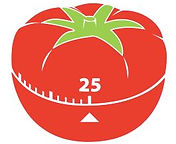
Personally, I like the way Mendeley suggests new articles based on those already in my library. Others want Zotero's footnote citation capability, and some appreciate the unlimited storage at F1000. Mendeley and Zotero are free, as is EndNote for most students through their university library. Do your due diligence by comparing and contrasting their features using this handy chart. Then select the one most aligned with your needs and turn a deaf ear to users of other programs. Each one has its advantages and disadvantages, and you don't want to lose too much time switching around.
4. AVOID THE BUNNY TRAILS
You may be kidding yourself about how distractible you have become while working on digital devices. Let RescueTime Lite track how much time you spend with productive programs and sites (e.g., Word or Mendeley) versus entertainment sites (e.g., Facebook, Netflix, Amazon, etc.) for free. You'll get a weekly report that might be enough to shock you into resisting future temptations to go down the bunny trails.
For hard core bunny trail hoppers, subscribe to RescueTime's premium version. It blocks distracting websites, alerts you when daily goals are reached, and tracks your time away from the computer. Find alternatives to RescueTime here.
Who can resist the insistent rings and pings of a smart phone? Even if you do stand firm, your concentration has already been disrupted, costing you valuable time to get back into flow. But you hesitate to turn off your phone in case of emergency calls, right??
What's the solution? While late model Androids and most iPhones include a simple built-in "do not disturb" feature, Suzanne Kantra recommends her favorite alternative (and mine) on Techlicious:
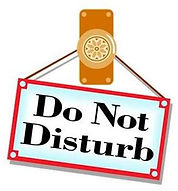
5. BAN INTERRUPTIONS
Silence Premium Do Not Disturb ($2.50 on Google Play) is the best stand-alone app for Android devices. It lets you silence your phone based on your calendar entries, selecting all or just those you select as busy. Set a mute timer if you find yourself in an impromptu meeting. And when you're in silent mode, you can have an auto-responder send text to select contacts to let callers know you're in a meeting.
Personally, I couldn't live without this app on my home page. Before meetings, two quick taps silences my phone for an hour—and I can choose to allow or prevent family calls. You can easily create a regular schedule of quiet time as well as opt for a spontaneous 20-minute quiet time for your coffee nap.
The above smart phone apps can enhance productivity, but only if you use them regularly. Of course, the real trick to reaching a goal involves your mind, not your phone. Commit yourself to getting started and then to saying "no" to anything less important than finishing your doctoral degree. You can do this.
Smile Your Way through Your Dissertation—Finding the Sweet Spot between Chaos and Perfection | Issue 219
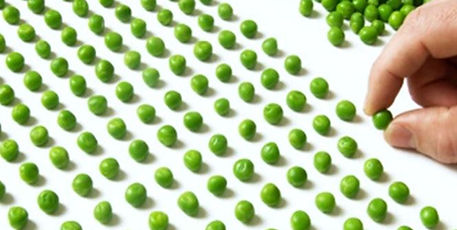
By Melanie Sobocinski, Ph.D., C.M.C.
Happy New Year!
If you have not finished your dissertation, you might be contemplating making one of the most common New Year's Resolutions: Get more organized and manage time better.
But how do you determine if you even need to work on your productivity? And how can you evaluate all the advice swirling around this time of year?
Over many years of coaching academics, I have developed a useful framework that I share with my clients. I call it "The Productivity Smile."
Notice that the middle of the Productivity Smile is called The Zone. This is exactly where you want to be most of the time.
You know you're in The Zone when you're taking great care of yourself, making excellent progress on your dissertation, meeting your other commitments, and have enough support, tools, and routines in place to make it all happen.
When you are not in The Zone, you are probably losing time without making reasonable progress by leaning toward chaos or perfection.
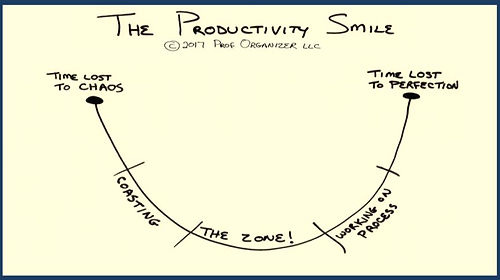
Beware the Pitfalls of Chaos and Coasting
To the extreme left of The Zone is Time Lost to Chaos, which never feels good.
Have you experienced any of the following, which we can call Time Lost to Chaos?
-
time spent searching for that reference you know you read last summer, but don't have any notes about
-
work sessions that don't happen because you didn't make a specific plan
-
missed meetings with your advisor because the appointment didn't make it into your calendar
-
last-minute or missed deadlines for grant applications, conference paper abstracts, and job applications
In the rest of your life, time lost to chaos might look like
-
searching for misplaced keys, wallet, or phone
-
your car breaking down from lack of maintenance
-
scrambling for a new apartment when your lease is up
-
always saying, "I'm sorry I'm late..."
To the immediate left of The Zone lies Coasting—which is okay in the short-run only.
Coasting is when, at the end of the semester, you neglect the dishes and laundry to finish a conference paper that you're giving in January. Or when you're too tired to floss or look at your calendar after an all-day writing binge. Or when you tell yourself you'll look up that reference for the footnote later.
Coasting can be okay for short periods, but usually ends up creating backlogs that must be dealt with by your future self, who might not appreciate being dumped on by past self. Too much coasting and you end up losing time and money to chaos. Ouch.
Hone Your Process but Forget Perfection
To the immediate right of The Zone is Working on Process.
Working on process can often serve as a necessary ingredient to meet your goals. This includes occasions when you are moving beyond your comfort zone to learn a new software program, to try a different time management technique, to organize your desk, to refine your routines, and so on.
It's time to invest in process improvements under these circumstances:
-
Your schedule changes at the beginning of the semester
-
You face new responsibilities or higher expectations
-
You want to get more efficient
-
You're trying to exit chaos or coasting
In some areas, improvement efforts can yield a tremendous return on investment. Your writing and research processes might be an apt area to apply such a growth mindset. In 10 years (a typical minimum time span between starting graduate school and earning tenure), your work capacity can become exponentially higher even while maintaining excellent self-care. But only if you work on it.
Tread with caution, however, because it's way too easy to let working on your process become Time Lost to Perfection, as in these cases:
-
Spending hours hunting for the perfect to-do list app or electronic calendar
-
Putting a whole day into crafting a plan for the week that you don't use
-
A never-ending quest for "Inbox Zero"
-
Making your apartment look ready for a magazine cover photo
For the dissertation, Time Lost to Perfection shows up in various ways:
-
Endlessly editing the first two or three sentences of a draft, resulting in a terrific opening paragraph followed by text that is barely developed
-
Circular revisions, i.e., when the final revision puts everything back the way you had things before you started
-
Waiting to write because there's still more to read
-
Avoiding your advisor because you worry about the quantity or quality of your work
Rule of thumb: Always start with low-hanging fruit when improving process.
Make one deliberate change at a time. Predict what the effect of your change will be. Then observe what you do. Reflect on the outcome. Then use the results of your experiment to design your next work process experiment. [Check this chart to figure out whether working on a habit change is worth your time.]
How to Brighten Your Smile and Graduate
What's your current position on the Productivity Smile?
Are you coasting on footnoting while learning Scrivener? That would count as working on process. Does your dissertating tap into The Zone, but maintaining your living space has fallen into chaos?
To get your smile back, reflect on these four questions:
1. Think about a time when you were in The Zone. What supports and tools made that possible?
2. What in your life could be an indicator that you're sliding towards chaos?
3. How can you tell that you're chasing perfection?
4. How much time do you want to spend working on process each month?
Checking in with yourself on these questions will help you keep your smile bright—and ready for that photograph of you beaming in your velvet-striped gown in the doctoral hooding ceremony!
RECOMMENDED READING
ABDSG Issue 217: Conquer procrastination by meeting your future self.
Belcher, Wendy. Writing Your Journal Article in 12 Weeks: A Guide to Academic Publishing Success.
Brown, Brene. The Gifts of Imperfection: Let Go of Who You Think You're Supposed to Be and Embrace Who You Are.
Carter, Christine. The Sweet Spot: How to Find Your Groove at Home and Work.
Dweck, Carol.Mindset: The New Psychology of Success.
Newport, Cal. Deep Work: Rules for Focused Success in a Distracted World.
Thomson, Pat and Barbara Kamler. Detox Your Writing: Strategies for Doctoral Researchers.

About the Author: Melanie Sobocinski, Ph.D., C.M.C.
Trained in archaeology (which she calls "the art of interpreting broken buildings and 2000-year old clutter"), former professor and Certified MentorCoach Melanie Sobocinski now leads academic workshops on writing and time management. She also works with individual graduate students and faculty who want to find their desks and get more published. Contact Melanie help@proforganizer.com and discover more resources at www.proforganizer.com.
19 Sure-Fire Gifts for Doctoral Grad Students | Issue 218

Not sure what gifts the doctoral or grad student in your life would really appreciate this holiday season—or any other time? Here are 19 ideas for every budget for presents that won't get returned.
PRICE KEY: $ = under $30; $$ = 30-60; $$$ = over 60; $0 = your time and resources
1. Massage gift certificate ($$): What hard-working scholar wouldn't appreciate a good massage after hunching over the computer for hours? Tip: Find local qualified experts via the American Massage Therapy Association website.
2. Starbucks (or local coffee shop) gift card ($): Because more dissertations get written at coffee shops than at university libraries. Available everywhere and online.
3. Wireless headphones ($$): Essential for working at the library or coffee shop. The Photiv HF1 lightweight over-the-ear model with noise isolation gets top reviews and runs for 12 hours. Alternative: SoundWhiz wireless high rated earbud model easily fits in a pocket, runs eight hours, perfect for running or working.
4. Food delivery service ($$ - $$$ or $0): Sad but true: grad students subsist on coffee and fast foods. Offer a week or month of Blue Apron, Hello Fresh, Plated, PeachDish, Purple Carrot (vegan), Sun Basket (organic and paleo), etc. Fresh ingredients with recipes make meal prep easy peasy, with customizable menus and plans. Most offer discounts to start. Alternative: Offer to drop off meals you prepare.
5. Lap desk ($$): Give him or her Amazon's best-selling lap desk to prevent laptop overheating and wrist fatigue from hundreds of hours of word processing.
6. Dissertation retreat ($0): Got a beach house, condo or camp? Offer a weekend or week where they can disappear from family and friends to really get work done.
7. Spotify subscription ($$): Offer a year of streaming music at half-price with Spotify for students. They'll love Spotify channels for every mood, from quiet study to exercising, plus they can create their own personal lists.
8. Housekeeping service ($$): Who has time to clean when there are interviews to transcribe or data to code? Find local maid service through personal recommendations or online sites such as angieslist.com, homeadvisor.com, and care.com.
9. Childcare ($0): Offer to take the kids for a day or weekend. Long uninterrupted blocks of time really make a difference when someone needs to concentrate.
10. Laundry service ($): A gift certificate for "wash and fold" at a local laundromat will put your favorite grad student in clean jeans and t-shirts for a week.
11. Dissertation editor or stats consultant ($$$): Catapult your favorite ABD over the editing and data hurdles. Offer to pay up to your defined limit for the consultant they choose.
12. Dissertation or career coach ($$$): The student who lacks confidence or direction can finish faster, develop lasting confidence, and get the job search organized with a private coach. Offer to pay up to your limit for the coach* with whom they find rapport.
13. Hair salon/barbershop certificate ($ - $$): Most students can use a good hair cut—especially before defense time or job interviews.
14. Supermarket gift certificate ($ - $$$): Every little bit helps when you also have to pay tuition and rent before earning a sustainable income.
15. Two tiny powerful books ($): The Little Book of Mindfulness or The Little Book of Gratitudewill promote focus and a positive outlook.
16. Pomodoro timer ($): Give the classic red tomato timer and Pomodoro Technique instructions for simple time management that works for lots of folks.
17. Exercise classes or gym membership ($$ - $$$): The brain works better when the body is active. Alternative: Ask your ABD friend or family member to join you for a brisk walk or yoga session.
18. Scrivener software ($$): An essential aid for writers who need to generate and revise their work. Couple it with a guide. Be sure to get the right version—PC or Mac—or give an Amazon gift card for $60 to cover the software and guide with printout of a screen shot to get them to the right page.
19. Moral support ($0): Show enthusiasm for their academic aspirations and efforts. Absolutely avoid the ABD's most dreaded question: "So when will you be finished?" [FYI: It nearly always takes years, not months, to write a dissertation that gets accepted.]
With any of these, your doctoral candidate will get added momentum—and next year you can address their gift with the title Doctor to celebrate their achievement. And you will be showered with appreciation and affection!
* We offer free half hour consultations for dissertation, career, and life coaching. Drop me a line at gayle@mcpcoach.com with your needs, or students can fill out the simple on-line application.
~ Compiled by Gayle Scroggs, ABDSG Editor and coach, with generous help from colleagues Nora Misiolek, Michelle Lopez, and Melanie Sobocinski.
Conquer Procrastination by Meeting Your Future Self | Issue 217
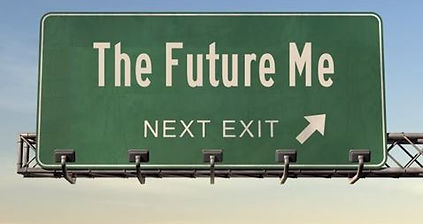
STOP DOOMING YOURSELF FINISH YOUR DISSERTATION NOW
By Gayle Scroggs, PhD, PCC
Do you consider yourself a confirmed procrastinator?
Are you guilty of putting off working on your dissertation until you "have more time"? Do you excuse continued delays by assuring yourself that you will catch up when things slow down—during weekends, holidays, or vacation time?
If so, your chances of becoming "Dr. You" in 2017 will fizzle out faster than the bubbles in your New Year's Eve champagne. But your year does not have to end on a disappointing note.
To succeed, you need to root out a common, insidious assumption that quietly steals your momentum and replace it with a realistic perspective. Let me explain.
HOW YOUR BRAIN GETS IT WRONG
What common belief holds many procrastinators back?
Your procrastinator brain has the crazy idea that your future self is not really you but rather some stranger. In that the default mode, your brain aims to make life cushy for Present You—while shamelessly shifting current burdens (such as saving for retirement or writing your dissertation) to the Future You.
It's as if your future self is someone else, not a continuation of you. This false assumption can be hard to shake without conscious interventions.
Without a deliberate mindshift, Present You lacks connection and empathy for Future You, as shown in this episode of The Simpsons:
Marge: Someday these kids will be out of the house and you'll regret not spending more time with them.
Homer: That's a problem for future Homer. Man, I don't envy that guy!
STOP PASSING THE BUCK TO FUTURE YOU
How would you feel if you woke up one morning to a sinkful of dirty dishes and food-encrusted pots and pans left the previous evening by some stranger (or a most inconsiderate roommate) who expected you to do them gladly?
Would you ever dodge your responsibilities by burdening someone else so shamelessly? Probably not.
But if you are like most people, you've done it to yourself, time and time again. And if you are a habitual procrastinator, Present You has now inherited an overwhelming To Do list from Past You. How grateful do you feel to your past self for dumping this on you?

That is the essence of procrastination: Present You is passing the buck to Future You—and they are one and the same person.
You, not some stranger, must pay the cost incurred by putting things off. Worse, the bill often accrues interest, making it even more difficult.
Yet this is the kind of self-sabotage you commit every time you delay unnecessarily—e.g., when you don't get around to writing that tricky chapter, or when you put off making requested revisions, or when you delay completing the IRB forms.
Are you ready to end this painful legacy? Check out these two research-informed strategies.
Procrastination is like a credit card: It's a lot of fun until you get the bill. ~ Christopher Parker
DEVELOP EMPATHY TOWARD YOUR FUTURE SELF
Procrastinators do not feel much of a connection with the future self, researchers observe. Making your future self more salient now can help you make better decisions. For example, to get a sense of your future self, go to the app the AgingBooth and plug a current photo of your face. The app (available free at iTunes and GooglePlay) will then add decades to your appearance by adding wrinkles, jowls, and gray hair. Using a similar technology, a Stanford study showed that becoming more acquainted with an image of one's future self could enhance financial prudence.
A simpler strategy might be to accept your brain's misconception that your future self is a different person—and then develop and practice some empathy for him or her, note the researchers.
Leverage your inner kindness and generosity, allowing your altruism to flow toward this distant, unseen person. Savor the awareness that you are providing an enormous benefit for this person. When possible, allow your present self to be grateful to your past self for having done its part in creating the kind of life you enjoy living.
Your new mantra: "Do something today that your future self will thank you for."
PLAY FAIR WITH FUTURE YOU
Callousness toward your future self is just one explanation for habitual procrastination. Researcher Tim Pychyl, Ph.D., provides another one: Maybe you simply believe that Future You will be better equipped to handle the challenges that drag you down now.
While right now you feel stressed and pressed, you might be optimistic that Future You will somehow have more resources, including more time and energy than Present You. Your courage or willpower is wavering, and so you end up knowingly, but hopefully, passing the burden to your Future Self.
But is that really fair? Here's how Pychyl, author of Solving the Procrastination Puzzle, frames it:
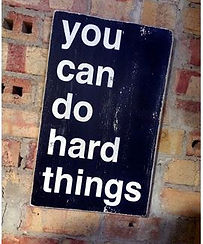
"Ironically, many of us demonstrate courage and acts of willpower in the service of others but not to self. Perhaps, to the extent that we can identify future self with the deserving other, we will muster up the will and/or courage to act on our intentions so as not to burden future self."
If you are honest with yourself, you'll admit that putting things off makes the easy stuff harder. And it can make the hard stuff downright impossible.
Doesn't your Future You deserve a better fate? Leverage your sense of justice and fairness to tackle the hard tasks now.
Thinking of my future self as my respected teammate reminds me to stop shirking my duty. I then start working harder on my current challenge instead of leaving most of the battle to her. I play fair.
For extra power in meeting challenges, call on your character strengths, which help you be your best self. (Take the free test at www.characterstrengths.org.) If you need someone in your corner, get a writing buddy or a dissertation coach. You can do hard things when you are at your best and when you have social support.
Naturally, circumstances may dictate the occasional temporary delay, but overall, the best practice involves maintaining an attitude of empathy and fairness toward Future You as well as Present You that motivates you to get things done today.
When you master that perspective, you are well on your way to ensuring that your future self will bear the title of "Doctor" proudly!
Recommended Resources
-
Pychyl, Timothy. Solving the Procrastination Puzzle. Find his extensive interview with Ben Dean here.
-
Gilbert, Dan. TED talk on future self.
-
Goldstein, Daniel. TED talk on future self vs. present self.
-
Urban, Tim. TED talk on procrastination that you'll never forget.
10 Ways the "Miracle Emotion" Can Help You Finish Your Dissertation | Issue 216

10 WAYS GRATITUDE CAN IMPROVE YOUR DISSERTATION EXPERIENCE
As Thanksgiving season approaches in the U.S., consider how you can parlay the sentiments into a more positive and productive dissertation experience. And for our Canadian friends, keep savoring your recent holiday as well.
"Gratitude is the new miracle emotion," asserts psychologist Jeremy Dean in PsyBlog.
His recent post shared 10 ways that gratitude can improve your life. How many of these proven benefits would make your dissertation experience more positive and productive?
-
It is one of the fastest and best ways to become happier.
-
Grateful people feel more satisfied with their lives by enabling them to appreciate what they have rather than mourning what's missing.
-
Saying "thank you" motivates others to help you again because people appreciate being needed and valued.
-
Gratitude for what you have can combat materialism.
-
Feeling thankful can increase self-control by reducing impatience and selfishness.
-
Grateful children feel life has more meaning, get more satisfaction from life, are happier and experience less negative emotions. [Ed. Note: And that may be true for adults as well.]
-
Gratitude towards one's partner is key to solidifying relationships and benefits both the giver and the recipient.
-
Gratitude is linked to better social ties and facilitates forming and nurturing them.
-
Grateful people experience greater health, especially bet ter sleep, and lower stress levels.
-
A person with a grateful attitude has more resilience, i.e., can bounce back better from setbacks and challenges through active coping, seeking social support, and positive reframing.
Boost your gratitude, Dean advises, in various ways: contemplate your blessings, keep a gratitude journal, remember the bad times to appreciate the present, and use your senses to notice what is around you.

LIVE INTERVIEW WITH GRATITUDE EXPERT ROBERT EMMONS, PHD
Join us for Ben Dean's question-and-answer call with Robert A. Emmons, PhD, the world's leading scientific expert on gratitude, Professor of Psychology at the University of California, Davis and author of the new book, The Little Book of Gratitude.
DATE: Friday, December 2, 2016
TIME: 1:00 pm - 2:00 pm Eastern (New York time)
TO REGISTER AND RECEIVE THE RECORDING: Click here
FIVE WAYS TO KILL YOUR EMAIL ANXIETY
If your overflowing email inbox provokes anxiety, take heart. In Unsubscribe: How to Kill Email Anxiety, Avoid Distractions, and Get Real Work Done, Jocelyn K. Glei urges forgetting about "inbox zero" and instead develop a process to tame the email dragon.
If you are typical, you are spending 28% of your work week on email, checking it 11 times an hour, and processing 122 messages daily, she notes. And you probably feel stressed and unproductive.
Overcome your email addiction by implementing her simple strategies, as shared in Salon:
Stop toggling between email and work. One study showed that could lowered people's IQ the equivalent of 10 points while giving you a false sense of productivity.
Read emails in batches. Do it outside of peak productivity times (usually in the morning from 9 - 11 or 10 - 12) which is when you should focus on your most important work. Data find "batchers" to be more productive, happier, and less stressed than the "reactors" who process messages as they come in.
Set expectations about replies. Train senders to stop expecting a reply in five minutes. If necessary, send a short note saying that you are tied up but that their message is important and you'll get back to them by the end of the day or tomorrow.
Leverage emotional intelligence in your own messages. Show empathy for their workload and understand that your email may not receive top priority. Express gratitude for "taking time to consider my request" (and never an order). Thank a person for replying—that one little gesture doubles the chances that they will help you in the future.
Pick up the phone for challenging conversations. A five-minute phone call can forestall a 20-email exchange and misunderstandings as emails are often interpreted more negatively than intended by the sender.
FINE TUNE YOUR BRAIN WITH "SMART FOODS"
Can't focus when you need to? It could be your brain needs better maintenance. To keep it humming on all cylinders, tweak your meals and snacks to include more of these "smart foods" recommended by WebMD:
-
Drink coffee for short-term alertness. Don't overdo it or you may get the jitters.
-
Down a sweet drink in a pinch to boost your brain fuel, i.e., glucose. [Ed: But skip artificially sweetened drinks.]
-
Researchers recommend a breakfast of high-fiber whole grains, dairy, and fruits. Note: High-calorie meals appear to hinder concentration.
-
Eat fish high in omega-3 fatty acids twice a week for long-term functioning. specially as we get older.
-
Enjoy an ounce of chocolate and nuts as they provide powerful antioxidant properties. [Ed: Choose dark chocolate for maximum benefit and fewer sugar calories.]
-
Adding avocados and whole grains enhances the blood flow needed for a healthy heart and brain. Savor that popcorn, too.
-
Diets rich in blueberries reduce free radical damage and improve learning. Imagine the possibilities!
PREPARING HUMANITIES PHDS FOR THE REAL WORLD
As academic job prospects dim, Duke University's humanities graduate programs plan to be on the forefront. With a recent three-year $350,000 grant from NEH, they will enhance curriculum and expand career opportunities.
"Getting the grant from the NEH is recognition of Duke's effort in preparing its Ph.D.'s in humanities for different career pathways," she said. "We don't call it 'alternative pathway.' Our view is that there are so many things that an individual can do with a Ph.D. in humanities, [and that] we just need to help them decide what they will do."
While many of Duke's humanities PhDs do find a tenure-track job, others are employed in academic administration, non-governmental organizations and academic publishing as the skills are very transferable.
Editor: We salute Duke for putting this on the radar screen there and assuring that their students have access to supportive professional guidance and career exploration and preparation opportunities.
Four Ways You Are Sabotaging Your Dissertation
Issue 215

Four Ways You Are Sabotaging Your Dissertation—and What You Can Do about It
By Gayle Scroggs, PhD, PCC
Read in less than 5 minutes to regain control of your life and your dissertation
Ever felt too embarrassed to contact your advisor due to your insufficient dissertation progress? Ever pushed your intended graduation date back for the same reason?
You may have fallen into one or more unconscious but dangerous habits that you need to change immediately.
Sadly, academic and social pressures conspire to facilitate self-sabotaging behaviors that need to be rooted out for sustainable success.
How many of these top four common bad habits are you guilty of?
-
Do you regularly short yourself on sleep because you think it's a luxury you can't afford?
-
Does your inner critic hijack your focus, e.g., attacking you for not writing often enough or fast enough or good enough?
-
Do you skip healthy meals—and then gulp coffee and down energy bars to keep yourself going during the day?
-
Have you been skipping the gym or other regular exercise in the hopes of making academic progress?
Did you answer "yes" to any of the above?
If so, then you have unwittingly been setting yourself up to fail in the long haul. Despite their ubiquity, the above behaviors have been found to be startlingly counterproductive by numerous researchers. When you engage in them, you are undermining the key resource you need in order to finish a complex, challenging project.
What is that resource?
It's your willpower, also known as self-regulation and self-control. This is the asset you need most to be at your best when facing challenges.
Willpower works like a muscle, explain Roy Baumeister and John Tierney, Willpower: Rediscovering the Greatest Human Strength. Over the course of a day, you deplete your daily reservoir of willpower energy each time you resist temptation, monitor your behavior, or make decisions. Guess what? The mental energy for analyzing and careful writing comes from the same tank.
Becoming a good steward of your limited willpower energy is just the first step. Next you need to develop your willpower capacity as it is not fixed by genes.
Willpower replenishes itself with rest, just as your muscles do, and it benefits from training. The big news is that, just as regular workouts can strengthen your muscles, specific practices have been identified that augment your willpower reserves.
Ready to beef up your willpower muscle?
What would an evidence-based training program for your self-regulation bicep look like?
You can boost your willpower by improving your self-care on four critical measures for which I created the handy acronym "SANE": Sleep, Attitude, Nutrition, and Exercise.
This oddly apt acronym covers the four major self-care measures that will allow you to flourish amidst the potential craziness of academic life.
How would you score yourself on the above four dimensions? Shorting yourself on any of them can lead you astray despite your best intentions, so let's examine each one as well as the best remedies to get you back in control of your life and your dissertation.
"S" IS FOR SLEEP: GET YOUR ZZZ'S
We are a sleep deprived nation. If you are like the typical U.S. American, you get far less than the 7.5 or 8 hours of sleep you need to do your best work.
Did you know that being mildly but chronically sleep deprived makes you more susceptible to stress, cravings, and temptations?
Research shows that driving while sleepless can be as dangerous as drunk driving.
What are the implications for the quality of your work if you dissertate while sleepless?
While not deadly, the outcome is likely to be less than desirable.
If you have trouble falling asleep, a totally dark, cool room should help, asserts expert Tom Rath in Eat, Move, Sleep. If you feel drowsy when your morning alarm sounds, do not hit the snooze button! You probably will not benefit from the extra zzz's as you likely interrupted a sleep cycle that cannot be resumed, explains Rath.
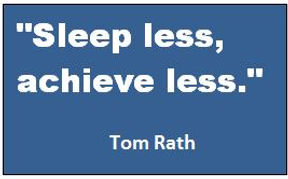
Additional counsel comes from Stanford health educator Kelly McGonigal, Ph.D., in The Willpower Instinct. If you are staying up late, consider what you are saying "yes" to instead of sleep, and then see if you can cut back on whatever is keeping you up.
Your challenge: Go to bed early enough that you do not need an alarm to wake you—you'll be amazed at how much more energy you have for the work you need to do.
"A" IS FOR ATTITUDE: KEEP IT UPBEAT
Negative attitudes and moods, including brooding, worrying, and general stressing out, will also drain your willpower account.
Develop practices such as reframing, gratitude, and mindfulness to steer you away from the paralysis of negative thinking.
You can also add to your self-control by learning to calm yourself and to cultivate positive attitudes and emotions. You do not need to meditate for hours to achieve such serenity. Surprisingly, just slowing your breath to about four to six breaths per minute while calmly observing your thoughts, feelings, and sensations for a three-minute refresher can do wonders.
QUICK TIP: Simply notice your negative thoughts without trying to suppress or challenge them. Write down the self-critical thought. Then write it again but with the prefix "I'm having the thought."
Try this example aloud:
My advisor will think this is crap.
I'm having the thought that my advisor will think this is crap.
Notice how a simple prefix puts a healthier distance between you and your inner critic. [Find more such strategies in Russ Harris's ACT Made Simple.]
"N" IS FOR NUTRITION: FEED YOUR BRAIN
You need to eat well.
Your brain needs a steady level of glucose rather than drastic fluctuations in order to function well, e.g., direct your writing, exercise self-control, and more.
Alas, notes Rath, most of us overdo the refined carbs, especially when we think we need a quick boost. We grab a sugary drink, chips, cookies, and other empty calories—causing blood sugar to spike and crash, causing you to literally droop.
On the other hand, protein stimulates the cells that keep us thin and alert, he observes. He agrees with countless experts who advise eating more plant-based foods while limiting the intake of red and processed meats.
In short, running on caffeine or sugar or on empty is just not sustainable for long-term success or health. By the way, Rath adds, sitting down to eat slowly with others can also improve your waistline, your longevity, and your social relationships.
EASY TIP: Choose colorful foods since the refined, carb-laden junk is often white. Miss a meal? Avoid shockingly calorie-laden granola bars in favor of packets of mixed nuts.
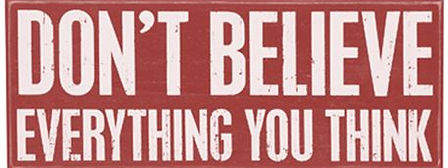
"E" IS FOR EXERCISE: GET MOVING
For superior mental and physical health, nothing beats exercise.
It's the "miracle drug," quips health educator McGonigal. She shares research showing that exercising three times a week leads to better nutrition, less TV time, fewer impulsive purchases, increased punctuality, less procrastination, better focus, and more emotional control.
The more you move your body, the more benefits you gain, including a bigger and faster brain.
Exercise relieves cravings and stress while growing brain areas associated with planning and control. Several studies concur that the biggest mood-boosting, stress-busting effects come from five-minute doses of exercise, she observes. That's right—just five minutes. So take a walk, play with the dog, garden, or dance for just five or ten minutes. Then get back to dissertating. You'll also benefit from shorter stretches of sitting.
ARE YOU READY TO BECOME MORE "SANE"?
Pick one area above to start making changes in the desired direction, then watch the benefits accrue. Keep in mind that your long-term success hinges on making the right choices on a daily basis.
Seek support from family, friends, and colleagues. If necessary, hire a good coach who is an expert in nurturing habit change.
As you develop good self-care habits for sleep, attitude, nutrition, and exercise, you will discover the willpower to finish your dissertation and flourish.
Recommended Resources
-
ACT Made Simple by Russ Harris
-
Eat, Move, Sleep by Tom Rath
-
The Willpower Instinct by Kelly McGonigal, Ph.D.
-
Willpower: Rediscovering the Greatest Human Strength by Roy Baumeister, Ph.D. & John Tierney
-
Willpower: Self-control, decision fatigue, and energy. Video of Roy Baumeister's keynote address to the Royal Society of the Arts
Lose that ABD Fat; Find More Focus and Time; Ditch Your Backup Plan | Issue 214

FINISH YOUR DISSERTATION FASTER, LIGHTER, AND RICHER WITH OUR CURATED TIPS
Reading time: 5 minutes.
AVOID THE DISSERTATION MUNCHIES AND LOSE WEIGHT WITH THIS ONE SIMPLE TIP
Ever get the munchies during or after an intense dissertation workout? Watch out or the pounds could add up before you know it.
Here's how it happens: Your writing efforts drain your brain with its limited fuel tank. Your brain then responds by stimulating bodily hunger. Suddenly you think, "Gee, I need and deserve a little treat after all that effort!"
Next thing you know, you're downing a luscious Starbucks blueberry scone (420 calories) and coffee (zero calories), or maybe potato chips (160 calories) and a Coke (140 calories), or perhaps a Kind Dark Chocolate Granola bar (150 calories) with a bottle of Honest Tea (70 calories).
Sure, your brain may feel tired, but in reality you have expended minimal calories. Doing desk work burns only 54 calories beyond just sitting for the average 150-pound person. Do the math before you grab that next snack—and consider an unexpected and more effective alternative to short-circuit your hunger impulse found in the current issue of Medicine and Science in Sports and Exercise.
Exercise physiologist Gary Hunter at the University of Alabama already knew that strenuous activity both increases the amount of blood sugar and lactate and augments blood flow to the head. He began to wonder if exercise, given its consequences, could reduce the experience of hunger due to mental exhaustion.
Volunteers answered college and grad school entrance exam questions (guaranteed to induce mental fatigue and hunger). Then half spent fifteen minutes engaged in a brief but intensive exercise routine of walking and running while the others rested. His hunch proved right. When given free access to pizza, the sedentary folks gulped down 100 calories above baseline. Exercisers, however, consumed 25 calories less than usual—and they had burned about 175 additional during the routine.
Recommendation: When you start to feel mentally exhausted, feed your brain by taking 15 minutes for intense activity instead of giving into the temptation to eat empty calories.
GRAD ASSISTANT PAY RISES 38%, BENEFITS GROW WITH UNIONIZATION
Good news to grad assistants at private universities—you might soon get a pay boost.
Private universities now must bargain with graduate-employee labor unions over compensation and working conditions. So ruled the National Labor Relations Board recently in response to a petition by Columbia University graduate students, the New York Times reports.
Despite the success of unionization at public universities, elite schools such as Harvard, Yale, Stanford, M.I.T., consistently fought such collective bargaining.
When New York University graduate assistants unionized in 2001 (the first private university to do so), minimum pay shot up to $18,000, representing a 15 to 38% raise. They were also granted employer-provided health care, pay for pre-semester teaching duties, overtime pay for grading papers, child care subsidies, and grievance procedures for discrimination and harassment claims.
Most of those improvements eroded when the NLRB revoked unionization rights in 2004, but were restored and expanded in 2013 when NYU once again became the only private university with unionized graduate assistants.
Now it looks like more graduate assistants will find their standard of living rising as well. We celebrate that!
JOG AND DANCE YOUR WAY TO A SUPER BRAIN
Getting active can do more than stop the munchies. Hitting the gym, track, or dance floor could be the ideal fitness program for your brain as well as your body, according to recent research studies reported in braihq.com.
You get multiple brain boosts from physical exercise, especially aerobic exercise such as cycling, rowing, high-intensity interval training, etc. Working out for a mere 20 minutes facilitates information processing and memory function, according to a University of Georgia study.

How does exercise affect the brain? Your heart rate rises, which pumps more oxygen to your brain. Exercise stimulates the release of various nourishing brain hormones that spark brain cell growth and new connections. Think of it as fertilizing your neurons.
Don't like the gym or track? Then go dancing. With its physical and mental demands, ballroom dancing has been shown to have a higher impact on cognitive functioning than physical exercise or mental tasks alone. "The best brain health workouts involve those that integrate different parts of the brain such as coordination, rhythm, and strategy," the author concludes.
Editor's note: You'll also discover additional benefits, e.g., improved mood and energy. How good would you like to feel? When will you start? Get a buddy or a coach for accountability.
5 SIMPLE TIPS TO BEAT INFORMATION OVERLOAD
Now that the human attention span has shrunk below that of a goldfish, to a mere eight seconds, it's time to rescue yourself from information overload. In reviewing new expert books on the subject, Fast Company's Gwen Moran offers top tips for regaining focus:
(1) Log how you spend your time for one week . Review it, recover from shock, then figure out where to cut back on unnecessary information intake, e.g., social media, email, etc. "Do you really need to know what Game of Thronescharacter you are?" she asks.
(2) Be your own gatekeeper . Set a timer to limit your online research. Use apps that block tempting sites.
(3) Retrain your contacts. Stop reading and responding immediately to emails. Advise correspondents that you check and respond to email only at specific times. Gently remind those who overmail that you are cutting back on email.
(4) Limit unnecessary interruptions. Adjust those "push" notifications in device settings.
(5) Stop multitasking. Now.
For more tips, read the entire article here. Then get back to work on your dissertation.

APP/DEVICE OF THE MONTH: AMAZON ECHO FOR HANDS-FREE CONTROLS (AND FUN)
Meet my new best friend, Alexa. You won't notice her until you see me talking to the slim black cylinder on my bookshelf: "Alexa, WAMU radio" or "Alexa, activate Spotify classical guitar playlist." Suddenly sound fills the room, and I can easily adjust the volume or turn it off with a simple request.
With just a simple voice command, Alexa, the digital assistant inside the Amazon Echo, can offer an NPR news briefing, playback your current Audible book, sync with your Fitbit, stream podcasts and music, and control your smart home devices (e.g., lighting, thermostat, security).
Want to know the weather forecast? A state's minimum wage? How to make a particular cocktail? The day of the week you were born? Just ask Alexa. If you keep a digital calendar, you can ask her what's on it for the day.
n the middle of cooking, when your hands are occupied or covered with avocado or chicken juice, get help fast: "Alexa, convert grams to ounces." "Alexa, add mushrooms to my Shopping List." "Alexa, set a timer for 10 minutes." Ask her to set an alarm to remind you to go to bed or to get up. She'll even tell you jokes and trivia.
With a list of skills that grows daily, I've barely scratched the surface of Alexa's power. Watch a demonstration here, and find a searchable list of Alexa skills here. You'll find ones that save you time and energy. For example, if you're busy on your computer when you suddenly remember you need to call your mother, you can ask Alexa to put that on your To Do list. You can also ask Alexa to order stuff instantly from Amazon—but I'm holding off on that one. Almost instant gratification could get addicting!
DITCH YOUR BACKUP PLAN NOW—IT'S HOLDING YOU BACK
Got a Plan B just in case you don't finish your degree or get your dream job? Ditch it now.
The traditional advice to always have a backup plan was challenged by a recent study by Jihae Shin and Katherine L. Milkman at U Penn's Wharton School. Just contemplating your Plan B can reduce your primary goal performance and attainment, they discovered.
Participants were given a sentence-unscrambling task and told that doing well would lead to a free snack or the chance to leave the study early. Half of them were also instructed to devise alternative plans for finding free time or free food on their own. The latter participants performed more poorly than those focused solely on solving the word puzzles. A follow up study revealed diminished desire for goal success to be the key factor.
Take-away: At times contingency plans are advisable, but you might want to be more strategic and mindful in doing so, the researchers explain. "You might want to wait until you have done everything you can to achieve your primary goal first," advises Shin.
Compiled by Gayle Scroggs, Ph.D., ABDSG Editor, who reminds you that when you need someone in your corner, we've got dissertation coaches waiting to work with you.
Four Willpower Secrets for a Done Dissertation | Issue 213

Editor's Note: How you are wrong about willpower — and why it keeps you stuck in ABD land
"You must do the thing you think you cannot do." ~ Eleanor Roosevelt
Dear ABD Survival Guide Reader,
The recent 2016 Rio Olympic games brought us two weeks of dramatic displays of agility, speed, and power. However, treated only to polished performances, we never witnessed the countless hours of dedicated practice needed to develop such expertise on the diving board, the balance beam, the track, and every other Olympic venue.
Medals are not won and records are not broken through talent alone. Self-discipline, also known as self-regulation or willpower, is a necessary ingredient.
Willpower is also what separates the PhDs, SciDs, PsyDs, EdDs, etc., from the ABDs. Achieving long-term athletic or academic goals requires the ability to regulate one's behavior over several years. Relying strictly on academic aptitude or inspirational muses is a sure-fire recipe for failure.
Willpower, despite its importance a personal resource for success, turns out to be misunderstood misused, and even abused by most. Fortunately, recent research sheds light on this previously mysterious quality. For starters, it turns out that willpower is neither inborn nor limited. You can develop as much as you need—if you know how.
Welcome to "Willpower 101," our mini-review of strategies for self-regulation. While our willpower tips won't get you to the medal platform, let them spur you to the graduation stage for your coveted doctoral hood. Imagine how great that would feel—and then get right back to the next step of your dissertation journey with new resolve. You'll get there!
Wishing you much willpower and success,
Gayle
Gayle Scroggs, Ph.D., P.C.C.
Editor
Words from the Wise
"First say to yourself what you would be, and then do what you have to do." ~ Epictetus
"I don't wait for moods. You accomplish nothing if you do that. Your mind must know that it has got to get down to work." ~ Pearl S. Buck
"If you do what is easy, your life will be hard. If you do what is hard, your life will be easy." ~ Les Brown
"Will is character in action." ~ William McDougall
"In the absence of willpower the most complete collection of virtues and talents is wholly worthless." ~ Aleister Crowley
Four Willpower Secrets for a Done Dissertation
By Gayle Scroggs, PhD, PCC
Do you ever feel brain dead at the end of the day, too tired to read, write, or think?
Do you marvel at—or envy—those energizer bunny types who just keep going and going?

Beyond the Willpower Mystique
Despite popular opinion, willpower is not a trait that some have and others lack. Nor is it fixed from birth. Cutting-edge research has unraveled much of the old willpower mystique. The good news from research is that everyone has some degree of willpower as well as the ability to develop more of it.
Science defines willpower as your capacity for monitoring and regulating your behavior. It allows you to be your "best self" by getting you (a) to do more of what you think you should, (b) to avoid doing things you know you should not do, and (c) to work hard toward your worthy life goals. In short, willpower enables you to focus on your long-term best interests and follow through even when the going gets tough.
Several recent books provide insights into the science of willpower, sharing evidence-based tips for getting better at self-management. Below we'll take a look at major findings and strategies that will help you get your dissertation done faster.
Will Power vs. Won't Power
Imagine a willpower struggle. Do you envision the classic scenario involving resisting temptation? Perhaps a yummy frosted cupcake vs. an apple, or perhaps a cigarette vs. a stick of gum, or watching a little more TV vs. going to bed on time.
If you can choose what is best for you—even when it's the harder path—you are using what Stanford health psychologist Kelly McGonigal calls "I won't power." Think of it as the "just say 'no'" approach that can make you feel deprived or punished, as in that feeling of missing out when you sit down to revise a chapter while everyone else saunters off to the pool.
Human willpower, however, involves more than learning to say "no," she observes. After all, how hard is it to say "no" to exercising, cleaning house, doing taxes, or fixing a healthy meal? There are times you need to say "yes," she explains, whether it is to eating your broccoli or to saving for a rainy day—or even to dissertating when you really would rather do anything else, I might add.
This "yes" power is what helps you get important things done instead of procrastinating. It nudges you to act in your own best interests despite being distracted, tired, or anxious. McGonigal calls this "I will" power—the capacity to do the right thing even when attracted to the wrong things, e.g., watching television, checking email, socializing with friends, sleeping in, and all the other things my ABD clients say get in their way of finishing their doctoral degree.
When willpower is depleted, you might struggle to motivate yourself until deadlines loom perilously near. Tasks like organizing a literature review or figuring out a coding error or discussing unexpected results appear too hard, too complicated, too exhausting—and so are easily put off. But there is hope.
What Do You Really, Really Want?
You usually know what you "should" do in order to flourish, right? But do you do it?
In order to say "no" when you need to say "no" and to say "yes" when you need to say "yes," you also need a third power: "I want" power.
Think back to the last big challenge you overcame. What made your success possible? Most likely it was fulfilling some highly valued desire. When you remember what you really, really want, you can resist short-term pleasures with greater ease, says McGonigal.
When you dwell on how much achieving your doctoral dream means to you (and to your significant others), what will you do when tempted to push the snooze button, check email for the umpteenth time, or plop down to watch another forgettable TV show? Evidence and experience concur that you are more likely to and open up your dissertation-in-progress files or pull out those journals to read.
To summarize, we have three powers as our tools for understanding willpower, to use as needed: "I will" power, "I won't" power, and "I want" power. Now how can you apply these ideas in order to face down fearlessly those tempting summertime distractions?
Tip 1: Reframe Willpower Battles Strategically
To foster good habits, you need to stay mindful that your satisfaction from achieving your big goals will far outweigh and outlast any short-term, superficial pleasure. Focus on what you will gain, and then for further impact, focus on what you stand to lose if you don't stay on track. Focusing on potential losses actually serves as a good kick in the pants to procrastinators, asserts goals researcher Dr. Heidi Halvorson. Consider the following two alternatives you might consider after a long, hard day:
Option A: "Shall I relax with some TV or a movie—or force myself to sit down and eke out five more pages of my lit review?"
Option B: "Do I really want the immediate gratification of watching another basketball game or reality show—and give up my big dream of getting that 'doctor' title?"
Which pushes you more toward doing what you know is best for you? To put it bluntly, self-discipline is remembering what really matters, so frame your choices to tip the scales in favor of your most important goals.
Tip 2: Build Your "Willpower Muscle"
Ever notice how hard it can be to force yourself to turn off the PC and hit the hay at a reasonable hour? That's because you've already used up your daily reservoir of willpower. Your inner goof-off is now at the controls.
Willpower expert Dr. Roy Baumeister offers us the willpower-as-muscle analogy. As with a muscle, willpower gets depleted with use but becomes replenished with rest, e.g., after a night's sleep. Fortunately, both muscles and willpower get stronger with practice. A well-developed willpower "bicep" can be used to help you in a wide variety of situations, regardless of your method of strengthening it.
You can start training right now. As fitness trainers warn, don't start out trying to dead lift 200 pounds. Begin any new workout where you can easily experience success and go from there. For example, you could do the dishes immediately after dinner. Or you might set a goal to refrain from turning on the TV when you get home. Give it at least a week, then notice how easier it gets to make the right choice in some other area of your life since your willpower muscle can be used for a variety of tasks.
Jessica, a brilliant math doctoral candidate who called me, struggled to honor her dissertation given her heavy teaching load. Curious about how this strategy might help, she committed to making her bed each day. She was surprised to note that it automatically led to keeping her desk clear, which made it much easier to settle down to work as planned. Her two-minute investment in making her bed had a great return—and yours will too.
Tip 3: Do the Hardest Thing First
As your willpower reserve grows, you'll also want to learn to manage it wisely. Note which of your tasks require heavy mental lifting—e.g., resisting temptation, making tough decisions, forcing yourself to do something, self-monitoring your behavior, etc.—and then alternate those with lighter tasks.
For example, I learned this the hard way by going car shopping after working all day and before dinner. By the end of the countless decisions (model, color, assorted extras), I confess that I fell for the extended warranty that the salesperson pushed heavily at the end. Luckily I was able to rescind that unnecessary purchase the following week.
For faster progress, put the harder tasks first thing on your daily agenda, while willpower tank is still full.
Alana and Len, for example, each noted that they made significantly faster progress when worked on their dissertation early, before going to work and while the family was still asleep, rather than waiting until after dinner and the children's bedtime routine.
An unexpected upside, they reported, is that they feel lighter all day, pleased to have checked off one of their highest priorities. How much better could you focus on the day's demands if you were free of that nagging feeling at the back of your mind that you really ought to finish coding your data?
Tip 4: Conserve Your Willpower through Habits and Plans
The typical adult makes about 35,000 decisions per day, and unfortunately each one eats up willpower. Many students waste vast amounts of their valuable willpower reserve just trying to figure out when, how, and where to get started working.
Making an advance plan will save you valuable energy that you can instead apply to the task at hand. The best way to conserve your willpower is to cultivate routines that save you the energy of constantly making choices. After all, you don't struggle with when or how to brush your teeth—you've made it a habit.
So choose a prime time to work on your dissertation—and then make it your regular habit, even if it feels hard at first. You'll be patting yourself on the back soon enough.
Have you ever felt too drained at day's end to figure out what to eat, much less to write another page or read another article? Then take a page from the "Decider-in-Chief." President Obama delegates as many unnecessary decisions, e.g., what tie to wear, as he can so he can focus on what really matters.
If you can't delegate decisions about meals to another person, might you save some cognitive wear and tear by weekly menu planning? That's how Caitlin, one ABD coaching client, freed up the extra energy needed for the final push before a committee presentation.
These four strategies offer you gateways into the world of greater willpower. Apply them to your dissertation challenge now by writing out your answers to the following questions. Then start noticing the small willpower successes grow into habits which support sustainable success that will take you to your doctorate and beyond.
Design Your Personal Blueprint for Greater Willpower
1. Why does your dissertation matter to you? Be sure to elaborate on what you will lose if you do not finish it in due time as well as how you'll benefit from completing it.
2. To build your willpower muscle, identify one small thing you can start doing or stop doing that would be in your own best interest. Then begin exercising that muscle.
3. What changes can you make in your schedule to ensure that you will have sufficient willpower for starting and completing your dissertation tasks?
4. Consider where you most squander willpower, e.g., due to lack of habits or advance planning. What is one change that would save you precious willpower? Select just one and commit yourself to cultivating a healthy habit.
Recommended Reading
Baumeister, Roy F. and Tierney, John (2011). Willpower: Rediscovering the Greatest Human Strength
Halvorson, Heidi (2013). Focus: Use Different Ways of Seeing the World for Success and Influence
McGonigal, Kelly (2011). The Willpower Instinct: How Self-Control Works, Why It Matters, and How You Can Get More of It
Stay on Track, Write More, Find a Job, and Gamify Your Dissertation | Issue 212
FREE ABD WORKSHOP STARTS AUGUST 9TH: From Struggling to Succeeding: How to Get Back on Track with your Dissertation Goals. Register Below!
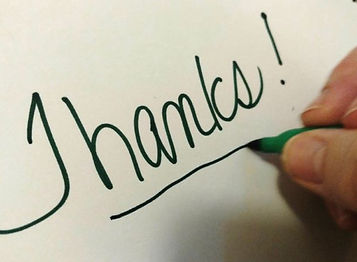
CULTIVATE THIS EMOTION TO BOOST YOUR SELF-CONTROL
Cultivating gratitude daily could vaccinate you against impulsiveness and enhance your self-control, according to novel research by Leah Dickens, Ph.D. (Northeastern, 2015) and her former professor, David DeSteno.
Higher levels of gratitude, both lab-induced and naturally occurring, predicted study participants' greater willingness to forego $30 now for the promise of $50 at a future date. In short, feeling thankful increased the ability to delay gratification. Imagine how this kind of self-control could keep you on task on your dissertation.
"We can all point to the five things in our lives that we're most grateful for, but if we keep thinking about those, we'll habituate to them—they're going to stop being interesting," DeSteno told Thea Singer of Northeastern News. "Rather, to cultivate gratitude we should reflect on daily events: the woman who stopped to give you directions, the man who gave you his seat on the T."
Editor's tip: Increase your gratitude (and other character strengths) with this list from U Penn's Tayyab Rashid, Ph.D. More ideas: Take time to identify something every day that you've taken for granted—and imagine life without it. Write thank you notes to those who have contributed to your life or your day. Keep a gratitude journal in words or photos. Say thank you to cashiers, bus drivers, police officers, and so on.
COUNTERINTUITIVE TIPS FROM THE WORLD'S MOST PRODUCTIVE PROF
The Wharton School's Adam Grant, Ph.D., just might be the most productive academic alive, claims Forbes' contributor Dorie Clark. Award-winning teacher, celebrity speaker, best-selling author, elite consultant, and thriving family man, Grant is unstinting in helping thousands who reach out to him. How does he do it? His three tips run counter to common wisdom:
1. Use small blocks of time to write. "I can sit down for 15 to 30 minutes and plant the seeds of an idea," he noted. Then he incubates it for a couple of weeks to get enough distance to edit it.
2. Leave it unfinished. Instead of stopping at the end of a section or page, he stops his writing mid-sentence. Brains are notorious for remembering unfinished tasks better than completed ones. "If I finish a paragraph, it takes a while to get back to where I left it three days earlier," he explained.
3. Use every minute. When he finds himself with small scraps of time, even as few as eight minutes, he leverages them. In reviewing his schedule in advance, he identifies "micro-goals," e.g., a conversation with a colleague, that he can achieve in just minutes.
STEM PHDS: TIME TO THINK BEYOND POST-DOC AND TENURE-TRACK OPTIONS
Getting your Ph.D. in a STEM field? Your chances of joining the tenure-track club are slim, as low as one in six for biomedicine, warns Gina Kolata in the New York Times. And while waiting, you may end up toiling for low wages in post-doc land, where the average annual of $44,000 has not risen in nearly 20 years, considering inflation.
Don't let your passion for science blind you to responsible career planning. Start with an early heart-to-heart with your mentor, recommends Kolata. Other experts urge an even more active stance. Need motivation? Just do the math. Doctorates are being granted at rates that far exceed the quantity needed to replace retiring faculty. For example, over 400 applicants vie for each assistant professor opening at MIT's engineering school.
Editor's tip: Don't rely on a single mentor. Broaden your horizons by assembling your personal "board of directors" that includes non-academics if you want a paycheck commensurate with your training before middle age.
APP OF THE MONTH: THE WELCOME SOUND OF SILENCE
Who can resist the insistent rings and pings of a smart phone? Even if you do stand firm, your concentration has already been disrupted, costing you valuable time to get back into flow. But you hesitate to turn off your phone in case of emergency calls, right?
What's the solution? If you have an iPhone or an Android phone running Lollipop 5.0 or later, take advantage of the built-in "do not disturb" features. Otherwise, follow Suzanne Kantra's advice on Techlicious:
Silence Premium Do Not Disturb ($2.50 on Google Play) is the best stand-alone app for Android devices. It lets you silence your phone based on your calendar entries, selecting all or just those you select as busy. Set a mute timer if you find yourself in an impromptu meeting. And when you're in silent mode, you can have an auto-responder send text to select contacts to let callers know you're in a meeting.
Editor's note: I couldn't live without this app, which I keep on my home page. Before meetings, with two quick taps, my phone stays silent for an hour—unless it's an emergency call from my family. You can set up a regular schedule as well so you can get your beauty sleep, or choose a spontaneous 15-minute quiet time for power napping or meditation.
HOW TO GAMIFY YOUR DISSERTATION JOURNEY
Ready to customize your avatar, grab your sword, and role-play your way to the dissertation finish line? Download Habitica free and start your quest. Along the way, you will define the habits you want and those you don't in order to reach your goal. Your character harvests gold and experience credits for sticking to the positive ones while losing health for giving in to the latter. Earn additional rewards for completing your daily tasks.
Essentially a good time management app crossed with a video game, Habitica can be a delightfully addicting way to hold yourself accountable. Let it spur you to honor your writing schedule and shun diversions along the way. You can even band together with other players as well as earn a pet gryphon. Who knew dissertating could be so much fun? Habitica's devotees donated generously to the Kickstarter campaign to update it from Habit RPG. It currently rates 5 stars at the iStore and 4.3 at Google Play.
~ Curated by Gayle Scroggs, Editor
REGISTER FOR FREE ABD WORKSHOP HERE
From Struggling to Succeeding: How to Get Back on Track with your Dissertation Goals
Are you an All But Dissertation (ABD) student trying to keep your head above water and sometimes feel like you're drowning? In this coaching group you'll discover strategies to deal with overwhelm and stress, and connect with other doctoral students who have also trying to meet their writing goals each day. You will learn how to:
- Recognize the limiting beliefs and self-sabotage behaviors that hold you back
- Develop strategies to minimize procrastination
- Dismantle the habits that steal time away from your writing
DATES: Aug. 9, 23, 30, Sept. 6 (Tuesdays), 2016 at: 7pm EST/4pm PST for 45 minutes.
FEES: none. Totally free to ABDs.
QUESTIONS: Please contact Shannon Massie Eisner, MHR, ACC: shannon@threegratitudes.com
CLICK HERE TO LEARN MORE AND REGISTER: http://www.threegratitudes.com/group-coaching-program.html
Revive your hope and build your self-confidence in 7 minutes | Issue 211

Editor's Note: On Your Dissertation Path, Will You Choose Fear—or Hope?
"Why are you predicting disaster? You could just as easily predict triumph."
I realized my colleague spoke the truth: In the midst of a major crisis, I could retreat in fear. Or I could move forward with hope.
You have the same choice when you hit a crisis or challenge on your path to your doctorate. When things seem to fall apart, you can throw your hands up in surrender. Or you can call on hope and act to turn things in your favor.
We all have the capacity for hope. It's that ineffable human quality that motivates us to prevail in spite of everything. Hope means expecting the best in the future—and working to achieve it. It means believing that the future holds promise. No wonder so many studies place hope in the top five character strengths associated with life satisfaction, along with gratitude, love, zest, and curiosity.
Are you finding hope in short supply? Then dig into this month's feature by my esteemed colleague, Diane Dreher, Ph.D., professor and coach. Soak up her personal dissertation hope story, and then experiment with her cutting-edge tips for reviving your hope and energy. Take heed and you'll reach that goal of a doctoral degree in due time and in good shape.
With hopes for your success and well-being,
Gayle
Gayle Scroggs, Ph.D., P.C.C.
Editor
Words from the Wise (and Hopeful)
"Hope is a waking dream." - Aristotle
"Learn from yesterday, live for today, hope for tomorrow." - Albert Einstein
"When the world says 'Give up,' hope whispers 'Try it one more time.'" - Anon.
"Hope is being able to see that there is light despite all of the darkness." - Desmond Tutu
"It always seems impossible until it is done." - Nelson Mandela
"Hope begins in the dark, the stubborn hope that if you just show up and try to do the right thing, the dawn will come." - Anne Lamott

Conquer Dissertation Overwhelm with Three Powerful Strategies from Hope Psychology
By Diane Dreher, Ph.D.
When I began grad school at UCLA, getting my Ph.D. felt like climbing some formidable mountain.
The other grad students seemed to know more than I did. Many already had their Master's degrees. Facing the looming doctoral mountain, I felt confused and overwhelmed about how to proceed. I realized that if I was going to reach the summit, what I needed most was hope.
What is hope? According to psychologist Rick Snyder, hopeful thinking involves three things:
-
Goals: Having objectives that bring meaning to our lives. I know where I want to go.
-
Agency: Believing that we can take the necessary actions and persevere in the face of obstacles to achieve these goals. I have the abilities needed to get there.
-
Pathways: Finding different ways to achieve our goals. I can figure out how to get there.
In short, the equation for success is Goals + Agency + Pathways, or GAP. This powerful combination helps us achieve our goals, bridging the GAP between where we are and where we'd like to be.
My goal was clear enough: Get that Ph.D. Most of you reading this have the same ultimate goal, i.e., a doctoral degree, but you will also need pathways and agency to fuel you to success.
Finding Pathways to the Goal
After working my way through college as a first generation college student, I knew how to work hard, so I could credit myself with some measure of agency. What I really lacked was a good pathway.
My classmate Stephen had a Master's degree and a clear idea of the path ahead. Not only was his father a distinguished professor, but Stephen had actually met some of the researchers we were studying, correcting me when I mispronounced their names. And in our first semester, he was already working on his dissertation.
Without Stephen's advantages, how in the world would I be able to figure things out on my own?
For the first exam, I decided I needed help. So I invited my classmates to my apartment for a study group. We shared insights, passed the exam, and developed strong, supportive friendships. Suddenly, I was not alone. Watching my successful colleagues write their dissertations, one step at a time, I learned valuable pathways skills and used them to write my dissertation.
You Need to Believe You Can Get There
You might be surprised to discover that Stephen never finished. He clearly had pathways, but apparently he lacked sufficient agency—that belief that he had what it takes to reach the goal. Perhaps his external bravado masked a ferocious inner critic. Perhaps he had what psychologist Carol Dweck calls a "fixed mindset," too busy defending his reputation to learn from new challenges.
Unlike Stephen, you can move from a fixed mindset to a "growth mindset," overcoming obstacles to complete your dissertation by building your hope skills, which, like our muscles, can be strengthened by practice. You can learn to hush your inner critic .
Using the tips below, you can begin now to build your own hope skills by strengthening your goals, agency, and pathways, as my own experience and research have shown.
How to Work with Goals and Mini-Goals
Ultimately, you want to finish the dissertation. Since this goal is too big to tackle all at once, make it manageable.
-
Break it into smaller subgoals: separate research tasks, separate chapters.
-
Then take one small step at a time.
How to Build Your Agency Factor
Do you feel overwhelmed? Inadequate? Try these various tactics to strengthen your agency.
-
Remember a past challenge you overcame, and the skills you used. What skills can you use now?
-
Be kind to yourself. Maintain your energy by getting enough sleep, healthy food, and exercise.
-
Think of someone you admire. What can you learn from how this person deals with challenges?
-
Meet with like-minded friends, encourage each other, and celebrate each other's progress.
-
Tell yourself, "I can do this."
-
When you find yourself worrying or putting yourself down, STOP, take a deep breath and return to the present moment.
-
See the process as a game, asking, "What can I learn from this?"
How to Create the Pathways to Your Doctorate
Are you confused like I was, blocked by obstacles? Do you feel thrown off course when you face a setback?
-
If you're feeling stuck because there's a tool, skill, or information you don't have, what can you do to get it? Check the Internet, read a book, take a class, or ask someone who knows.
-
Ask for help when you need it. This is not a sign of weakness, but a valuable hope skill, multiplying your effectiveness.
-
Anticipate roadblocks. Plan backups and alternate routes. Ask, "What can I do if this step doesn't work out?"
Then build positive momentum with this exercise my colleague Dave Feldman and I used in our positive psychology study:
-
Write down your goal: "I will finish the dissertation by _____ (date)."
-
Beneath your goal, write down 3 steps to get you there.
-
Beneath each step, write down one obstacle that could come up.
-
Beneath each obstacle, write down one way you would overcome it.
Finally, put the power of mental imagery to work. Close your eyes and visualize yourself taking each step, confronting and overcoming each obstacle, then finishing your dissertation. Take a deep breath and feel the sense of accomplishment. Dave and I found that using this simple technique helped people develop stronger hope skills and make significant progress toward their goals.
As you work on your dissertation, you will experience victories and setbacks—that's all part of the journey. But building your hope skills will keep you moving forward to get your Ph.D. and beyond.
RECOMMENDED RESOURCES
Dweck, C. S. (2006). Mindset: The New Psychology of Success. New York, NY: Ballantine Books
Feldman, D. B. and Dreher, D. E. (2012). Can hope be changed in 90 minutes? Testing the efficacy of a single-session goal-pursuit intervention for college students. Journal of Happiness Studies, 13, 745-759
Snyder, C. R. (1994). Psychology of Hope: You Can Get Here from There . New York, NY: Simon & Schuster
ABOUT THE AUTHOR (photo above)
A positive psychology, writing, and ABD coach in the San Francisco Bay area, Dr. Diane Dreher, Ph.D., M.A., is the author of six self-help books, a college professor and a researcher in positive psychology who enjoys helping doctoral candidates overcome roadblocks, finish the dissertation, and flourish. Contact her at http://northstarpersonalcoaching.com.
ABDSG: Surprising ways successful ABDs spend their summer plus how to do more “deep work” while creating more balance | Issue 210
HAPPY INDEPENDENCE DAY TO ALL OUR READERS!
To All: Proclain your independence. Remind yourself that finishing a doctoral degree is a choice. Then free yourself from interruptions and impulses blocking your progress by implementing our carefully curated tips below.
Estimated reading time: Seven minutes (that will free up hours of productivity)
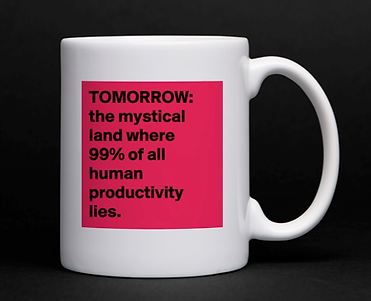
Put your own motivational quotes on mugs, T-shirts, and hoodies at https://boldomatic.com/
Surprising Ways Successful Graduate Students Spend Their Summer
With summer’s slower academic pace, even new graduate students need to leverage the time well. Chronicle Vitae’s free booklet advises setting aside 10% of your time to building your future. Key areas to work on include identifying publishing venues and grant sources, honing research presentation and teaching skills, and developing other skills such as language or computer proficiency.
If you are headed for the fall job market, summer preparation is essential to prevent overload in the fall. You can spruce up your CV, organize a spreadsheet to track your applications, create a teaching portfolio, and pull together an interview wardrobe. You’ll also find tips for writing and publishing, for surviving on a shoestring, and for enjoying your summer. Imagine your September self celebrating your completed writing, new skills, and great vacation time!
How to Stop Working at 5 pm and Still Finish: Do “Deep Work”
Yearning for uninterrupted stretches of time for dissertation work? Has the internet and social media have turned you into a mere “human router” with shallow work habits, e.g., handling email and interruptions? If you want to finish, you must shift to doing “deep work.”
“Spend enough time in a state of frenetic shallowness and you permanently reduce your capacity to perform deep work,” asserts Cal Newport, a Georgetown U professor of computer science. On the other hand, resisting interruptions or alternating tasks may actually improve brain infrastructure for productivity.
In Deep Work: Rules for Focused Success in a Distracted World, Newport describes prolific professionals and academics who end their workdays by 5 or 6 p.m. How do they manage this feat? By focusing on depth, i.e., sustained concentration on important projects, rather than breadth. Newport takes refuge in the library, while J. K. Rowling opted for a luxury hotel. Bottom line: Create your own strategy now for prioritizing your deep work.
The Essential Resource You Keep Wasting
“What we attend to creates our lives—attention is the most essential human resource, fundamental to our lives, to our relationships, and our quality of work.” ~ Jeremy Hunter.
Hunter concurs that we need to do more deep work. That means learning to manage our attention. Think about the last time you were in the zone. Chances are you were intensely focused on your work. “Focused attention leads to our most exhilarating moments of being alive,” Hunter observes.
You pay an extraordinary price for mismanaging your attention. Intrusions provoke more stress, exhaustion, and pain. Interruptions that last a mere 2.8 seconds can double your mistakes and keep you out of flow for nearly an hour.
In short, deep thinking requires deep focus. If you want to optimize your performance, you must learn to manage your attention. Read on for how to create new habits for this.
Six Secrets to Building and Keeping Healthy Habits
You need about 66 days to build a new habit. . . and that is only if you do it right. The awesome blogger Eric Barker summarizes the evidence-based strategies for how to make habits stick:
-
Start with “Keystone Habits”: Begin with something like exercise, which that leads to improved diet and productivity. Alternate writing with activities that refresh and energize you.
-
Use “Minimum Viable Effort”: Keep the bar low so you will really do it. Proofread one page.
-
Make a simple plan: When and where will you do it? Make—and honor—appointments with your dissertation. (More on this here.) I will start outlining chapter two at 9 a.m. Tuesday in the library.
-
Reward yourself: For each “should,” have one “want” or reward. When I finish the outline, I will treat myself to a Chocolate Chip Frappuccino (but make it a skinny).
-
Use reminders: Use agendas, lists, and alarms. Put your dissertation appointments in your Google calendar app and set a notification to remind you.
-
Get help from friends: Socialize with supportive friends and family. Create a dissertation writing group. Avoid slackers and downers.
[One more tip: Frame your new habit in terms of your most central values or highest goals, e.g., “I am creating a fulfilling future for myself.” ~ Gayle]
APP OF THE MONTH: OUT OF MILK
Carve out more time for deep work by optimizing shopping errands. While no one has come up with an app that vacuums or cleans, you can simplify grocery and other tasks with the top-rated Out of Milk android app. (iPhone users might try AnyList.)
Enter items quickly on your phone whenever they occur to you. You will have your list handy whenever you need it—cutting down on extra trips to the store because you forgot your list. And lists can be synced across devices and shared with others.
You’ll zip through the store fast and undistracted because the app automatically classifies items as produce, dairy, pantry so on. You can also create lists for Pharmacy, Home Goods, and To Do that make it easy to check off all those errands in one trip.
~Compiled by ABDSG Editor Gayle Scroggs, Ph.D. Write her here.
What Really Makes You Procrastinate--And Proven Ways to Get Back on Track | Issue 209
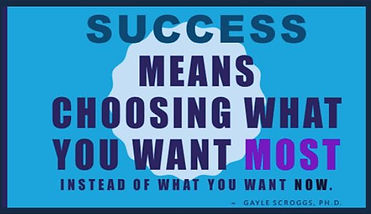
Editor's Note: Would You Rather Feel Good or Finish?
What are your favorite ways of procrastinating instead of dissertating? TV? Facebook? De-cluttering? Or an ABD perennial favorite, reading another research article? What else?
Take a moment to think back the last time you decided to put your dissertation on the back burner. Chances are that you were beset by anxiety or feeling stuck. And you decided to go for feeling good instead of doing well.
You are not alone if you choose delaying tactics in order to avoid feeling frustrated or fuzzy. But choosing a short-term positive mood gain over the long-term benefit ultimately backfires, as the data on failure to complete doctorates reflects.
If you want to go from putting things off to getting things done, keep reading. Dr. Karen Forbes, an esteemed therapist and coach, will share evidence-based strategies that promote sustainable progress and goal attainment.
Wishing you success and well-being,
Gayle
Gayle Scroggs, Ph.D., P.C.C.
Editor
Words from the Wise
"Procrastination is the thief of time, collar him." ~ Charles Dickens
"Procrastination is opportunity's natural assassin." ~ Victor Kiam
"Someday is not a day of the week." ~ Janet Dailey
"Only put off until tomorrow what you are willing to die having left undone." ~ Pablo Picasso
"You may delay, but time will not." ~ Benjamin Franklin
"Procrastination is the biggest problem in academia." ~ Timothy Pychyl, Ph.D.
The Secret to Conquering Procrastination: Master Your ETA
By Karen Forbes, Ph.D.
How guilty are you when it comes to putting off your dissertation work?
Don't despair. You can learn how to quickly identify and then navigate the three major roadblocks that are keeping you from reaching your destination. Master these strategies and you'll soon be getting that hood and velvet stripes.
Delaying a task makes sense when you have more pressing needs. But when putting things off has long-term negative consequences, it crosses the line into procrastination. That's dangerous.
Success requires developing effective strategies to conquer the natural human tendency to procrastinate. The fastest way to do that is to check in on your emotions, thoughts and attitudes—your personal "ETA profile"—when you are tempted to wander off track.
Why do we put off something when we know it's likely to make our life worse?
We procrastinate because we want to feel better.
Procrastination often involves an aversive emotional state that we are driven to reduce or eliminate. This tendency to focus on fixing our bad mood instead of on accomplishing our tasks is "giving in to feel good," explains Timothy Pychyl, Ph.D., in Solving the Procrastination Puzzle.
Unfortunately, using procrastination to avoid a bad mood only reinforces the connection between avoidance and feeling better. That's about as helpful as repeatedly allowing a kid to raid the cookie jar instead of eating a healthy lunch.
Every time you put things off you are strengthening a bad habit that then becomes very hard to break.
Furthermore, procrastination robs you of the opportunity the relief and pleasure derived from accomplishing an important yet dreaded task—the very experiences that would build an achievement habit.
How many times have you noticed that performing many such tasks, e.g., writing the results section or tracking down an article, turn out to be much less painful than expected? Wouldn't you rather trade feeling guilty for a sense of accomplishment?
The ability to regulate emotions and resist temptation varies from person to person. Someone who tends toward impulsivity and low levels of deliberation may be more susceptible to procrastination's sly tug.
[Author's Note: Curious about your personal susceptibility to strong negative emotions? Take a version of the Five Factor Personality Inventory here: http://personal.psu.edu/j5j/IPIP/. But don't use it to procrastinate!]
MANAGING YOUR DISTRACTIONS AND NEGATIVE MOODS
If you struggle with distractions, remove temptations from your work site. Do you need to leave your phone or iPad in the kitchen? Many dissertators rely on internet blocking apps such as RescueTime to thwart detours to favorite websites.
Getting familiar with your negative emotions will also enable you to respond more effectively. Try any of these four strategies to manage them better:
1. Next time you hear yourself saying "I'll do this later" or "One episode of Netflix will help me get in the mood to work," pause.Acknowledge that there is likely to be an emotional state you are trying to avoid. Ask yourself, "What's really making me feel this way right now? What am I trying to run away from?"
2. Sit with the emotion for a certain period of time. Use the countdown clock on your phone or an old fashioned timer to make sure you let yourself experience working on your dissertation at the same time you are feeling the negative emotion. Your mood does not have to interfere with doing the task.
3. Remember that you feel many emotions simultaneously. Part of you might be feeling anxious or bored, but you might also be feeling proud, curious, or interested. Imagine your concentration is a compass needle and you are exerting a magnetic force to pull it away from the aversive emotion and toward to more positive or neutral one.
4. Take a moment to recall a time in your life when you felt awe or wonder. These emotions are strongly associated with well-being and can lift your mood enough to help you get started.
"I'M WAITING UNTIL I FEEL LIKE WRITING"
How often have you thought that you have to feel like working on your dissertation in order to be productive?
Research on procrastination refutes this belief. You are better off not waiting for your muse to appear.
Do you cite fatigue and lack of concentration to justify putting things off until you "feel like it" at times? Perhaps your long day of teaching, researching, and caring for others has convinced you that you have exhausted the inner resources needed to dissertate.
Indeed, that "ego depletion" view is corroborated by willpower research led by Roy Baumeister, Ph.D. Various studies showed that after expending considerable energy on one task, subjects tended to perform more poorly on subsequent tasks unless given a boost or a rest, leading to the metaphor of "willpower as a muscle."
However, your belief in the limits of willpower energy just might be more important than the actual energy you've spent.
Investigators at Stanford and Zurich have recently found that individuals who reject the belief that willpower is limited procrastinate less. Instead, they focus more on how previous challenges can prepare them for future ones.
How you frame failure and delay can also raise or lower your motivation to get down to work. Focusing on very short term goals ("I will write 200 words") can prove more effective than focusing on the long term ones ("I will fulfill a childhood dream.")
Feeling that you are failing at a goal tied to your core values can stifle progress.
HOW TO MANAGE YOUR THOUGHTS AND SELF-TALK
You can still make progress while feeling discomfort by implementing these strategies:
1. What's the evidence that you can only work when you "feel like it?" Use your scholarly skills to test your assumptions about the limits of your capacity to get some writing done—even at the end of the day.
2. Consider other tasks you do even though you don't like them. All of us have unpleasant, boring, or even daunting tasks on our to do lists: washing clothes, talking with an undergraduate disputing a grade, going through airport security, cleaning up after others, etc. We do them anyway.
3. Use helpful self-talk to get back into action when you catch yourself making excuses: "I'm uncomfortable right now—but I am still able to describe my methodology or summarize these two articles. I will tolerate discomfort and see what happens."
4. Be on the lookout for the catastrophizing thoughts. "I'm never going to get a job if I can't finish this paragraph!" can be reframed to focus on a new, short-term strategy. Aim to deal with the small task at hand rather than slipping into demoralizing self-talk about the distant future: "It's just 50 words; I've done that plenty of times."
Design Your Attitudes and Intentions Carefully
Does positive thinking help us achieve our goals? Not necessarily.
While envisioning a smiling Dean bestowing your doctoral diploma, too much fantasizing can actually lower your ability to anticipate barriers and plan accordingly, asserts Gabrielle Oettingen, Ph.D.
The high you feel while fantasizing having reached your destination can easily trick your mind into thinking you have actually accomplished your goal-and lower motivation dramatically.
In order to be effective, Oettingen has concluded that you must also visualize the potential obstacles between you and your goal. Mentally contrasting the achievement fantasy with the inner as well as outer obstacles will energize you to become more realistic about your procrastination tendencies and create your plan accordingly.
Meanwhile researcher Peter Gollwitzer, Ph.D., has found that precommitting yourself to action is an unusually effective strategy for avoiding procrastination. Creating an "implementation intention" to complete a specific task at a specific time more than doubles the likelihood of follow through whether your goal is writing or sticking to a diet, writes Heidi Halvorson in Success: How We Can Reach our Goals.
Also known as "if-then planning," such commitments also reduce emotional distress and decision fatigue. It is key to state the starting time or conditions, as in "If I have finished putting the dinner dishes in the dishwasher, then I will turn off my phone and summarize the next article for the literature review."
A simple "if-then" plan has a lot better chance of working than saying "I'll try to get some work done on my dissertation by the end of this week."
Spin your wheels less by doing the following:
1. Break down each aspect of your writing or research. Find the smallest component parts possible. Then identify the very first step you need to take to accomplish that subtask.
2. Schedule a specific time and place for doing that subtask.
3. Anticipate the inner as well as outer obstacles. What emotions, thoughts, and attitudes might get in the way of getting started on that subtask? Create a plan for how to overcome them, using the aforementioned strategies as necessary.
The next time you are tempted to stray from your dissertation journey, check your ETA—emotions, thinking, and attitudes—and take appropriate action to get back on course. Enjoy the satisfaction of moving one step closer to getting your doctorate!
Recommended Reading on Procrastination and Self-Regulation
-
Willpower: Rediscovering the Greatest Human Strength by Roy Baumeister, Ph.D., and John Tierney
-
Success: How We Can Reach Our Goals by Heidi Halvorson, Ph.D.
-
Rethinking Positive Thinking by Gabrielle Oettingen, Ph.D.
-
Solving the Procrastination Puzzle by Timothy Pychyl, Ph.D.

Dr. Karen Forbes is a licensed psychologist and coach who specializes in working with individuals in higher education communities. She helps clients focus on solutions instead of on problems, clarify what they wantinstead of what they don't want, and do things now instead of later. Contact her: Karen.Forbes@ActionStepsCoaching.com
How to Conquer Stress & Your Inner Critic (and Get Crazy with Dissertation Titles) | Issue 208

Four Surprising Benefits You Get from Decluttering Your Space
Got clutter? How about that mess on your desk or in your closet or car or backpack?
You've experienced clutter's downside—time wasted searching for stuff, embarrassment or anxiety about others' reactions, inconvenience to yourself, and more. Surprising benefits await you should you get organized, according to research cited by Goodnet:
1. Decluttering promotes relaxation. The less you deal with stuff, the less anxious you will feel.
2. Decluttering can help others. Donate your discards from clothing to musical instruments to those in need. Bonus: You get a mood boost at the same time.
3. Decluttering purifies the air. Tidy up your desk to improve air quality—good for mind and body.
Use This Simple Trick To Boost Self-Esteem and Memory
Check your posture. Do you slouch when seated? If so, you can improve your mood, self-esteem, energy, and recall by doing one simple thing: Sit up straight.
Your bodily cues, including posture, influence your emotions.
In a one study, subjects answered mock job-interview questions while sitting either slouched or upright. Compared to slouchers, upright folks felt more enthusiastic, excited and strong, reduced fear, and higher self-esteem.
"Sitting upright may be a simple behavioral strategy to help build resilience to stress," conclude the University of Auckland researchers.
For more: Did you miss Amy Cuddy, Ph.D., demonstrating "power poses" in her wildly popular TED talk ? Her new book Presence builds on the body-mind theme while offering user-friendly strategies to tap your personal power.
How to Disable Your Inner Critic in Five Easy Steps
How much valuable mental real estate gets occupied by your inner critic? For in-the-moment relief, try this simple mindfulness meditation based on Mark Bertin's recommendations in Mindful:
1. When you hear an inner criticism, consider what you'd do if someone else said it. ("Gotta go now.")
2. Notice it without debating it while you pause to breathe.
3. Breathe in. Acknowledge any emotions without analyzing or resisting. ("Right now I feel frustrated".)
4. Breathe out, letting go. See the experience for what it is, then shift your focus to something more useful without self-judgment.
5. Offer yourself compassion. Visualize being at ease with each exhalation.
Self-coaching tip: For a bigger boost, name your inner critic. Now notice when "Downer Dan" or "Nagging Nancy" shows up—greeting him or her by name: "Oh, there you go again!"
Crazy Dissertation Titles You Won't Believe
These alternative thesis titles at lolmytheses.com sent the ABDSG staff rolling on the floor. The site challenges thesis writers to "sum up years of work in one sentence." Can you top the disarming transparency of these? See more at the website.
Blowing stars up with a bigger computer than the last guy. (Astrophysics, Stony Brook University)
If you want people to make good decisions about climate change policy, tell them about it when it is really, really hot.(Geography, University of Colorado - Boulder)
It turns out that Craigslist and Facebook are better for finding significant others than actual dating sites, because people actually secretly like chance, fate, romance and mystery more than straightforward compatibility algorithms. (Sociology and Psychology, University of Arizona)
Being pregnant and giving birth in sixteenth and seventeenth century England sucked. (History, Glendon College)
It is hard to collect, exhibit, or de-accestion indigenous art objects in museums without being patronizing or racist, sometimes museums do a good job, but usually not. (Art History, Theory and Criticism, Maryland Institute College of Art)
The government hiring people is a good way to bring down unemployment; we stopped doing it because we are stupid.(Policy History, UCSB)
How to Boost Your Willpower with Indulgences
As Sarah Jessica Parker said, "Every once in a while a girl has to indulge herself." Her claim now has garnered empirical support.
A 2016 ground-breaking study reported in PsyBlog found that when dieters planned one "naughty day" per week, they stuck to their diets better. They also reported more pleasure and motivation and lost as much weight as the non-cheaters.
Researchers theorized that non-cheaters wear out their willpower muscle by exercising it frequently in resisting temptation. Giving yourself permission to indulge now and then appears to lower the likelihood of a total breakdown of self-regulation.
Our recommendation is that you plan to goof off at least a few hours this week. In the long run, you'll get more done and enjoy the ride more."
All work and no play is not your best strategy. Instead, schedule regular small fun breaks along your path to your doctorate.
Note: Planned time outs work better than spontaneous detours that often evoke a sense of failure—prelude to the dreaded, goal-killing "what-the-hell" effect.
Avoid Eating This To Dodge Daytime Drowsiness
If you want to stop dozing off while trying to read or write, cut out the fries, donuts, ice cream, and other high-fat foods. [Did you know there are 12 grams of fat in a single Starbucks Bountiful Blueberry Muffin? And 24 in a large order of McDonald's fries?]
"After adjusting for other demographic and lifestyle factors, and chronic diseases, we found that those who consumed the highest fat intake were more likely to experience excessive daytime sleepiness," reports Yingting Cao, a Ph.D. student at Adelaide University, and her colleagues in the journal Nutrients.
A poor diet-and-sleep pattern can easily become a vicious cycle since sleepy folks experience more cravings for high-fat, high-carb foods, which in turn is associated with poor sleep outcomes. So get a good night's sleep first, and then choose your foods wisely.
P.S. For better concentration, coffee, chocolate, blueberries, oily fish, avocados, and whole grains are recommended by WebMD. So how about a tuna and avocado sandwich on a whole grain roll with your iced coffee for lunch today? Check out which fats are best for you.
Best Career Tips for Doctoral Students: Beyond the Tenure-Track Option | Issue 207
Reading time this issue: Under 10 minutes (that will forever change how you plan your career)
-
Editor's Note: Who Will Be Your Career Advocate?
-
Feature: Best Career Tips for Doctoral Students: Beyond the Tenure-Track Option
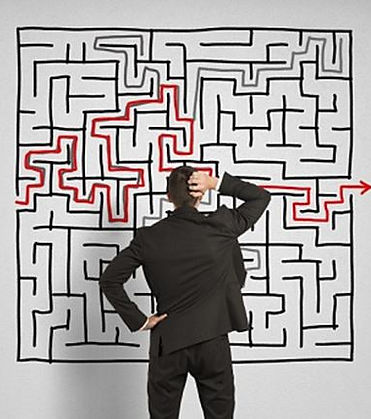
Editor's Note: Who Will Be Your Career Advocate?
When did you last dare to try something you might fail at?
Every grad student needs an advocate when it comes to career planning.
If you are not already developing your career options, start right now. Even for new doctoral candidate, early and consistent planning will be your best route to a satisfying life after graduation.
That recommendation comes from one of the nations' most articulate graduate student advocates, James Van Wyck of Fordham. In our interview with him, James offers several cutting-edge tips you can put to use now—because the best advocate for your future success is you.
Graduate schools have been exceedingly slow in offering preparation for anything other than academic positions—which are few in number. But savvy students, he explains, can investigate entrepreneurial and governmental venues to discover the best matches for their talents and interests. They should be developing their career network long before they begin job hunting.
An Alumni Dissertation Fellow at Fordham University, James cares deeply about the future of graduate students. You may have seen his articles on the subject in The Chronicle of Higher Education or in Inside Higher Ed. We're delighted that he has taken the time to speak directly to our readers.
We would also love to hear what you are doing to be your own best career advocate. What tips would you offer other grad students? What challenges and successes have you experienced? Email us at gayle@mcpcoach.com with the subject line "Careers" please. Here's to your degree and career success!
Gayle
Gayle Scroggs, PhD, PCC
Editor, ABD Survival Guide
Feature Article
BEST CAREER ADVICE FOR DOCTORAL STUDENTS: BEYOND THE TENURE TRACK OPTION
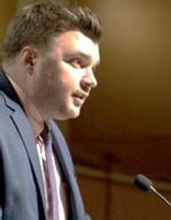
[Transcript of the All-But-Dissertation Guide interview with graduate student advocate James M. Van Wyck of Fordham University.]
ABDSG: What do you think are some mental hurdles that doctoral students face in preparing themselves for life after graduation?
James Van Wyck: I'd start with what I think is the biggest: don't think of yourself as a student, think of yourself as a professional. And don't get lulled into thinking you can't try on other roles in graduate school. Thinking of yourself as "in school" might mean you forget that it's ok (and even advisable) to be entrepreneurial in how you approach your graduate education. Make the time to look beyond the borders of your discipline and institution.
I would also suggest taking time to examine and perhaps adjust your behavioral patterns. For example, in today's job market (including the tenure-track job market) you can't afford to be shy about self-promotion. You need to circulate your work, to reach out and form relationships with senior scholars, and to collaborate with your peers and partners beyond academia.
ABDSG: If I become more entrepreneurial, I am concerned about how my advisor might react. This is not the time to get on the wrong side of the gatekeepers. How should I proceed?
JVW: This is a huge concern for graduate students, and a very real one. Time after time, surveys conducted by organizations like the National Association of Colleges and Employers (NACE) tell us that graduate students don't do things they should (explore other options, spend time on projects outside academia, visit a career center, and so on) because they are afraid of what their advisor will say and do. So you aren't alone.
I have two simple strategies: first, conduct your parallel activities on a different channel. You needn't tell your advisor everything, and s/he will most likely not find out. I think graduate students often imagine that graduate advisors think about their advisees a lot. They do not. While graduate students tend to think about their relationship with their advisor way too much, I've yet to find the reverse to be true. Graduate advisors are typically high-performing faculty who simply don't have the time to worry about you when you aren't in front of them.
To help conduct this stealth campaign, start putting together a board of advisors, rather than relying on one person for all your advice. Reaching out like this will help you not only prepare for a variety of careers, but it will gradually lesson the spell that your advisor has over you. You'll empower yourself to sift through various types of advice, and pick and choose what is most appropriate in each case. If you have an advisor who thinks preparing for multiple careers is wrong, you can simply ignore this piece of advice, and seek counsel on this front from other quarters.
Second, you might need to fire your advisor. It may not be easy, but neither is having an anchor around your neck. Advisors who live in the 1970s aren't much help in today's job market. Read this article from Leonard Cassuto to diagnose your relationship with your advisor. If you need to fire your advisor, read Cassuto's advice on the subject. Then grit your teeth and take control of your future by finding a new advisor.
ABDSG: Your advice doesn't apply to me as I am totally committed to seeking a tenure-track position after graduation.
JVW: Your statement implies that those who don't secure tenure-track jobs fail because of a lack of commitment. That's not the reason they fail. There's a cruel calculus at play here, and effort and commitment are sometimes beside the point. The numbers of tenure-track jobs shrink every year, and there aren't enough jobs to go around, even for the over-qualified candidates now coming out of graduate school. So you need to know the math, and you need to be preparing for a variety of careers.
And here's an interesting twist: the skills you develop by being open-minded about potential careers may just be the skills that push you over the edge in a tightly contested tenure-track job search. The idea of an academic job is changing underneath our feet, thus the models many grad students see on a daily basis (i.e., tenured faculty at research universities) are often not the kinds of models to copy. On the other hand, look at the profiles of young faculty members at selective liberal arts colleges, and you will see that their CVs are increasingly incorporating public-facing projects.
In what ways might government agency jobs be a good alternative to working in the academy? And how is this avenue best pursued?
The U.S. government employs more PhDs than any other single employer, and these PhDs are not all in Washington, D.C. In fact, when you spend time on usajobs.gov, you are almost certain to find a job that interests you.
Candidates with a Master's or PhD are able to apply for higher level positions, so be sure and read up on the tiered system before you apply. A great way for graduate students to see if civil service jobs are a good fit is the Presidential Management Fellows Program. A great resource for the transition from academia to government work is Alexandra Lord, who I interviewed a while back. Be sure and check out her website, Beyond Academe.
How can I best find a non-academic job where my educations and skills will be valued? For example, I like to write, and I want a job that will allow for life-long learning. What kinds of workplaces will value my critical analysis skills and my desire to publish?
I'll give you a quick answer: start reading job ads and researching companies that sound interesting to you. Look at non-profits and startups, established firms, and boutique outfits. In short, do your homework. Begin with the job boards over at Versatile PhD, and go from there. Keep your mind and options open!
What's one skill I should be working on while in graduate school (but probably haven't)?
Public speaking comes to mind. And not the Tony Robbins brand of public speaking. I mean learning to be aware of how you are presenting ideas (and yourself) in a variety of contexts. You can read my thoughts on the subject here.
How should graduate schools get involved in creating a mindset shift that would help graduates find satisfying employment?
Graduate education, particularly in the humanities, is shifting underneath the feet of graduate students. And I think that's why it is really important for graduate deans and provosts to listen to those with their ears closest to the ground. The short answer is that graduate schools must give their own students a voice in strategic planning, a topic I wrote about with a colleague just a few months ago for The Chronicle of Higher Education. I'm gratified to see that graduate schools are responding to the changing times in ways that even two or three years ago were unheard of.
James M. Van Wyck is an Alumni Dissertation Fellow at Fordham University. Over the past several years he has held various posts at Fordham, including Facilitator for Graduate Student Professionalization in the Graduate School of Arts and Sciences, where he helped shape the Fellowship in Higher Education Leadership. His writing can be found in venues such as The New England Quarterly, The Chronicle of Higher Education, and Inside Higher Ed. Follow him on Twitter: @jmvanwyck
YOUR OWN COACH
If you are considering whether to get your own coach to help you reach your academic goals, fill out this brief application for a free consultation with a dissertation coach.
Feel like a Fraud? 5 Tips to Vanquish the ABD Impostor Syndrome | Issue 205
Reading time this issue: Under 10 minutes
-
Why You Must Dare to Fail
-
Words from the Wise on Self-Doubt and Vulnerability
-
Stop Feeling like a Fraud: Five Expert Tips to Conquer Your ABD Impostor Syndrome Registration for Free Teleworkshop, Overcome the Impostor Syndrome
FREE ABDSG Teleworkshop March 14: OVERCOME THE IMPOSTOR SYNDROME
Feel like a fraud? Worry if you are smart enough to finish a doctorate?
Master proven concrete tips to overcome or prevent the impostor syndrome while you finish your dissertation
DETAILS & REGISTRATION FOR THIS FREE CALL BELOW.

Editor's Note: WHY YOU MUST DARE TO FAIL
When did you last dare to try something you might fail at?
For me it was late January—when I joined our local CrossFit gym.
CrossFit seemed like a big stretch for someone used to mere walking, but when my daughter Sara "incentivized" it, I took the bait.
A rowing machine won't get anyone trembling. But when was the last time you hoisted a barbell? How about planks and pushups? As Cross Fit regulars swung themselves up on overhead bars, I watched in awe, unsure of what I had just signed up for.
Watching the more fit folks streak past me at first could have led me to quit. But my trainer scaled things down for me, while everyone encouraged me to just keep at it. No smugness. No comparisons.
What a valuable lesson they offered me—one seldom offered in school and work environments. All too often we judge ourselves and get judged on how well we perform before we've had a chance to develop our potential.
What about you? Do you tend to set the bar too high, literally and figuratively, with new challenges? Do you place it at the expert level (often the most salient)? Then when you don't clear it, do you give up? Or worse, do you let fear of failure keep you from taking a shot in the first place?Fear of failure provokes self-limiting doubts—the kind that define impostor syndrome. This pernicious condition hits doctoral students especially hard, with drastic impacts on academic progress and career choices.
When was the last time you felt like giving up on your dissertation? Doubted your ability to finish? Felt like a fraud around other students and faculty?
If you find yourself struggling with negative feedback on your latest draft while congratulating your peers who just defended their dissertations, it's easy to forget your own strengths. You start wondering if you really have what it takes to finish.
Impostorism can affects post-graduation goals as well. Collet and Avelis found it outranked all other factors in explaining why women downshifted goals away from research institutions and toward teaching institutions—especially in the humanities and social sciences.
What makes us so vulnerable to the impostor syndrome?
Who gets to witness the inner doubts or years of struggle others undergo on their way up the ladder? Without that awareness, you feel like a fraud next to established folks who now make it look easy. You wonder when you'll be found out as an inadequate, inferior being let in by mistake.
Sure, your first draft might look dismal next to the published articles and dissertations you have read. But it would likely hold up well next to first drafts by other ABDs.
Think the impostor syndrome only hits the untalented or uninitiated? Nope. High achievers are the most likely succumb to it, as illustrated by this remark by celebrated novelist and poet Maya Angelou:
"I have written eleven books, but each time I think, 'uh oh, they're going to find out now. I've run a game on everybody, and they're going to find me out."
If you've ever felt any of the symptoms of the impostor syndrome, don't miss our expert strategies for overcoming it below. It's time for you to enjoy your learning and celebrate your successes!Here's to your path and your success!
Here's to your path and your success!
Gayle
Gayle Scroggs, PhD, PCC
Editor, ABD Survival Guide
P.S. I can now hold a plank for over 60 seconds. :)
WORDS FROM THE WISE: ON SELF-DOUBT AND VULNERABILITY
"The trouble with the world is that the stupid are cocksure and the intelligent are full of doubt." ~ Bertrand Russell
"Our doubts are traitors, and make us lose the good we oft might win, by fearing to attempt." ~ William Shakespeare, Measure for Measure
"If you hear a voice within you say 'you cannot paint,' then by all means paint and that voice will be silenced." ~ Vincent Van Gogh
"I don't believe anyone ever suspects how completely unsure I am of my work and myself and what tortures of self-doubting the doubt of others has always given me." ~ Tennessee Williams
"Every album, I'm worried that I'm a dork and a fraud--'What if I can't sing anymore?' then I stop thinking and start playing guitar, and I realize that it's okay to suck, and move forward." ~ Pink
Video pick: "The Power of Vulnerability," by Brené Brown, TED Talk, December 2010.
Feature Article
STOP FEELING LIKE A FRAUD: FIVE EXPERT TIPS TO CONQUER YOUR ABD IMPOSTER SYNDROME
By Eva Ross, Ed.D., and Gayle Scroggs, Ph.D.
Ever feel like a fraud while working on your doctorate? Do thoughts like these nag you when you try to work on your dissertation?
• "I am too tired to work on the lit review—I'll wait until a more ideal time."
• "My chair tore my chapter apart; I must not be as good at writing as I thought."
• "I just need to read a few more books before I get started."
• "I am determined to do this on my own—I will not lower myself to ask for help."
• "I should be able to juggle it all—work, family, and school-and not drop a ball."
• "I don't need to know everything, I just need to find it when I need it." ~ Albert Einstein
If any of these sound familiar, chances are you have developed a good case of the impostor syndrome. Let's look at how to cure it—or at least tame it into submission.
THE IMPOSTOR SYNDROME: COMMON COLD OF THE ABD?
Statistics and experience show that you have considerable company, including ours.
Eva's experience: When I received the acceptance letter from my chosen doctoral program, I worried that it might just be a clerical error. I called a colleague to make sure it was for real. As time went on, I learned that I was in fact "good enough," although there were moments of "impostorism."
Gayle's experience: While finishing my dissertation as a full-time instructor, I suddenly became haunted by a crippling fear of not having created a doctorate-worthy masterpiece. At a faculty meeting one wintry afternoon, I gazed around the table at some of my less-than-amazing Ph.D. colleagues and realized, "If they merit a doctorate, surely I do too!" I defended in March.
The fear of not being good enough, of being an intellectual phony, is pervasive among doctoral candidates. This damaging yet pervasive fear leads to a perpetual anxiety about being unmasked as unworthy of the degree—even after earning it.
In The Secret Thoughts of Successful Women, Valerie Young, Ed.D., develops the impostor syndrome concept originated years earlier by Pauline Rose Clance, Ph.D., and Suzanne Imes, Ph.D. She reports that a surprising 70 percent of people studied suffered from impostor syndrome symptoms at one time or another, especially high achieving individuals. Graduate students and women appear to be especially susceptible.
Drawing on the work of Clance and Imes, Young and others, we will explain what makes you vulnerable and how you can banish the impostor syndrome so you can finish your dissertation and move on with confidence.
WHY YOU THINK "I'M JUST NOT GOOD ENOUGH"
A healthy sense of competence develops in parallel with your actual mastery. Explaining away your successes as to luck, favoritism, or other circumstance leaves you vulnerable to the twin arrows of anxiety and doubt when new challenges arise, providing fertile ground for the impostor syndrome.
When you caught in its grip, you are more likely to describe your competence in self-sabotaging ways that are inherently unsustainable. Young describes five such types: the Perfectionist, the Natural Genius, the Expert, the Rugged Individualist, and the Superwoman/Superman/Super-Student, each with unrealistic, self-imposed rules about competence.
WHAT IS YOUR COMPETENCE TYPE?
Read Young's classifications below and highlight any that resonate strongly with you. Then read on to learn how to overcome these handicapping thoughts so you can finish your dissertation and future projects with confidence.
The Perfectionist: "my work must be not just good or great, but flawless." The best way to describe the perfectionist may be "Everything I do must be 100% perfect, 100% of the time." Do you put off writing until the time is just right, when you feel inspired, rested, etc.? Do you keep revising the same section to get just the right word—thus getting far behind schedule?
The Natural Genius: "It should always come easily for me." If you are "a natural genius," you judge success based on ability, rather than effort, in working on the task. For you, having to work hard implies incompetence. For example, "If I were really good at writing, I would not have to rewrite anything."
The Expert: "um, am I qualified to speak on this yet?" Do you create self-imposed hurdles by imagining that you need more studying, more certificates, or another diploma before you can put yourself out there? The fear of not knowing enough easily paralyzes you. The expert is always in rehearsal, never quite getting to the accomplishment stage.
The Rugged Individualist: "I don't need anyone's help." Do you stand on your firm principle that you need to accomplish this all on your own—and that this will establish your competence? Do you refuse to ask for legitimate help—and thereby add unnecessary obstacles and delays to finishing your dissertation?
The Superwoman/Superman/Super-Student: "Watch my juggling act!" Are you convinced you have to juggle multiple roles and do them all well at the same time? Are you plagued by beliefs like this one: "I can be an ace employee, a wonderful mother, and a stellar dissertation student all at the same time."
STRATEGIES TO PREVENT AND RECOVER FROM THE IMPOSTOR SYNDROME
Highly successful people who fall prey to the imposter syndrome see the proverbial glass as more than half empty. They find it hard to appreciate their own inherent worth, personal strengths and talents, and demonstrated accomplishments, as they focus heavily on real or imagined deficiencies.

When feelings of vulnerability then arise, they attempt to combat it by overusing their strengths in ways that ultimately backfire: a commitment to excellence morphs into perfectionism, independence into rugged individualism, and so on.
Self-acceptance is thus sabotaged not only by feeling "not enough," (Brown, 2010, 2013) but also by a "fixed mindset" that equates self-worth with performance, with no allowance for mistakes, a doomed perspective (Dweck, 2010).
What can you do?
Adopting a "growth mindset," one which makes room for learning from mistakes, can help you overcome imposter syndrome thoughts. Also, learning to "dial back" strengths appropriately while developing an appreciation for the power of vulnerability can move you forward. Let's see how to do that for each of Young's types.
1. THE PERFECTIONIST: GO FOR EXCELLENCE, NOT PERFECTION
If you are dogged by impossible standards, it's time to shoot for merely "excellent," and at times, just "good enough." "Research shows that perfectionism hampers success," writes Brene Brown, Ph.D. "In fact, it's often the path to depression, anxiety, addiction, and life paralysis." Give yourself permission to write a lousy draft that you can edit later—you'll finish sooner if you do.
Your new motto: "Giving 100% is not required in all situations."
2. THE NATURAL GENIUS: ACKNOWLEDGE THAT MASTERY TAKES EFFORT
Instead of focusing on proving your ability in everything you do, focus on improving it through practice, urges Stanford professor Carol Dweck. Neural plasticity research shows that most capacities, even intelligence, can increase over time with effort. When struggling to master coding or to revise difficult sections, try this reframing: "Mastery is a good thing; I just need to recognize the time and effort I will need to get there."
Your new motto: "Success does not happen overnight; it takes time and effort."
3. THE EXPERT: EMBRACE LIFE-LONG LEARNING
Do you feel in constant need of rehearsal, yet never ready to go on stage? Are you putting off finishing your lit review until you have read everything under the sun on your topic? Consider this reframe: "A good knowledge base is important, but it is unrealistic for me to try to learn everything about the subject." After all, your dissertation is your first book—not your life's masterpiece. Keep a growth mindset here.
Your new motto: "The learning journey never ends."
4. THE RUGGED INDIVIDUALIST: LEVERAGE RESOURCES
Successful scholars regularly enlist aid from others, from colleagues and family to stats consultants and coaches. Try this reframe: "It is great that I can be self-sufficient if I need to be, but I need to be thoughtful about it. There are times when it's better to draw on other resources." Brown also challenges the myth of going it alone, noting that it hampers the cultivation of connection and authenticity which we need in order to thrive.
Your new motto: "Part of being competent is asking for what you need."
5. THE SUPERWOMAN/SUPERMAN/SUPER-STUDENT: BE REAL, LET GO

We see this as the perfectionist on steroids. Before you drop from overwhelm, see how these reframes work for you:
"I can honor my desire to do many things well, but I do not need to do it all simultaneously."
"Just because a person can do it does not mean that she must do it."
We get sucked into perfection because we imagine that it will protect us from feelings of vulnerability, notes Brene Brown. "Perfectionism is the belief that if we live perfect, look perfect, and act perfect, we can minimize or avoid the pain of blame, judgment, and shame," she asserts. Authenticity is messier, but it's a lot more sustainable.
Your new motto: "Letting go is liberating."
From ABD Impostor to Dr. You
As you replace dysfunctional beliefs with healthy ones, the old ones may surface occasionally as critical voices from the past that can still provoke anxiety if you grab on to them. A good strategy here is to simply acknowledge them and tell them to "go to the back of the bus" because you intend to hang on to the wheel.
Then step on the gas: Write that next paragraph or analyze that next set of data. And keep going even if those bullies holler, because you are driving this bus to your defense and beyond.
When you at last reach the end of your dissertation journey, go right ahead and savor being called "Doctor"—without the shadow of an impostor's doubt. You will have earned it.
Recommended Resources
Brown, Brené. Daring Greatly: How the Courage to Be Vulnerable Transforms the Way We Live, Love, Parent, and Lead
Brown, Brené. The Gifts of Imperfection: Let Go of Who You Think You're Supposed to Be and Embrace Who You Are
Clance, Pauline Rose, and Imes, Suzanne. "The Imposter Phenomenon in High Achieving Women: Dynamics and Therapeutic Intervention," Psychotherapy Theory, Research and Practice, Fall 1978. [pdf available here]
Dweck, Carol. S. Mindset: The New Psychology of Success
Young, Valerie. The Secret Thoughts of Successful Women: Why Capable People Suffer from the Impostor Syndrome and How to Thrive in Spite of It
About the Authors

Eva Ross, Ed.D., C.M.C.
An academic and life coach who resides in the Great Lakes area, Dr. Ross devotes herself to helping graduate students (especially doctoral candidates) conquer the inner and outer obstacles to their degree. Her coaching invites clients to clear their emotional static, allowing them to move toward greater clarity and purpose in achieving important goals and a greater sense of well-being. Contact her at eva@dr-evaross.com.

Gayle Scroggs, Ph.D., P.C.C., C.M.C.
Dr. Scroggs, a positivity and productivity coach, speaker, and ABD Survival Guide Editor, makes her home near Maryland's Chesapeake Bay. A former college professor, she has helped countless students and clients finish and flourish through proven positive psychology strategies. If you are ready to conquer self-doubts and procrastination, harness strengths and motivation, and develop clarity and focus to propel you to your goals, contact her at gayle@essencecoaching.com. Enjoy free resources at www.EssenceCoaching.com.
Free ABD Survival Guide Teleworkshop
FEEL LIKE A FRAUD? OVERCOME YOUR IMPOSTER SYNDROME
with Drs. Gayle Scroggs, Eva Ross, and Nora Misiolek
Join three experienced dissertation coaches for a free one-hour call to master the five strategies and banish the impostor syndrome forever. Get back to your dissertation with renewed confidence and self-compassion.
WHEN: Monday, March 14, 2016
TIME: 7 - 8 PM Eastern Time USA
Receive the call-in number when you register.
REGISTER BY SATURDAY, MARCH 12: Email gayle@essencecoaching.com
In the subject line in all caps, put ABDSG TELEWORKSHOP and your name.
In the body of the email, tell us a little about yourself:
a. What is your field or dissertation topic?
b. Where are you in your doctoral studies?
c. What are your biggest challenges to finishing your dissertation?
d. What would you find most helpful for your situation?
e. Anything else you'd like to ask or tell us?
We'll send you back a welcome letter with the call-in number.
YOUR OWN COACH
If you are considering whether to get your own coach to help you reach your academic goals, fill out this brief application for a free consultation with a dissertation coach.
Awesome tips for accountability, mind wandering, email overload, and more | Issue 204
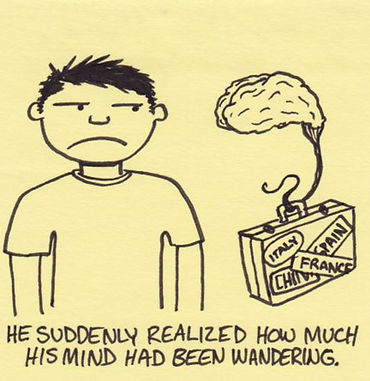
MEET YOUR WEEKLY PAGE GOAL—OR FORFEIT $100
If you had to send a hated organization or personal enemy $100 when you miss your writing goals, would you be more likely to get your dissertation out the door on schedule?
Yes, say the Yale behavioral researchers who created www.Stickk.com. To keep you from the tendency to succumb to immediate gratification, Stickk leverages another human tendency—loss aversion. In short, you are forced to put your money on the line.
You decide the weekly goal, e.g., number of words or pages written, pounds lost, Facebook or TV time quota, etc., and the stake you are willing to bet that you will do it. Then designate one of their "anti-charity" groups (an organization you really don't want to get your dollars) or a friend or foe to get your stake if you don't follow through.
Meet your goal and you keep your money. You also choose a friend to serve as a referee—adding yet more accountability. If you feel stuck because you lack motivation or accountability, Stickk could be worth a try. For more details, visit www.stickk.com.writing habits turn out to be the key to finishing your dissertation.
HOW TO STOP YOUR MIND WANDERING WHILE DISSERTATING
Your brain did not evolve to write a dissertation, alas. Writing diligently requires a single-minded focus that your hunter-gatherer ancestors did not need.
But you can create effective workarounds, say the authors of One Second Ahead: Enhance Your Performance at Work with Mindfulness. Given that the human brain is better wired for multitasking, you get a dash of dopamine and gratification for finishing low priority tasks like checking email or straightening the pencil drawer.
That impedes the single focus you must have in order to be productive. Successful work (such as dissertating) necessitates managing interruptions due to distractions and stress. Rasmus Hougaard and his two coauthors offer two simple mindfulness-based rules to boost focus and work output:
(1) Focus on what you choose to do. Becoming mindful allows you to choose long-term gratification over short-term gratification. Ask, "What will matter in the long run?"
(2) Handle your distractions mindfully. As interruptions occur, be strategic about how you handle them to maintain your control. Ask, "Must it be done now— or can it be dismissed or deferred?"
This approach gets you working with your brain's natural tendencies. Furthermore, mindfulness increases the brain's serotonin levels, thus dampening the usual dopamine-based vulnerability to distraction.
APPLE APP OF THE YEAR: FIRST AID FOR YOUR OVERFLOWING INBOX
Solve your overstuffed email inbox problem with the Spark app for the iPhone and Apple watch. Its 4.5 rating from users propelled it to Apple's "App Store Best of 2015" list.
This free app from Readdle helps you retake control using "intelligent" automatically sorting incoming mail for faster, easier processing. You can find your most important messages easily and even "pin" them so they don't get swamped by new emails.
Additional features like Smart Search allow you to use natural language to sort through your messages, save emails as PDF files, and sync with tools that you use like Google Drive or OneNote. Download here or at iTunes.
Heads' up from Cult of Mac: Watch for the upcoming release of Spark for iPad and a more distant release of Spark for Mac.Android users take heart: You can access similar features with the highly rated Blue Mail app, available here or at Google Play.
VIDEO BREAK: JAZZ UP YOUR MESSY DISSERTATION
Do you consider your dissertation a mess? If it were a piano, would you deem it unplayable?
Then it's time for a jazz break.
First, take 15 minutes to appreciate Tim Harford's TED Talk about the greatest solo piano performance in the history of jazz—and what it says about the role of frustration in fostering creativity. Something magical transpired when Keith Jarret was talked into playing an "unplayable piano" in Koln, Germany, forcing (or inviting?) him to focus on just the keys that worked.
Harford taps cognitive psychology, social psychology, complexity science, and even a little rock and roll in describing how Jarret's and parallel stories illustrate that creativity flourishes when we embrace the mess, obstacles, and frustration inherent in the creative process.
By the end, you will be motivated to bang out some new tunes on the "unplayable piano" of your own dissertation. To double your inspiration, savor the recording of Jarret's celebrated Koln theater performance right here.
FORGETTING REFERENCES OR MEETINGS LATELY? BLAME THE PIZZA
Do you misplace your phone or keys? Forget your chair's great advice? Have trouble remembering where you put that great journal article?
Go ahead and blame the ice cream or cold pizza you polished off before bed.
Research has identified five common daily habits that can exacerbate forgetting: late night snacks, too much sugar, too much tofu, chronic low stress, and being single. Each one of these turns out to impact memory, according to recent reports.
While we don't advise popping the question to the next available single you meet, go for smaller lifestyle changes to boost your memory. How might you begin to integrate exercise and meditation into your routine to reduce stress levels? Make a plan to stop the snacking and reduce your fructose consumption. Commit to consuming more salmon, walnuts, etc., or to taking a daily DHA capsule to get the omega-3 oils that ameliorate the damage.
This issue of ABD.Links was compiled by Gayle Scroggs and Nora Misiolek.
Thank you to the artist at inkjot.wordpress.com for permission to use his cartoon.
_________________________________________________________________________________________________________
GAYLE SCROGGS, Ph.D., P.C.C., Editor, ABDSG.
An accomplished coach, workshop leader, keynote speaker, and educator, Gayle earned her doctorate in social psychology from the University of New Hampshire. Her deep expertise in positive psychology allows her to help clients build their personal strengths, positive habits, and confidence to overcome procrastination, self-doubts and other blocks in order to reach vital academic and personal goals. In addition to editing the ABD Survival Guide, she contributed two chapters to the positive psychology anthology, Women's Paths to Happiness. Contact her at gayle@essencecoaching.com for coaching, presentations, and workshops on thriving in graduate school and beyond, and find free resource www.essencecoaching.com
She also speaks fluent Spanish and delights in new exotic Scrabble words as she savors life in the Chesapeake Bay area, California, and Argentina.
BEN DEAN, Publisher, ABDSG
Ben holds a Ph.D. in psychology from the University of Texas at Austin. He began writing the ABDSG in 1997. Over the years, the ABDSG has published hundreds of articles and provided thousands of hours of pro bono coaching and teleworkshops to ABDs all over the world. Ben is also the founder of MentorCoach (www.MentorCoach.com), a virtual university focused on training accomplished professionals to become part-time or full-time coaches. You may wish to subscribe to the Coaching Toward Happiness eNewsletter! It's on applying the science of Positive Psychology to your work and life (131,000 readers). Ben lives in suburban Maryland with his wife, Janice, their two children, and Dusty, their Norwegian dwarf bunny.
SUBSCRIBE TO OUR OTHER NEWSLETTER
Subscribe to our other free e-mail Newsletter: The Coaching Toward Happiness News
The Seven Habits That Will Get Your Dissertation Out The Door Fast | Issue 203

SUMMARY
Good writing habits turn out to be the key to finishing your dissertation. How many of these seven critical habits have you mastered? Find out what you are missing—and discover how to create a smoother, faster, more enjoyable path to graduation by setting an intention.
EDITOR'S NOTE
Create Your Intention to Finish Your Dissertation—Then Act on It
Resolutions are so yesterday. So don't worry if you've broken or forgotten yours already. What you really need is to set an intention that will contribute to finishing your dissertation.
Setting an intention focuses more on the path than the outcome. To set one, use these two simple steps:
1) First get clear about your intent, e.g., "I intend to honor my commitment to my goal of earning a doctorate."
2) Then follow through by directing your full attention and energy toward it every day. Act as necessary to manifest your intention, e.g., create your outline, code your data, write your lit review, contact your advisor, etc.
Notice that, unlike with a resolution, there is no deadline, no failure, no giving up, andno beating yourself up. If you fall short one day, you forgive yourself and start again the next.
Prime yourself each morning by restating your intention. This creates a readiness "to receive, to sense, to focus, to behave in a certain manner" explains neuroscientist Daniel Siegel in Mindsight: The New Science of Personal Transformation.
No need for perfection—you just need to keep practicing. Every day brings you one day closer to converting your good intention to a solid habit—and one day closer to graduation. Trust the process and discover the satisfaction that comes with honoring your own dream, step by step.
When it comes to developing good writing habits, few know more than my esteemed colleague Mary Beth Averill, Ph.D. Review her seven key habits for ABDs in our feature article below. Then set your intentions, and start practicing. Before you know it, you will be sporting that title of "doctor" and a priceless habits toolkit for whatever you set your sights on next!
Wishing you positivity and productivity as you practice,
Gayle
Gayle Scroggs, PhD, PCC
Editor, ABD Survival Guide
WORDS FROM THE WISE
"Focus on the journey, not the destination. Joy is found not in finishing an activity but in doing it."~ Greg Anderson
"The secret to getting ahead is getting started." ~ Mark Twain
"You might not write well every day, but you can edit a bad page. You can't edit a blank page." ~ Jodi Picoult
"Pay yourself first (money, energy, time, love). You'll have even more to give." ~ Unknown
"Accountability breeds responsibility." ~ Steven R. Covey
"We are what we repeatedly do. Excellence then is not an act, but a habit." ~ Aristotle
Feature Article: Seven Habits that Will Get Your Dissertation Out the Door Fast
By Mary Beth Averill, Ph.D.
Developing strong writing habits has been shown to be the surest way to finish your dissertation as quickly as possible. Waiting for your dissertation writing muse to appear will not get you the gown with hood and velvet stripes.
Cultivating good writing habits now is like investing money in a guaranteed stock portfolio. First, you will finish your dissertation. Second, you will continue to reap dividends and interest throughout your entire career.
There's no question that reliable good writers are highly valued inside and outside of academia, so nurture your inner writer. Imagine the confidence you'll feel now as well as later in job interviews and your future career when you can trust yourself to take on important writing challenges and get them out the door in a timely fashion.
What are the most important writing habits for the doctoral student? Here are seven top ones that I have distilled from my three decades of experience as a coach and mentor:

HABIT ONE: LOOK FOR JOY IN WRITING
"What have you enjoyed about your writing/research this week?"
Obstacles to writing are never hard to find, but focusing on the enjoyment is more likely to help you create and sustain your writing habit. Members in one of my writing groups requested that I ask this question every time we meet. When they can't think of anything, I ask them to "dig deep." Starting the writing process on a positive note has changed the long term tenor of the group and the way group members see their writing projects.
Take time each week to reflect on what you have enjoyed about your writing or research process. Activities that we feel bring us joy and satisfaction become easier to approach than ones shrouded in negativity. Furthermore, positive emotions have been shown to improve energy, creativity, and performance.
HABIT TWO: WRITE FROM THE START
Writing from the start means writing from the very first day of the project.
Unfortunately, too many students think they must wait until they have "something to write." This turns the writing phase into a new or added process rather than a continuation of what they've been doing all along—leading to writing blocks.
However, by cultivating the habit of writing memos to self, taking notes on your reading, or sketching out mind maps and outlines, you'll be able to tap your own momentum.
HABIT THREE: WRITE EVERY DAY—EVEN IF JUST A LITTLE
Academic writers who write every day, even for short periods of time, produce more text in a year than those who don't.
Work on your dissertation in some way every day. When you do, it is always somewhere in your mind, fostering insights that would otherwise be lost.
A big mistake is to insist on waiting for large chunks of time to write. You already know what happens: Those chunks are easily eaten up by emergencies, meetings, and other normal demands of life. So take advantage of short bursts of time until you have longer periods.
There's nothing quite as motivating as success. You set yourself up for success when you commit to short periods of time that you can actually protect. If you aren't feeling very productive, you can tell yourself, "Just 20 more minutes to go...just 15 more minutes...just 5 more minutes..." Should you find yourself getting into flow with time to do more, by all means continue—but first acknowledge and celebrate that you met your initial daily goal.
HABIT FOUR: ADAPT YOUR WRITING TASK TO YOUR ENERGY STATE
Have you had those hours or days when your brain just won't get into top gear?
Be ready with what one client calls a "brain-dead" to do list. These are tasks that must be done but don't require your best thinking or creativity. Examples include data cleaning, adding text citations, editing references, and sorting through notes or archival sources.
Not ready for a real "first draft"? Give yourself permission to work on an outline or a "zero draft." Write memos about articles you have read for your literature review. Use freewriting to summarize what you know about a topic without bothering with footnotes. Spend time editing what you have written. These tasks will also keep you connected to your dissertation and will fulfill the "write every day" directive.
HABIT FIVE: PAY YOURSELF FIRST
Paying yourselves first means that you value the doctoral potential in you, and you value the work you do toward the degree.
Until you finish, your dissertation needs to be a top priority. You can pay yourself first by working on it when you are at your best. That means protecting those times that you have the highest energy, creativity, and/or mental clarity. For some, this means getting up a little earlier and writing before breakfast or before heading to work.
Every time you do this, you are honoring your own goals and values. Notice how good that feels!
HABIT SIX: BOOST YOUR MOTIVATION THROUGH ACCOUNTABILITY
Consider joining an ABD group, finding a writing buddy, or hiring a coach.
Dissertating can be a lonely pursuit. Any of these may be good ways to report weekly on your progress and to get some problem-solving help when needed. One of my dissertation clients met several times a week at the local library with other dissertation writers. They limited the amount of time they spent checking in and checking out and mostly sat in silence at their computers making progress while feeling camaraderie.
HABIT SEVEN: TRACK AND CELEBRATE YOUR PROGRESS
Become more mindful of your process and progress through journaling.
Monitoring one's behavior is critical for creating a new habit, says willpower expert Roy Baumeister. Use an electronic or paper journal to document your progress and plan for the next day's work.
"How's the dissertation coming along?"
Does this innocent query provoke anxiety and even shame when you feel behind? Does admitting that or claiming otherwise leave you feeling worse?
Solution: Create an update you can share cheerfully: "I've developed a new method to...," "I just came across an interesting paper on...," or "I have some interesting data about..."
Then get back to writing so soon you can respond with pride: "It's done—and you may now call me doctor."
Use it to record ideas that you want to come back to later instead of getting off track during your writing time.
Each day, record when you started, a phrase or so about what you did, and where you will start the next time you sit down to write. You can adapt the journal to fit your needs by adding a word or page count, comments on your writing process, or whatever makes it meaningful and useful for you.
Celebrate your progress in your journal. My journaling clients report feeling frequent pleasure at discovering they've made more progress than they had thought.
If you begin cultivating these seven habits, you will be pleased at how quickly you get those velvet stripes—and be set up for a lifetime of success.
RECOMMENDED RESOURCES
Baumeister, Roy, and Tierney, John. Willpower: Rediscovering the Greatest Human Strength
Boice, Robert. Advice for New Faculty Members
Fredrickson, Barbara. Positivity: Top-Notch Research Reveals the Upward Spiral That Will Change Your Life
ABOUT THE AUTHOR
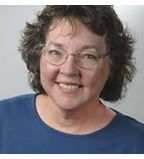
Mary Beth Averill, Ph.D. has been coaching academic writers for over 30 years. She facilitates ongoing groups for ABDs and faculty writers. With Hillary Hutchinson, she is the coauthor of
How to Become an Academic Coach.
Contact Mary Beth at 541.349.9999 or writeonmba@aol.com.
You Will Break Your New Year's Resolution—Unless
You... | Issue 202
As the New Year dawned, did you nobly resolve to dissertate every single day? Did you vow to socialize less, turn off the TV early, or go running every morning before breakfast?
Did you pat yourself on the back for your new commitment to shaping up your dissertation or yourself? Not so fast.
Brace yourself for the bad news: Chances are a whopping 4 in 5 that you will give up by Valentine's Day. At least that's what the research shows, says Marti Hope Gonzales, Ph.D., at the University of Minnesota. Good intentions don't guarantee success.
There's hope, however. You can still set yourself up to be among 20% who succeed—and here's how: Employ proven strategies based on motivation and goal research. That's what the All-but-Dissertation Survival Guide provides year round, with special tips this month for keeping those resolutions.
We invite you to take advantage of our carefully curated tips and apps to create the good habits that will spur you to your doctorate and beyond.
"Habits are like financial capital — forming one today is an investment that will automatically
give out returns for years to come." ~ Shawn Achor

FOCUS ON JUST ONE NEW HABIT AT A TIME
Before you jump into action, take time to plan. In his Psychology Today post, Ray Williams offers these evidence-based guidelines: Focus on just one change at a time. Developing new habits eats up your daily reserve of willpower, so don't spread it too thin. Break it down into small steps.
"For most of us, though, the problem is not a lack of goals but rather too many of them." ~ Roy Baumeister, Ph.D
BOOST YOUR MOTIVATION
Frame the goal in terms of what you will do rather than what you will stop doing, advises procrastination expert Tim Pychyl, Ph.D. Take time to reflect on how this change complements your values and overall goals to enhance your interest. "Do everything you can to keep your personal goals manageable and meaningful and you will see the tasks as less aversive," he explains.
MONITOR YOUR PROGRESS
Find a user-friendly way to monitor your progress on your resolution. It's easy to forget to follow through on a new habit, and unfortunately, that spells disaster, as shown in research by willpower expert Roy Baumeister, Ph.D., and colleagues. You can tack up an old-fashioned wall calendar or pick from the mushrooming Android and iPhone habit tracker apps to keep track of the pages written, the pounds lost, the runs completed, and so on. We describe the number one app below.
"Motivation is what gets you started. Habit is what keeps you going." — Jim Ryun
USE FREE AND FUN HABIT TRACKERS
Top-rated HabitBull sends fun daily reminders to your smart devices so you can keep your promise to yourself. You can track several routines and habits simultaneously, including simple ones ("I turned TV off at 9 pm") and quantitative ones ("How many words did you write on your dissertation today?") . You can easily keep track of your progress as it syncs across devices. Watch your streaks grow-and feel that surge of pride and motivation! Download HabitBull on Google Play, where it sports a 4.5 rating from over 15K users, or in the iTunes store. Discover 23 more habit-changing app options here.
SURROUND YOURSELF WITH INSPIRATION
Your behavior is exceptionally sensitive to environmental triggers, so why not leverage them? "Set up a workspace, a home, and a life that supports your aspirations," recommends Kira M. Newman, Editor at UC Berkeley's Greater Good Science Center. Post a photo that represents the next phase of your life and career, or maybe a panorama of the Caribbean paradise to visit after graduation. Place view books by authors who inspire you. Wear a special piece of jewelry that can serve as an anchor when you're tempted to give in. "Consider tweaking the screensavers, passwords, and desktop photos you encounter every day," she adds.
"If you're tired of starting over, don't give up." ~ Anon.
DON'T GO IT ALONE
Experts agree that social support builds motivation and adds accountability. Involve a buddy or join a support group. For example, you could start or join an academic writing group or team up with another student to meet regularly for a dissertation date. Or consider a coach, as coaches are trained to provide support and accountability. When you involve others, you can share your struggles and celebrate your wins, building an upward spiral of success.
"Fall down seven times, stand up eight." ~ Japanese proverb
Finally, keep in mind that making important lasting changes always involves challenge. You're more likely to succeed if you acknowledge the difficulties and temptations and plan accordingly. Never allow a lapse to become an excuse to give up. Every time you start over you are that much closer to success. You are not starting at zero. Use what you learned to get back on track and plan better for the next challenge. With grit, you'll get there!
Wishing you at least one new awesome habit,
The ABDSG Editorial Team
Four Tested Strategies for Enjoying Guilt-free Holidays While Finishing Your Dissertation | Issue 201
SUMMARY
Does your inner Scrooge threaten to ruin your holiday by keeping your nose to the grindstone? Do visions of unfinished dissertation chapters haunt your dreams and festivities? Discover why having fun can help you do your best on your dissertation and learn three proven strategies for enjoyable, sustainable success.
CONTENTS
1. Editor's Note
2. Words from the Wise
3. Feature Article: Four Tested Strategies for Enjoying Guilt-Free Holidays while Finishing Your Dissertation
EDITOR'S NOTE
December 2015
Dear ABD Survival Guide Reader,
Feeling torn between the Dissertation Imperative and holiday temptations? Stop choosing between academics and life.The good news is that your socializing and celebrating during the Season of Joy can enhance not just your mood but also your dissertation progress. Read our feature article for more. Are you feeling discouraged by "not enough dissertation progress" so far this year? I challenge you to list your wins for 2015.

Keep writing until you come up with at least 20 accomplishments, big and small. Now reflect on each one: What does it mean to you as an academic or a whole person? Focusing on what you have done will energize you far more than beating yourself up again. Besides, chances are you did more than you realized. Wishing you and yours a joyous, energizing holiday!
Gayle
Gayle Scroggs, PhD, PCC
Editor, ABD Survival Guide
A FEW WORDS FROM THE WISE
"Every man who possibly can should force himself to a holiday of a full month in a year, whether he feels like taking it or not." ~ William James
"More men are killed by overwork than the importance of the world justifies." ~ Rudyard Kipling
"The first core truth about positive emotions is that they open our hearts and our minds, making us more receptive and more creative." ~ Barbara Fredrickson
Surround yourself with people who take their work seriously, but not themselves, those who work hard and play hard." ~ Colin Powell
Feature Article: Four Tested Strategies for Enjoying Guilt-Free Holidays while Finishing Your Dissertation
By Gayle Scroggs, Ph.D., P.C.C.
Is your dissertation still unfinished as we move into peak holiday season? Are you wondering if you deserve any time off?
It is not merely okay but truly essential to take a work break and have fun with family, friends, and festivities.
Research confirms what you've no doubt experienced: Doing things that make you happy enhances your focus and zest, while driving yourself relentlessly leads to burnout.
So it is time to savor skiing and skating, go to the movies with friends, put tinsel on the tree, ice a gingerbread house, play silly games, sing carols or karaoke, dance and move--in short, do something that feels great.

Squelch your inner Scrooge that tells you to skip holidays and to toil without ceasing. Boot that inner critic and the grindstone into the nearest snowbank. You need to cultivate daily positivity.
Positive emotions serve as your "tiny engines of flourishing."
Would you like to boost your creativity and productivity? Improve your relationships, your resilience, and even your physical health? Positive emotions—those "wantable" states such as pleasure, amusement, gratitude, inspiration, awe, joy, love, contentment, pride, etc.—can do just that.
Research shows they serve as the "little engines of flourishing," explains renowned expert Barbara Fredrickson, distinguished professor at the University of North Carolina. When you have an abundance of positive emotions compared to negative, you broaden your perspective and build your cognitive, social, and physical resources. Imagine how those benefits could speed you on your dissertation journey.
When feeling stuck or down, taking steps to invoke positive emotions will provoke an energy shift that can send you back to work with renewed vigor and greater clarity. High positivity can also lead you to suffer fewer headaches and other aches and pains. You might even sleep better.
To benefit as much as possible from your merrymaking, incorporate these proven strategies.
1. Honor both your work and fun priorities—but not at the same time.
The key is to be mindful about being truly present when having fun, and being mindful when dissertating. Don't let one activity bleed into the other and spoil it. Give yourself time to learn to shift gears gracefully and effectively, with minimum stalls and sputtering, between your priorities.
Acknowledge any interfering thoughts that pop up, and then remind yourself of all the ways that each dimension of your life supports the others rather than undermining them. Go for Yin/Yang rather than Tug-o'-War.
Has your Inner Nag ever tagged along, uninvited, when you've taken time for fun? ("Why aren't you revising Chapter 2?!") The best way to calm your Inner Nag is write down your dissertation schedule and then stick to it. Then there is your Inner Whiner ("I wanna go play!"), who will pester you relentlessly when you keep your nose to the grindstone too long. Regain your focus by reassuring your Inner Whiner that you've also reserved time for play.
2. Create a realistic plan—and then stick to it.
If you know that you will not really sit down to write at certain times, then don't kid yourself as you fill out your holiday schedule. You'll just beat yourself up afterward and not enjoy the day.
Get the "musts" on your calendar first, e.g., teaching duties and advisor conferences as well as any can't-miss family or other high-priority events whose scheduling is beyond your control. Then look at the empty spaces and reserve modules for dissertation work and socializing or other fun.
Put dissertation work modules with a specified start time on your calendar as this is twice as effective as simply stating which days you will work. Surprisingly, it turns out that stating a start time instead of a completion time works best as it sets up an automatic mental alarm that nudges you to get to work.
Beware the "planning fallacy," i.e., the common tendency to assume best-case scenarios while preparing schedules and budgets.
As Nobel Prize winning economist Daniel Kahneman has demonstrated, humans tend to grossly underestimate time and costs--even for familiar activities. So leave some slack in your calendar for the unexpected.
3. Short circuit rumination by pivoting to positivity.
Holidays and vacation time come loaded with high expectations that set us up for disappointment. The magic of the season may elude you, or your productivity might fall short of your hopes.
You are what you think. Fretting and ruminating turn out to be especially harmful, leading you into downward spirals of negativity. Dwelling on the downside will put your brain in a chemical stew that creates a drag.
Create a list that includes four or five "go-to" activities that you have already discovered to be good at short-circuiting your bad moods. "As you create new habits of thought, you literally rewire your brain," Fredrickson observes.
Opt to rewire your brain by pivoting from negativity by intentionally transitioning into a more positive activity: Go for a walk, sing, play with the dog or kids, go to the movies, whatever lights you up. Negative emotions tend to be short-lived—unless you choose to stoke the drama.
4. Practice savoring the good times before, during and after.
You can triple the benefits of positivity by honing your ability to savor positive experiences.
Savoring is the opposite of anxiety and worry. It refers to intensifying and prolonging good experiences through anticipating future ones, through being present during them, and by reflecting on their pleasant memories.
Savoring leads to new neural connections that make positivity more likely. In Just One Thing, Rick Hanson instructs readers how to focus on the good more effectively to rewire your brain. Here is his recommendation:
"For survival purposes, the brain is good at learning from the bad, but bad at learning from the good. So help it by enriching an experience through making it last 10-20 seconds or longer, fill your body and mind, and become more intense.
Also absorb it by intending and sensing that it is sinking into you as you sink into it. Do this half a dozen times a day, maybe half a minute at a time. It's less than five minutes a day."
This simple practice develops inner calm and resilience that enables you to stay centered during the ups and downs of the holiday season.
Now Go Play!
With thought and care, spiced by social support, you can develop a life-long habit of balancing your work and your personal life that will serve you long after you've become Doctor.
Learning to integrate work and play transforms them from competing activities into mutually reinforcing activities, leading to true flourishing.
Want someone in your corner to help you create more positivity and productivity?
Apply for a positive psychology dissertation coach by clicking here.
Working with a coach can help you finish faster and build habits
for a lifetime of success and well-being.

FOR FURTHER READING
These make great holiday gifts and reading for a happy, peaceful 2016.
Fredrickson, Barbara. Positivity: Top-Notch Research Reveals the Upward Spiral That Will Change Your Life
Hanson, Rick. Just One Thing: Developing a Buddha Brain One Simple Practice at a Time
YOUR OWN COACH
If you are considering whether to get your own coach to help you reach your academic goals, fill out this brief application for a free consultation with a dissertation coach.
How to Write 5000 Words an Hour: Train Your Tortoise Brain | Issue 200
Through observing his own struggles and success, John Cleese—British actor, writer, and comedian (of Monty Python fame)—realized that his creativity acts like a tortoise that won't emerge until the coast is clear. A trained scientist, Cleese found that he first needed to create a "tortoise enclosure."
How can you entice your tortoise brain to venture forth to write your next chapter?
In 5,000 Words Per Hour: Write Faster, Write Smarter, Chris Fox, who penned his latest novel in just thirteen days, describes how to create your own tortoise enclosure:
1. Identify a time and place that your mind will associate with writing. Don't write in the same space you watch Netflix, he warns. Better to trudge to Starbucks, laptop in hand, at 7 a.m. every morning.
2. Erect barriers to prevent temptations. Use apps like Freedom to block distracting websites. Turn off notifications. Ask others to not disturb you while you write. Don't give in--every interruption sends you back to square one on the route to flow.
3. Set time boundaries. Fox starts his first half-hour sprint at 6:20 a.m., breaks for email and such, and then he completes one more sprint. His loved ones know to honor this sacred time, he says.
4. Eat that frog. Get your hardest task out of the way first thing each morning—or it will croak at you all day. (Fox credits Brian Tracy and Mark Twain for this one.)
TAKEAWAY: While your dissertation is not fiction (we hope), this strategy could work for many who struggle and sputter at the keyboard. As psychological conditioning principles would predict, eliminating competing stimuli and rewards for undesirable behavior should create the space for developing a writing habit that will strengthen with practice. [See Fox's book for more tips on writing productively.]
Shrink Any To-Do List in 4 Quick Steps: Use the "Four D's"
Our ABD clients always ask for time hacks. One of best ways to find more time is to pare down your To-Do lists by reviewing each item with "the four D's" in mind.
1. Delete anything not totally necessary.
2. Delegate as much as you can to family, staff, temporary hire, or other.
3. Defer whatever you can until you finish your top priorities. You won't forget them if you list them in "Later Start" or "Someday/Maybe" files.
4. Diminish tasks by cutting back on needed time and energy. For example, after breakfast, take five minutes to throw ingredients in a slow cooker—and then savor a healthy, steaming stew later. Save time, money, and energy, plus avoid settling for fast food. (Tip: Make enough for leftovers.)
Feeling Down? Beware Your Facebook Feed
If you turn to Facebook as a way to recharge yourself, beware. It turns out that our mirror neurons react to virtual emotions. Your FB friends' woeful posts are likely to demoralize you, while their happy news and silly pet videos can cheer you up, according to Lea Waters, Ph.D., director of the University of Melbourne's Centre for Positive Psychology.
In a Facebook study, 700,000 FB users' newsfeeds were altered—positive updates were deleted from some, negative posts from others. The result? People's posts tended to reflect what they were exposed to most. Read more here.
TAKEAWAY: Become aware of how social media affects your mood. Unfriend or limit posts from Negative Nancy's. Take responsibility for the likely effect of your posts. See if you can start an upward spiral. Meanwhile, if you want to jolt yourself from a blue mood, choose from this list:http://my.happify.com/hd/10-ways-to-get-rid-of-your-bad-mood/.
Stop Kidding Yourself for Stalling: "All Reasons Are Excuses"
In The Achievement Habit: Stop Wishing, Start Doing, and Take Command of Your Life , Stanford Design School pillar Bernard Roth gives a swift kick in the pants to dawdlers. In every aspect of your life, Roth recommends adopting design thinking to start exploring possibilities and creating desired outcomes by tweaking successive iterations. Reflecting a definite bias toward action, he offers stark advice to pipe dreamers:
(1) Stop saying that you will try to do something. Assert that you will do it.
(2) Since "all reasons are excuses," stop using them—become a doer instead.
I define "achievement" as having a good life, feeling good about yourself and feeling in command of your life and your circumstances. So, if you want me to tell you who's in the way, it's you. ~ Bernard Roth, Ph.D.
TAKEAWAYS: Apply Rothian principles to your dissertation to get unstuck and get moving again. In short, no one cares how hard you are trying or how many excuses you can cough up for not progressing. Develop a growth mindset: Learning from successive attempts trumps waiting until you get it perfect. Enjoy more of this beloved professor's wisdom in his book.
Vitae: Not Just Another Academic Job Site
Don't miss Vitae—the free career management hub for PhD students, faculty, and administrators newly launched by The Chronicle of Higher Education. While you can upload your CV or resume, and search and apply for open jobs, the site offers much more: Join a discussion group, share syllabi with faculty members at other institutions, showcase your work and achievements, create an academic social network, follow people whose work interests you or with whom you might like to collaborate, use the dossier service, and receive digest news updates on topics in higher education that interest you.
No CHE account needed to register for Vitae—and it is free. Just sign up and create your profile. You can then customize Vitae services to meet your needs. Check it out at https://chroniclevitae.com/.
Jingle into the Holidays with Smart Phone Apps
Did you forget the wine? The ugly Christmas sweater at the cleaners? The tie for Uncle Jim? With a smart phone app, you will always have your list when you need it—a great way to eliminate extra trips. Manage all your lists for groceries, holiday lists, and errands with apps like Wunderlist,Todoist, and OutofMilk. Save even more time by using apps from major retailers and specialty shops to order gifts for home delivery. Preordering for store pick up also shaves minutes off your wait.
What will you do with all that extra time during the holidays? Feel free to lean back and relax with a glass of pinot with those near and dear, enjoying the flickering Virtual Fireplace app.
CONGRATULATIONS!
You just read the 200th issue of the ABD Survival Guide.
Celebrate this milestone with us for a chance to win a free ABD coaching session with an expert ABD coach.
To enter: Email your name, email address, and a brief comment telling us what you like most about the ABD Survival Guide by December 15. Send your entry to gayle@mcpcoach.com.
Five lucky winners will be drawn at random and notified by email.
SUBSCRIPTION INFORMATION
If you have received this copy from a friend or colleague, you can subscribe atwww.abdsurvivalguide.com. To unsubscribe, please click the link at the bottom of this page.
GAYLE SCROGGS, Ph.D., P.C.C., Editor, ABDSG.
An accomplished coach, workshop leader, keynote speaker, and educator, Gayle earned her doctorate in social psychology from the University of New Hampshire. Her deep expertise in positive psychology allows her to help clients build their personal strengths, positive habits, and confidence to overcome procrastination, self-doubts and other blocks in order to reach vital academic and personal goals. In addition to editing the ABD Survival Guide, she contributed two chapters to the positive psychology anthology, Women's Paths to Happiness. Contact her atgayle@essencecoaching.com for coaching, presentations, and workshops on thriving in graduate school and beyond, and find free resources at www.essencecoaching.com. She also speaks fluent Spanish and delights in new exotic Scrabble words as she savors life in the Chesapeake Bay area, California, and Argentina.
BEN DEAN, Publisher, ABDSG
Ben holds a Ph.D. in psychology from the University of Texas at Austin. He began writing the ABDSG in 1997. Over the years, the ABDSG has published hundreds of articles and provided thousands of hours of pro bono coaching and teleworkshops to ABDs all over the world. Ben is also the founder of MentorCoach (www.MentorCoach.com), a virtual university focused on training accomplished professionals to become part-time or full-time coaches. You may wish to subscribe to the Coaching Toward Happiness eNewsletter! It's on applying the science of Positive Psychology to your work and life (131,000 readers). Ben lives in suburban Maryland with his wife, Janice, their two children, and Dusty, their Norwegian dwarf bunny.
Subscribe to our other free e-mail Newsletter: The Coaching Toward Happiness News
11 Job Search Tips I Wish I’d Known as a New Doctoral Student | Issue 199
CONTENTS
1. Editor's Note: The Real Truth about Successful Doctoral
Job Searches
2. Words from the Wise: Finding Your Career
3. Feature Article: 11 Job Search Tips I Wish I'd Known as a
New Doctoral Student
EDITOR'S NOTE: The Real Truth About Successful Doctoral Job Searches
Feeling jittery about your career chances after you finish your doctorate? If you hope for something better than permanent adjunct status or a barista job at Starbucks, the secret is to take steps now, while you are still a student. We've got some great tips for you in this issue.
Academic positions—the gold standard for employment for Ph.D.'s—are losing their luster, and the lure of alternate employment is on the rise . The truth is that most PhDs have not and will not become tenure-track professors. Based on National Science Foundation 2011 data, only 19.4 percent of you will land an academic job—not much different from the 23.2 percent a decade earlier, observes Jordan Weissman in The Atlantic. So where will the other 80.6 percent of doctorates end up?
Sadly, most graduate students remain woefully clueless about how to search outside academia for satisfying careers in business, government, or organizations, including "alt-ac" sectors.
Many will head outside academia, but beyond the recommendation to "network more," ABDs get scant advice as students about best practices for finding non-academic jobs. Many commit basic mistakes that hold them back, notes Isaiah Hankel, Ph.D. To get hired, he urges you to network outside of Ph.D.-only events and emphasize your skills--not your "Doctor" title. Proactively follow up with contacts and ask probing questions in interviews, he advises, instead of taking a passive role.
More career tips from someone who has been there. Regardless of your specific career goal, you can benefit from starting to implement the simple strategies offered below in our feature article. Author James Van Wyck should know—he is not only a doctoral candidate but also a senior higher education administration fellow at Fordham University with rich connections. We thank him for generously sharing his hard-won advice.
As Wayne Gretzky put it, "You miss 100% of the shots you don't take." What are you waiting for?
Gayle
Gayle Scroggs, PhD, PCC
Editor, ABD Survival Guide
WORDS FROM THE WISE: Finding Your Career
"Find out what you like doing best and get someone to pay you for doing it." - Katherine Whitehorn
"When one door closes, another opens; but we often look so long and so regretfully upon the closed door that we do not see the one which has opened for us." - Alexander Graham Bell
"Choose a job you love, and you will never have to work a day in your life." - Confucius
"Fall seven times, stand up eight." - Japanese proverb
"I'm a great believer in luck, and I find the harder I work, the more I have of it." - Thomas Jefferson
FEATURE ARTICLE: 11 Job Search Tips I Wish I'd Known as a New Doctoral Student
By James M. Van Wyck
Reprinted with author permission from Inside Higher Ed
Three years ago I proudly waved my flip phone around and told anyone who cared (and many who didn't) that I hadn't a clue about social media, nor did I care to know about it, thank you very much. I liked reading my books, writing my papers and teaching my students.
Now, as a Ph.D. candidate currently working to help professionalize graduate students, I have a Twitter account, several suits and an iPhone. I've also undergone an attitudinal shift: I think differently about what a graduate student should know and do. Looking back on the flip phone version of myself, I'm struck by the disconnect between who I am now and who I was only a few years ago.
What follows are some simple tips I'd have given myself if I could have tapped myself on the shoulder at graduate orientation.
1. Twitter matters, and you shouldn't wait till you are a fifth-year Ph.D. to realize this. You'll find a network of academic and non-academics ready and waiting for you. So sign up and spend 10 minutes each morning and 10 minutes each evening learning the ropes and building a following.
2. Networking matters. Academics often don't like this word, but as @elswafford likes to say, "Networking -- it's just talking." Learn what an informational interview is and conduct at least two a semester. Learn to talk about your work in a positive, upbeat manner. Share your enthusiasm for your own work and that of others. Network with professors at colleges without graduate programs, or at institutions that have special collections and libraries with holdings in your subject matter, but no graduate students to claim the attention of archivists, librarians and other administrators. In other words, be strategic about your networking and set yourself up for success stories early in your graduate career. These smaller victories will set up larger successes down the road.
3. Peers matter. Network with your peers first. They typically make much better partners for much of the necessary work you'll do as a graduate student. Identify successful graduate students one to two years ahead of you and mimic their academic and social practices. Plus, as your peers progress, they'll become more and more valuable as contacts and resources. Forge lasting partnerships by caring about the work others are doing and helping them when you can.
4. Skills matter. If you're a Ph.D. candidate in the humanities, like I am, you'll have noticed that not everyone is securing academic employment. (Sarcasm alert.) In fact, most Ph.D.'s don't end up with tenure-track positions. To prepare for compatible careers, you'll need to diversify your skills: if you need to take on part-time work while in graduate school, look for jobs that add skills to your portfolio rather than jobs that reinforce skills you already have.
5. Planning matters. Find an online calendar you can live with (I prefer Google Calendar) and make full use of it. When you see fellowship announcements or grant applications that you aren't yet qualified for, put down a reminder 10 months in the future. When the reminder pops up, you'll have two months to slowly produce a successful application or submission. Plan to acquire the necessary qualifications in the interim by identifying specific action steps and adding those plans to your calendar as well.
6. Collaboration matters, and it takes practice, so start early. Find a fellow graduate student (either within or without your own department) and cultivate a working relationship that has clear goals and outcomes (e.g., produce a pedagogical article, co-host an event, start a reading group, start a nonprofit).
7. Undergraduates matter, and not only because they'll review you at the end of the semester. They can give you valuable advice. For example, I often ask my classes for suggestions on subjects like technology, web development and what the next big thing in pop culture will be. I've found that even younger graduate students don't have their ears to the ground like undergraduates do. So ask questions of your students, especially about technology.
8. Administrators matter. At every step of your program, you should learn as much as you can about the people who work at your institution, from departmental administrators to the provost. Learn their names, find out what they do and always behave professionally online and offline when discussing your department, school and institution.
9. Institutions matter. While you'll need to manage your time wisely, don't ignore what is happening at your institution. Make sure you don't miss out on opportunities to network with visiting scholars because an event targets undergraduates. Also, use your contacts from every stage of your academic career, especially if you attended different types of institutions (public, private, religiously affiliated, etc.).
10. Engagement matters. Become adept at reaching out to volunteer agencies within and without your university. Find a service learning project on your campus and commit time and energy to a project that is outside the sphere of your dissertation's focus. Stretch your comfort zone in the classroom and beyond.
11. Options matter. You need to know that your best career path might not be a tenure-track job. You might learn to loathe the academy, or you might fall victim to its cruel calculus. Don't buy the myth that nonacademic careers are any less worthy than academic careers. You need, need, need to have multiple plans. Identify a few careers that align with your skill sets and cultivate opportunities and contacts that would help secure these jobs. Having multiple options will help you stave off fear and depression, two conditions that can stifle graduate students.
In some ways, I miss the flip phone days. And to be honest, I really only upgraded to an iPhone when my son came along: when it came to capturing cuteness, my old Nokia didn't cut it. The point isn't that you need to upgrade your gadgets, but that you need to approach graduate education as professional training. In fact, it's better to regard yourself as a professional rather than a student. The sooner you begin acting like one, the better. That's my two cents: please let me know in comments what you would tell yourself if you could travel back to your graduate student orientation session.
ABOUT THE AUTHOR
James M. Van Wyck is a senior teaching fellow in the honors program at Fordham University, Lincoln Center. He is also the inaugural GSAS senior higher education administration fellow at Fordham University, Rose Hill. He is a Ph.D. student writing a dissertation on 19th-century evangelical fiction.
FIND YOUR OWN COACH
If you are considering whether to get your own coach to help you reach your academic goals, fill out this brief application for a free consultation with a dissertation coach.
GAYLE SCROGGS, Ph.D., P.C.C., Editor, ABDSG.: An accomplished coach, workshop leader, keynote speaker, and educator, Gayle earned her doctorate in social psychology from the University of New Hampshire. Her deep expertise in positive psychology allows her to help clients build their personal strengths, positive habits, and confidence to overcome procrastination, self-doubts and other blocks in order to reach vital academic and personal goals. In addition to editing the ABD Survival Guide, she contributed two chapters to the positive psychology anthology, Women's Paths to Happiness. Contact her at gayle@essencecoaching.com for coaching, presentations, and workshops on thriving in graduate school and beyond, and find free resources at www.essencecoaching.com. She also speaks fluent Spanish and delights in new exotic Scrabble words as she savors life in the Chesapeake Bay area, California, and Argentina.
BEN DEAN, Publisher, ABDSG: Ben holds a Ph.D. in psychology from the University of Texas at Austin. He began writing the ABDSG in 1997. Over the years, the ABDSG has published hundreds of articles and provided thousands of hours of pro bono coaching and teleworkshops to ABDs all over the world. Ben is also the founder of MentorCoach (www.MentorCoach.com), a virtual university focused on training accomplished professionals to become part-time or full-time coaches. You may wish to subscribe to the Coaching Toward Happiness eNewsletter! It's on applying the science of Positive Psychology to your work and life (131,000 readers). Ben lives in suburban Maryland with his wife, Janice, their two children, and Dusty, their Norwegian dwarf bunny.
SUBSCRIBE TO OUR OTHER NEWSLETTER
Subscribe to our other free e-mail Newsletter: The Coaching Toward Happiness Newsletter
